1 Volumes
Favorites - II
More favorites. Under construction.
The Virginian: A Philadelphian Goes West
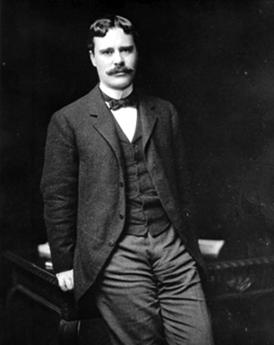
|
| Owen Wister |
Where is the Philadelphia gentleman? According to Owen Wister, that wealthy Philadelphia novelist of the late 19th century, a true gentleman is found on the frontier. He rides horses, brands cattle. He is a cowboy. Wister is credited with creating this great American archetype, now so familiar from hundreds of movies, in his novel, The Virginian: A Horseman of the Plains. Published in 1902, the novel documents the experience of a sensitive young Philadelphian traveling through the still unformed West, where he meets the American nobleman. Wister originally intended this book to be the first of a series of four charactrizations of the types of Americans. A second, about Baltimore, was published, but after that, the fame of his brilliant first novel swept his career in other directions. He seems to have originally intended to describe Virginians more than cowboys, but it's hard to know where his original intention would have carried him.
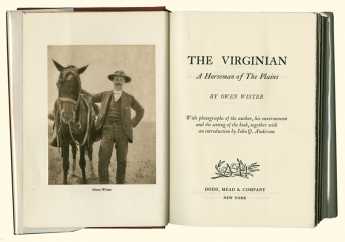
|
| The Virginian: A Horseman of the Plains |
Here is nevertheless a true classic. Using charmingly archaic language, Wister paints a landscape of sky and wild forests. His narrator speaks to the reader with the kind of verbal affection that only flourished in 19th-century literature. With an air of respect and modesty, the narrator introduces the reader to the novel's hero, the "Virginian." A transplant from the American south, this young man is a true Cowboy, a "daydream of glory made flesh" as Wallace Stegner once wrote. Early in the book, he stamps the hero with the line that made it all famous: "When you call me that, smile."
A host of colorful characters swirl around the Virginian as he aspires to social credibility and respect in the West. Western society, as understood through the Virginian's challenges and successes, is run by its own rules and social norms, norms that are heavily based on a largely male code of honor and decency. We learn about the code of the West as our Virginian learns it.
But the West is not only a myth of the American man; Molly Wood, another Easterner adrift in the wilderness, serves as a passionate, complicated love interest for the Virginian. Their relationship serves to contrast the social regulations of the East with the wilderness and abandon of the West. Wister's search for an American gentleman reminds us what it means to go West in search of something pure and new. What he found in the West has resonated throughout American culture for generations.
REFERENCES
| Philadelphia Gentlemen: The Making of a National Upper Class: E. Digby Baltzell ISBN-13: 978-0887387890 | Amazon |
How to Live Off an Investment Portfolio
Many studies have been done. The rule is this ...
If you have a well-diversified investment portfolio, and
- You want to live off the proceeds
- ... for a long time (20+ years)
You must withdraw no more than 4% per year.
- If your expenses are greater than 4% of your portfolio
- Reduce your expenses
and/or - Find outside sources of income
- Reduce your expenses
- If your investment portfolio is not well diversified it
will not last as long
(in other words, don't try to beat the market) - If your investment portfolio has high fees it will not last as long
| Sample Diversified Portfolio | |
| Asset Class | Symbol |
|---|---|
| US Total Market | VTI |
| Europe Developed | VGK |
| Asia Developed | VPL |
| Emerging Markets | VWO |
| US REITs | VNQ |
| Commodities | DJP |
| US Gov't Long | TLT |
| TIPS | TIP |
Plus a money market for cash
Rosencrantz and Gildenstern (4)
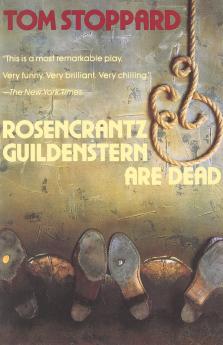
|
| Rosencrantz and Guildenstern are Dead |
A few Broadway seasons ago, Tom Stoppard's play and movie Rosencrantz and Guildenstern have Dead described an experience, resonating with the early years of the Reagan presidential administration. If you are a small witness to palace politics, you mostly have no clue about what is actually happening. At that time, it was widely accepted among Washington gossips that the appointees who filled the Executive Office Building belonged to three hostile tribes in temporary alliance, and the Libertarian tribe was cast out. According to this recounting, the other two tribes were the Religious Right and the Win-at-any-cost California political professionals. A more mature view of it might be that all administrations of all parties contain hard-noses who make a profession of the ruthless winning of elections. An ideological president can't win without hard-ball lieutenants, so although their presence is inevitable, what matters is how well they are controlled.
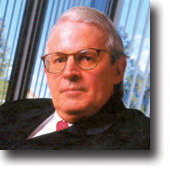
|
| David Stockman |
Ignoring these unattractive fixtures of political machinery, David Stockman seemed to symbolize a libertarian economic ideology within the Reagan White House, and Caspar Weinberger a militaristic one. When Stockman was sacrificed to power realities in Congress, the Libertarians followed the lead of William Niskanen and bitterly retreated to the neighborhood think tanks. But a few years later, Weinberger was similarly sacrificed over the Star Wars and Iran-Contra matters. These functionaries working at EOB thought they ran the country, but that most affable of men, Ronald Reagan, ran things. He seriously meant to discredit New Deal economics and to win the Cold War. To do so, he willingly sacrificed small improvements in our economic system like the Medical Savings Account, and minor enhancements of military hardware like the Strategic Defense Initiative. He would like to see these things succeed, but they would have to do it on their own, without cost to his political capital.
And so, in time, John McClaughry went back to Vermont, founded a think tank called the Ethan Allen Institute, ran unsuccessfully for governor against Howard Dean, and became Majority Leader in the Vermont Senate. Meanwhile, I devoted my efforts to selling the Medical Savings Account concept to that most reserved of audiences, the American Medical Association.
Robert Barclay Justifies Quaker Meetings
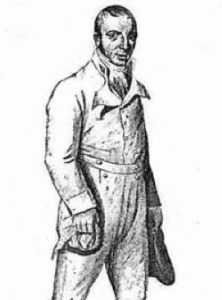
|
| Robert Barclay |
As part of the dissidence and Civil War of 17th Century England, Robert Barclay the Scotsman emerged with a point of view which was structured and reasoned in detail. What was almost unique was his reduction of it to a handful of pithy "Sound Bites". Coupled with membership in a prominent family, these abilities made him a particular friend of James, Duke of York, later King. Barclay became a Quaker at an early age.
The whole point of the Reformation was revulsion against the corrupt Catholic clergy, shielded behind some impossibly convoluted legalisms of doctrine. But for the governing establishment, any reform was going too far if it led to anarchy and chaos; combating disorder was then in many ways the central mission of the Catholic faith. The establishment did recognize that public revolt against universal micromanagement led to the scaffold for Kings who insisted on it. But in their view, the need for law and order still demanded some legitimacy, if not organized law. The Rangers, who paraded about stark naked and lived in ways resembling the hippies of the 1960s, were beyond the pale. Quakers, who professed no formal doctrine except silent meditation, might be possible just as threatening. After all, silent meditation could lead you anywhere including regicide. But the Quakers at least were quiet about it.
George Fox the founder of Quakerism had already provided one basis for containing fears of anarchy, by organizing local monthly meetings for worship within regional quarterly meetings; quarterly meetings, in turn, were within an overall framework of a yearly meeting. Occasional monthly meetings might develop a consensus for wild and antisocial behavior, indeed often did so, but would have to persuade the quarterly meetings whose members naturally outnumbered them. In extreme cases, the whole religion assembled in a yearly meeting. The innate conservatism of the meek would usually silence the extremism of the rebellious few. Very few kings would deny they could go no further toward despotism themselves, without the public behind them. The Quaker problem was to demonstrate what their consensus really was.
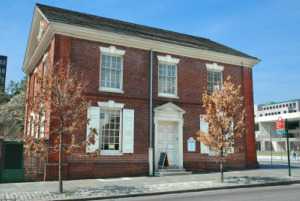
|
| Free Quaker Meeting House |
Essentially, the answer emerged that any religion which renounced a priesthood, which even renounced having a written doctrine, still needed some sort of institutional memory. If every Quaker began with a clean slate, to develop his own organized set of moral principles, then most of them would never get very far. Even if they did, they would have no time left for milking cows and weaving cloth. Single silent meditation was inefficient, particularly if you had faith that everyone was eventually going to arrive at the same convictions as the Sermon on the Mount. The founders of Quakerism took a chance, here. To assume the same outcome, you have to assume everyone starts with the same instincts and talents; even 21st Century America has private doubts about that one. Feudal England would have rejected it contemptuously. Carried to an extreme, it was a claim that everyone was as good a philosopher as Jesus of Nazareth, as good a person, as much a Son of God. That seemed like an arrogant claim. A more humble claim was that collectively, listening respectfully to one another in a gathered meeting, the whole world would over time reach the same truths as the Creator. If not, that still was as about as close as you were going to get to an oral memory, slowly building on the insights of the past.
Like all the early Quakers, Robert Barclay spent some time in jail. He did visit America in 1681, but it is doubtful if he spent any time here while he was Governor of East Jersey, from 1682 to 1688. The King insisted on his appointment, because he seemed the most reasonable man among the most reasonable sect of dissenters, and therefore the rebel he chose to deal with.
Rise and Fall of Books
| ||
| The Library Company of Philadelphia |
John C. Van Horne, the current director of the Library Company of Philadelphia recently told the Right Angle Club of the history of his institution. It was an interesting description of an important evolution from Ben Franklin's original idea to what it is today: a non-circulating research library, with a focus on 18th and 19th Century books, particularly those dealing with the founding of the nation, and, African American studies. Some of Mr. Van Horne's most interesting remarks were incidental to a rather offhand analysis of the rise and decline of books. One suspects he has been thinking about this topic so long it creeps into almost anything else he says.
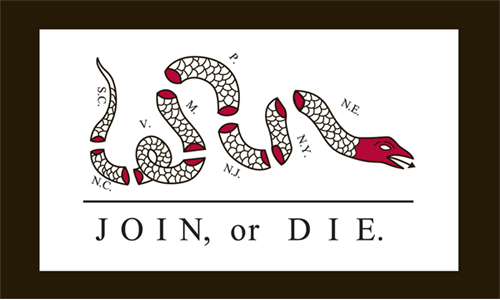 |
| Join or Die snake |
Franklin devised the idea of having fifty of his friends subscribe a pool of money to purchase, originally, 375 books which they shared. The members were mainly artisans and the books were heavily concentrated in practical matters of use in their trades. In time, annual contributions were solicited for new acquisitions, and the public was invited to share the library. At present, a membership costs $200, and annual dues are $50. Somewhere along the line, someone took the famous cartoon of the snake cut into 13 pieces, and applied its motto to membership solicitations: "Join or die." For sixteen years, the Library Company was the Library of Congress, but it was also a museum of odd artifacts donated by the townsfolk, as well as the workplace where Franklin conducted his famous experiments on electricity. Moving between the second floor of Carpenters Hall to its own building on 5th Street, it next made an unfortunate move to South Broad Street after James and Phoebe Rush donated the Ridgeway Library. That building was particularly handsome, but bad guesses as to the future demographics of South Philadelphia left it stranded until modified operations finally moved to the present location on Locust Street west of 13th. More recently, it also acquired the old Cassatt mansion next door, using it to house visiting scholars in residence, and sharing some activities with the Historical Society of Pennsylvania on its eastern side.
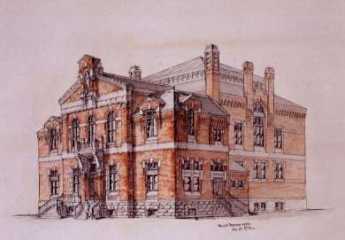 |
| Old Pictures of the Library Company of Philadelphia |
The notion of the Library Company as the oldest library in the country tends to generate reflections about the rise of libraries, of books, and publications in general. Prior to 1800, only a scattering of pamphlets and books were printed in America or in the world for that matter, compared with the huge flowering of books, libraries, and authorship which were to characterize the 19th Century. Education and literacy spread, encouraged by the Industrial Revolution applying its transformative power to the industry of publishing. All of this lasted about a hundred fifty years, and we now can see publishing in severe decline with an uncertain future. It's true that millions of books are still printed, and hundreds of thousands of authors are making some sort of living. But profitability is sharply declining, and competitive media are flourishing. Books will persist for quite a while, but it is obvious that unknowable upheavals are going to come. The future role of libraries is particularly questionable.
Rather than speculate about the internet and electronic media, it may be helpful to regard industries as having a normal life span which cannot be indefinitely extended by rescue efforts. No purpose would be served by hastening the decline of publishing, but things may work out better if we ask ourselves how we should best predict and accommodate its impending creative transformation.
www.Philadelphia-Reflections.com/blog/1470.htm
Revolt of the Admirals: The Fight for Naval Aviation, 1945-1950
The National Security Act of 1947, intended to unify the separate armed forces services under a single Defense Secretary, failed to settle the deeper issue that divided them: the debate over roles and missions. One symptom of this conflict was a showdown between the Air Force and the Navy over the role of carrier aviation in the national security framework of the United States. From the early days of aviation, Army and Navy aviators had approached their roles very differently. Army air doctrine centered on strategic bombing, while Navy doctrine focused on carrier air power as an increasingly important element of the fleet's offensive striking power. In the postwar era of demobilization, these differences were exacerbated as each service fought for its share of a decreasing defense budget. Louis A. Johnson's appointment as Secretary of Defense in late March 1949 added to the Air Force-Navy friction. While Johnson allowed procurement of B-36s for the Air Force strategic bombing program to be greatly accelerated, he canceled development of the first flush-deck supercarrier, which would have enabled the Navy to operate long-range attack aircraft capable of carrying atomic weapons. This rejection fueled the Navy's fear that naval aviation was to have a diminishing role in the new atomic age and provided the final impetus for a clash between the Air Force and the Navy. The conflict came to a head when an anonymous document was delivered to members of Congress in May 1949, alleging improprieties in the Air Force procurement of the B-36 bomber. Although later found the be baseless, these charges inspired two sets of congressional hearings: the first on the B-36 bomber program itself, and the second on the issue on unification a strategy. During the latter hearings, high-ranking naval officers voiced their opinion that naval aviation was being denigrated by a Defense Secretary enamored with possibilities of strategic bombing and scornful of the Navy's contribution to such a mission. The press soon termed their vehement testimony in support of naval aviation the "revolt of the admirals."
About the Author
Jeffery G. Barlow has worked as a historian with the Contemporary History Branch of the Naval Historical center since 1987. He is writing an official two-volume history on the U.S. Navy and national security affairs. During 1969-1970, while on active duty with the U.S. Army, he served as a staff member of the newly established U.S. Army Military History Research Collection at Carlisle Barracks, Pennsylvania. A Navy junior, Dr, Barlow graduated with a B.A. in history from Westminster College (Pa.) in 1972. At the University of South Carolina, where he was an H.B. Earhart Fellow, he studied under Dr. Richard L. Walker and received a doctorate degree in international studies in 1981. Dr. Barlow's contributions to published works include a biographical chapter on Admiral Richard L. Conolly in Stephen Howarth's Men of War: Great Naval Leaders of World War Two (New York: St. Martin's Press, 1993) and chapters on Allied and Axis naval strategies during the Second World War in Colin S. Gray and Roger W. Barnett's Seapower and Strategy (Annapolis: Naval Institute Press, 1989). His work has also appeared in International Security and Air University Review.
Purchase a copy here
Restoring the Gold Standard by Levering Judges' Salaries

|
| Gold Inflation |
Generally speaking, creditors hate inflation and favor a gold standard because they fear debtors -- who outnumber them at the polls -- will dishonor their debts by inflating the currency. And debtors generally are rather serene about the risk of inflation, for the same reason in reverse. Since governments are almost invariably debtors, the combination of government and debtors on the side of promoting inflation represents a dishearteningly strong force for creditors to combat. It is plain for everyone to see that inflation has been steadily moving ahead. But it is something for everyone to ponder that leaving creditors with only one recourse is almost certain to translate that particular recourse into action. Creditors will raise interest rates in anticipation of inflation, and the economy will suffer for debtors as well as everyone else.
So, hard-money advocates like the Paul family of Texas have been rather nonplussed to discover that Federal Judges have handed them in 2010 a very effective weapon they had long overlooked. It should be no surprise that it came from that direction; judges are long accustomed to looking backward to the historical origins of the laws they are charged with interpreting. In this case, the defining statement is found in the Declaration of Independence.
Parenthetically, conservatives are reluctant to include the Declaration in an explanation of the Constitution, since it is plainly true the Constitution was written to correct the weaknesses of the Articles of Confederation, which was much more closely defined by the circumstances of the Declaration. The almost immediate response to any such logical jump over the Constitution, particularly those of Abraham Lincoln, is to thump the maxim that The Declaration of Independence is not Law. And it isn't; it's just in this case it makes a concise statement of a major reason we were offended by the King of England:
"He has made judges dependent on his will alone, for the tenure of their offices, and the amount and payment of their salaries."
Note the operative phrase dependent on his will alone , which takes us back to the Magna Carta, where even the King must obey the Law. If judges are the umpires, it isn't in accord with deeply felt British culture that the King could force the umpires to favor his wishes in their official decisions, by threatening punishment on their persons. No, thousand times no. Anyone can see that.
Furthermore, the determination of underlying intent is so difficult to prove, and so easy to deny, that it is scarcely mentioned in the debate. If two motives seem possible, the other party will assert the high-sounding one and deny the ulterior one. The offended party will instinctively suspect the reverse and will brush aside any protestations to the contrary. Since that is bound to happen, please skip the preliminaries and get on with the evidence. So it is in this case; any reduction in the judge's salary is treated as an attempt to influence official decisions. The Administration maintains a reduction of Federal judge salaries is necessary for budgetary reasons. Please don't insult my intelligence that way. You aren't allowed to reduce the salaries of judges for any reason.
From this rather easy position to take, it is only a short step to say that refusing to raise judge salaries during inflation is a reduction of salary in real terms, after adjusting for inflation. Your paper money is phony; I want to preserve my purchasing power. Your refusal to adjust for inflation is even more clearly a salary reduction since the link to gold was severed during the Nixon and Johnson administrations. We are not on anything remotely resembling a gold standard; we are on a monetary standard which is by law adjusted to inflation, and just about nothing else. Hubert Humphrey may have thought he was creating a loophole by mandating concern with unemployment, but just try to convince the judges of the Supreme Court of that one.
And so, it seems predictable that Judge Beer of the Eastern District of Louisiana, and his fellow judges, will achieve an effective gold standard for Federal Judges if they have the fortitude to tough it out. After that, it gets harder, Congressman Paul. You have to push the concept that what is fair for Federal Judges is fair for everyone else. You should assume that judges will vote in their own favor, and therefore reasonably assume that the public will vote in its own favor, too. If that be treason, said Patrick Henry, make the most of it.
Reservoir on Reservoir Drive

William Penn planned to put his mansion on top of Faire Mount, where the Art Museum now stands. By 1880, long after Penn decided to build Pennsbury Mansion elsewhere, city growth outran the capacity of the new reservoir system which had then been placed on Fairmount. An additional set of storage reservoirs were placed on another hill across East River (Kelly) Drive, behind Robert Morris' showplace mansion now called Lemon Hill (Morris merely called it The Hill); the area was eventually named the East Park Reservoir. In time, trees grew up along the ridge and houses got built; the existence of these reservoirs right in the city was easily forgotten, even though the towers of center city are now plainly visible from them. These particular reservoirs were never used for water purification; that's done in four other locations around town, and the purified water is piped underground to Lemon Hill, for last-minute storage; gravity pushes it through the city pipes as needed.

Now, here's the first surprise. Water use in Philadelphia has markedly declined in the past century. That's because the major water use was by heavy industry, not individual residences, so one outward sign of the switch from a 19th Century industrial economy to a service economy is -- empty old reservoirs. Only one-quarter of the reservoir capacity is in active use, protected by a rubber covering and fed by underground pipes. The rest of the sections of the reservoir are filled by rain and snow, but gradually silting up from the bottom, marshy at the edges. Unplanted trees have grown up in a jungle of second-growth, attracting vast numbers of migratory birds traveling down the Atlantic flyway. Although there are only a hundred acres of water surface here, the dense vegetation closes in around the visitor, giving the impression of limitless wilderness, except for the center city towers peeping through gaps in the forest. It's fenced in and quiet except for the birds. For a few lucky visitors, it's easy to get a feeling for how it must have looked to William Penn, three hundred or more years ago, and Robert Morris, two hundred years ago. In another sense, it demarcates the peak of Philadelphia's industrial age, from 1880 to 1940, because that kind of industrialization uses a lot of water.
The place, in May, is alive with Baltimore Orioles. Or at least their songs fill the air and experienced bird watchers know they are there. Even a beginner can recognize the red-winged blackbirds, flickers, robins, and wrens (they like to nest in lamp posts). The hawks nesting on the windowsills of Logan Circle suddenly makes a lot more sense, because that isn't very far away. In January, flocks of ducks and geese swoop in on the water surface, which by spillways is kept eight feet deep for their favorite food. Just how the fish got there is unclear, perhaps birds of some sort carried them in. The neighborhoods nearby are teeming with little boys who would love to catch those fish, but it's fenced and guarded much more vigorously since 9-11. In fact, you have to sign a formal document in order to be admitted; it says "Witnesseth" in big letters. Lawyers are well known for being timid souls, imagining hobgoblins behind every tree. However, there are some little reminders that evil isn't too far away. Just about once a week, someone shoots a gun into the air in the nearby city. It goes up and then comes down at random, with approximately the same downward velocity when it lands as when it left the muzzle upward. That is, it puts a hole in the rubber canopy over the active reservoir, which then has to be repaired. No doubt, if it hit your head it would leave the same hole. So, sign the document, and bring an umbrella if the odds worry you.

A treasure like this just isn't going to remain as it is, where it is. It's hard to know whether to be most fearful of bootleggers, apartment builders or city councilmen, but somebody is going to do something destructive to our unique treasure, possibly discovering oil shale beneath it for example, unless imaginative civil society takes charge. At present, the great white hope rests with a consortium of Outward Bound and Audubon Pennsylvania, who have an ingenious plan to put up education and administrative center right at the fence, where the city meets the wilderness. That should restrict public entrance to the nature preserve, but allow full views of its interior. Who knows, perhaps urban migration will bring about a rehabilitation of what was once a very elegant residential neighborhood. And push away some of those reckless shooters who now delight in potting at the overhead birds.

This whole topic of waterworks and reservoirs brings up what seems like a Wall Street mystery. Few people seem to grasp the idea, but Philadelphia is the very center of a very large industry of waterworks companies. The tale is told that the yellow fever epidemics around 1800 were the instigation for the first and finest municipal waterworks in the world. There's a very fine exhibit of this remarkable history in the old waterworks beside the Art Museum. But that's a municipal water service; why do we have private equity firms, water conglomerates, hedge funds for water industries, and other concentrations of distinctly private enterprise in the water? One hypothesis offered by a private equity partner was that the success of the municipal water works of Philadelphia stimulated many surrounding suburbs to do the same thing; it was surely better than digging your own well. This concentration of small and fairly inefficient waterworks around the suburban ring of this city might well have created an opportunity for conglomerates to amalgamate them at lower consumer cost. Anyway, it seems to be true that if you want to visit the headquarters of the largest waterworks company in the world, you go about seven miles from city hall and look around a nearby shopping center. If you are looking for the world's acknowledged expert in rivers, you go to the Academy of Natural Sciences of Philadelphia on Logan Square and look around for a lady who is 104 years old. And if you have a light you are trying to hide under a barrel, come to Philadelphia.
Report Identity Theft to the Secret Service
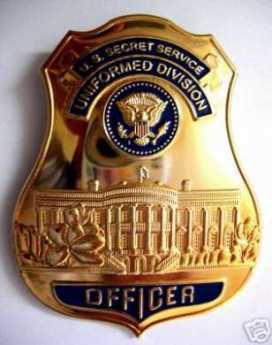
The Internet provides new blessings, but new problems as well. Identity theft has now ballooned from a rarity to a fairly serious issue. After initial turf confusion, the issue has been assigned to the U.S. Secret Service. If it happens to you, that's where you make your anguished call. (1-877-ID-THEFT) or www.consumer.gov/idtheft
There's a certain logic to regarding identity theft as a modern form of counterfeiting, which has been with us since the days of William Penn. Shirley Vaias, representing the Philadelphia regional Secret Service, recently addressed The Right Angle Club of Philadelphia on the topic. It makes sense to learn the Service is headquartered on Independence Mall, across from the Mint. The crude forms of printing in the 18th Century made counterfeiting easy, and ever since the early days, there's been a race between improvements in technology and improvement in counterfeiting. We now have a paper with little red fibers in it, watermarks, serial numbers, color-shifting inks, microprinting of secret messages in the portraits, special magnetic strips, and probably lots of other clever things we aren't told about. The Bureau of Printing and Engraving is changing the currency, one bill at a time, and recently there was a new ten-dollar bill. A counterfeit version was in circulation within six hours.
ATM machines are equipped with counterfeit-recognition devices, and special gadgets are provided for banks and retail stores, but one detection device traditionally catches most fake bills. After handling huge amounts of currency, bank tellers catch a counterfeit just by the feel of the paper. Color photocopiers are getting better and cheaper, but of course, they can't change the serial numbers, so they aren't as smart as they seem. About one-hundredth of one percent of the currency in circulation appears to be fake, so you are pretty safe, but the possessor of a bad bill is deemed to be the one out of luck. The consequence is that many citizens suspect a bad bill, take it to a bank and have it instantly confiscated without recourse. That would seem to discourage reporting a counterfeit, encourage passing it off to an unsuspecting friend, and overall seems terribly unfair; but it results from the wisdom of the ages. Experience shows honest citizens are indeed tempted to try to pass the money on. While the banks don't enjoy being policemen, the effect is that counterfeits will circulate until they hit a bank, and thus confiscation is fairly comprehensive.
As the printing of money gets more complicated, the special presses needed to produce good money has become a monopoly of certain German companies, who sell the machines to other countries. Some of the American presses thus got into the hands of some Russians, who sold them to the North Koreans. So for a while at least, the North Korean government was printing American currency. It provoked vigorous countermeasures, the nature of which is confidential.
A bill of any denomination costs the government about half a cent to produce and lasts about four years in circulation. When tons of old bills are retired from circulation, the serial numbers are recycled; to an outsider, that sounds like an impossibly tedious job, but they say they do it. There's also the issue of seignorage, a term for the profit the government makes when the paper currency gets destroyed in one way or another, costing less than a cent to replace. Just how profitable the currency business is, cannot be accurately determined, because a lot of it is buried or hidden in mattresses and might someday resurface. But there is a substantial profit, which like any shrewd businessman, the government weighs against the cost of detection. Bail bonds and casinos are big sources of bad money, as could be readily imagined, and hence it is in their interest to get pretty sophisticated (and extremely unpleasant) about detection. On balance, however, it can be expected that legalized gambling in Philadelphia will promote more counterfeiting in the local economy, and hence is an offsetting cost of the tax revenue.
Over the centuries, governments have learned how to cope with counterfeiting, and there is actually much less of it than a century ago. You win some and you lose some; life just goes on. With internet identity theft, however, the criminals are developing techniques faster than governments have learned to combat them, and it is governments who struggle to catch up. Unfortunately, everybody takes a business-like approach to the matter, asking whether the precautions cost more or less than the losses. It would seem that if money continues its migration from paper currency to bookkeeping entries, it will eventually seem unsatisfactory for only one party in a transaction, a bank let us say, to keep the books while the public simply trusts them. Eventually, each individual will be forced to seek the protection of some sort of computerized system keeping the counter-parties honest, on behalf of the public, and to prevent a paralysis of commerce. Identity theft is getting expensive enough to warrant the effort.
Just how to do all that is not too clear. So, in the meantime, just let the Secret Service figure it out.
Rejecting Preventive Health Care for Good Reason
WHILE we debated in 2010 whether to disregard what could be afforded, and provide sickness care to all, the idea subtly changed to providing "health care" for all. That is, the proposal was not merely to expand sickness care to everyone, it included an indefinite expansion of what everyone would get, and who would provide it. Medical care is provided by physicians, sickness care is provided by doctors, nurses, and hospitals, and healthcare is provided by a much larger undefined group of "providers". No wonder it costs more, and therefore a surprising number of people are unsure they do want all of it. It's almost a certainty that most people do not want to lose control of this definition, at least if it is to apply to them, personally. The issue centers on "healthcare" versus sickness care". How's that, again?
 Preventive Health Care poses unique issues for seniors. 
|
| Dr. Fisher |
For example, the notion that preventing disease is superior to treating disease, goes back at least to Benjamin Franklin. Arguing that the Pennsylvania Legislature ought to help build the nation's first hospital, Franklin offered the truism that it saves money in the long run to treat people early and get them back to work. Franklin could hardly have foreseen that it isn't always true. Preventive medicine implies it is cheaper to spend small amounts, possibly every year, for many people, than to spend large amounts for a few. It's a matter of arithmetic, of course, and doesn't always have the same answer. When the math works against a preventive approach, it's usually argued the gain in health is worth it; but that's not invariably the case, either. Once a person ceases to be an infant, the equation rebalances. And as an individual approaches end of life, his renunciation of what it takes to prolong life gathers more respect. It's a conflicted opinion, of course. Older people are outraged by any suggestion their lives do not deserve to be prolonged, but still, outspokenly prefer to die rather than wear a colostomy bag, or a respirator, or be fed with a spoon. If they are Jehovah's Witnesses and refuse transfusions, that too, commands more respect when they are elderly. This is a familiar problem, not a new one. What's new is more subtle and pervasive.
The public probably does not fully appreciate the disappearance of what might be called capricious diseases, caused by the operation of chance, or God's will. These are fatal illnesses like heart attacks, strokes, epidemics, and other things not anyone's fault. Except for cancer and Alzheimer's Disease, most really common serious illnesses which remain, are to some extent self-inflicted. Smoking causes lung cancer, alcoholism causes accidents and homicides as well as cirrhosis of the liver, taking recreational drugs damages lives, unprotected sex causes HIV. Obesity causes hypertension and diabetes, neglecting your medicine undermines treatment. If this keeps up, we are going to see the day when every obituary will seem too shameful to print. Poor Jud is dead; it's his own fault.
It's maybe even worse than that.The 2000-page Obama care plan was too complicated for even the Congressional committees to understand. But the public was not hostile for technical reasons, the public was irked at the idea. All the President's celebration of saving money through mandatory preventive care provoked the public to tell him, Get off my back. Almost every smoker has tried at least once to quit, absolutely every obese person has repeatedly tried to lose weight unsuccessfully. It's hard, let's see you try it. And now it goes beyond nagging, we are going to take the position that every person with a self-inflicted disease is costing the nation money we can't afford. The country has a right to punish people who drive us to bankruptcy. Let's have some Wellness police, and fair but firm punishments. Is that really what Obama has in mind? Well, sir, you just get off my back.
Even so compliant and dutiful a person as my late wife declared that when she got to be seventy, she was going to try marijuana. The fact that she actually lived thirteen years longer without doing it, did not change her basic attitude. When you get to a certain age, many of the old rules don't apply to you, doggone it.
Recalling the Names of Acquaintances
As age creeps up on us, just about everyone has a little trouble recalling the name of old acquaintances, particularly if they come upon us unexpectedly. Reactions to this affliction vary tremendously, with some folks concluding that Alzheimer's Disease is surely here already, so they run away and hide. Other seniors are more self-confident and unashamedly go ahead with little strategies to cope with this problem. When you sort things out, you tend to find that shy and retiring people withdraw from social contacts because of self-consciousness, whereas bluff, bold extroverts plunge ahead with strategies they have devised to cope with matters. Neither one of them can remember a lot of names. The extroverts are usually very happy to share their secrets; a whole social group can be transformed by one loud, happy, unashamed coper sharing his techniques.
The late Doctor Francis C. Wood, formerly Professor of Medicine at the University of Pennsylvania after whom a number of professorships, institutes, and lectures are named, once made a little speech at a reception held at the College of Physicians of Philadelphia. "When you see somebody at a party whose name you ought to recall but can't, just stride right up to him with your hand held out. Just say your name like a gentleman, like 'Fran Wood," and he will invariably grab your hand gratefully and tell you his name, like 'Jim Jones, Fran. How are you?' After that, you'll get along just fine."
This isn't a medical matter at all. It's a matter of self-confidence and learned techniques. Dick Maas, who is a resident of the Beaumont CCRC in Bryn Mawr PA, was recently proud to describe his own technique in the Beaumont News as follows:
"Let's start with the obvious conclusion that one can't remember something one didn't hear in the first place. Introductions often are given in a social situation, which usually means one is surrounded by loud noise. Furthermore, the person doing the introduction may have a soft voice or poor diction.
There's hope, however. One can employ a little trick that's socially correct and psychologically useful: Shake hands with your new acquaintance! Hang on until you hear the name clearly and correctly. If necessary, hang on and say, 'I didn't get your name. Would you please repeat it?' Even ask for a spelling if need be. Don't release the hand until you've heard it correctly and repeated it back."

|
| Handshake |
It isn't always necessary to use a name or shake hands. In Haddonfield where I live, the custom grew up years ago that everybody says, "Hello" or "Good Morning" (Good Morning preferred) to everybody one meets on the street -- before lunch. There's no hesitation about it, that other person is going to say "Good Morning," so you might as well get ready for it. Of course, it's true that some people don't know what to do with themselves, and retreat back into their shells, awkwardly trying to pass you by without acknowledging your greeting. You can either shrug your shoulders and assume that repetition will gradually bring that newcomer around in a few days or weeks, or else you can refuse to let them do that to you. Step in his way and say it louder. To get away with this you have to be prepared to say something about the weather or your dog or the morning news, which is a pleasant way of saying you weren't belligerent about it, just showing them the way things are done in Haddonfield. Pass yourself off as uncontrollably extroverted. And be sure to smile. This sort of custom is a matter of population density. Up in Alaska a trapper who passed within a mile of another trapper's cabin without saying, "Howdy" was inviting a knife fight about the insult. In New York's Times Square, by contrast, a pedestrian is within walking distance of two hundred thousand people; greeting everybody is an impossibility. Which leads me to a personal story.
At the Pennsylvania Hospital we had an orderly named Sam who was deeply religious and went around handing out religious tracts. He was pleasant and did a lot of work, so no one interfered. One day, I was walking in Times Square with my wife on one arm and my mother on the other. Looking ahead, I could see a crowd had formed around an orator on a soapbox, who was none other than Sam. I said nothing, but as we drew closer, my mother exclaimed about it and maneuvered the three of us up to the ringside to see the excitement. Sam stopped talking to the crowd, and shouted, "Hello, Doctor Fisher". So, of course, I replied, "Hello, Sam"; and the three of us kept walking down the street. After we had gone two blocks in puzzled silence, my mother abruptly stopped walking, stamped her foot, and said, "All right young man. Just who is this Sam?"
Rare Causes of High Blood Pressure

|
| Pheochromocytoma |
Back in the days when doctors couldn't do much to help hypertension, a great deal of time and effort was expended on looking for the rare types of high blood pressure that maybe we could do something about. One such was a condition known as pheochromocytoma ("Grey-colored tumor" of the adrenal gland.) The chances of finding such a case were remote, so the aphorism grew up that "If you make a diagnosis of pheochromocytoma -- you are probably wrong."
At a recent Grand Rounds session at Jefferson Medical College, the topic was treatment-resistant hypertension. In other words, the situation had now reversed. It was now so routine to be able to control hypertension with drugs, that we have had to invent a new term to describe those remarkably few cases which fail to respond to treatment -- Resistant Hypertension. I could see the young doctors had grown used to this paradox without noticing it was something to comment upon.
It is now my observation we have fallen into the habit of searching for these rare conditions only among cases which first sort themselves out as Resistant Hypertension. From once searching desperately for something to treat, we have grown to assume that something we can treat doesn't need further investigation. Implicit then is the unwarranted assumption that hypertension caused by unusual things like Pheochromocytoma always appears as an instance of Resistant Hypertension. Does anyone know of studies which show this is reliable?
No one answered, so I guess not.
Quakerism and the Industrial Revolution
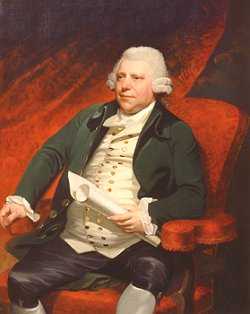
|
| Richard Arkwright |
The Industrial Revolution had a lot to do with manufacturing cotton cloth by religious dissenters in the neighborhood of Manchester, England in the Eighteenth Century. What needs more emphasis is the remarkable fact that Quakerism and the Industrial Revolution both originated about the same time, in about the same place. True, the industrializing transformation can be seen in England as early as 1650 and as late as 1880. The Industrial Revolution thus extended before Quakerism was even founded, as well as long after most Quakers had migrated to America. No Quaker names are much mentioned except perhaps for Barclay and Lloyd in banking and insurance, and Cadbury in candy. As far as local history in England's industrial midlands is concerned, the name mentioned most is Richard Arkwright, whose behavior, demeanor and beliefs were anything but Quaker.
He seems to have invented nothing, stealing the patents and ideas of others freely, while disgustingly boasting about his rise from rags to riches. Some would say his skill was in the organization, others would say he imposed an industrial dictatorship on a reluctant agricultural community. He grew rich by coercing orphans, convicts and others he obviously disdained into long, unpleasant, boring and unwelcome labor that largely benefited him, not them. In the course of his strivings, he probably forced Communism to be invented. It is no accident that Karl Marx wrote the Communist Manifesto while in Manchester visiting his friend Friedrich Engels, representing reasonably well the probable attitudes of Arkwright's employees. What Arkwright recognized and focused on was that enormous profits could flow from bringing piecework weaving into factories where machines could do most of the work. Until his time, clothing was mostly made by piecework at home, with middlemen bringing it all together. The trick was to make clothing cheaper by making a lot of it, and making a bigger profit from a lot of small profits. Since the main problem was that peasants intensely disliked indoor confinement around dangerous machines, the industrial revolution in the eyes of Arkwright and his ilk translated into devising ways to tame such semi-wild animals into submission. For their own good.
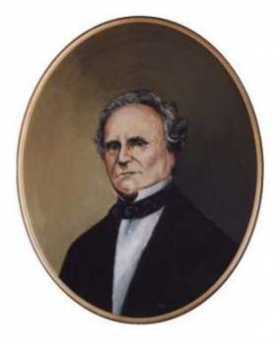
|
| Charles Babbage |
Distinctive among the numerous religious dissenters in the region, the Quakers taught that it was an enjoyable experience to sit indoors in quiet contemplation. Their children were taught to submit to it at an early age, and their elders frequently exclaimed that it was a blessing when everyone remained quiet, enjoying the silence. Out of the multitude of religious dissenters in the first half of the Seventeenth century, three main groups eventually emerged, the Quakers, the Presbyterians, and the Baptists. Only the Quakers taught that silence was productive and enjoyable; the Calvinist sects leaned toward the idea that sitting on hard English oak was good for the soul, training, and discipline was what kept 'em in line.
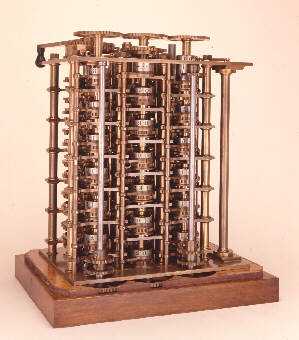
|
| babbagemaq.jpg |
The Quaker idea of fun through daydreaming was peculiarly suitable for the other important feature of the Industrial Revolution that Arkwright and his type were too money-centered to perceive. If workers in a factory were accustomed to sit for hours, thinking about their situation, someone among them was bound to imagine some small improvement to make life more bearable. If such a person was encouraged by example to stand up and announce his insight, eventually the better insights would be adopted for the benefit of all. Two centuries later, the Japanese would call this process one of continuous quality improvement from within the Virtuous Circle. In other cultures, academics now win professional esteem by discovering "win-win behavior", which displaces the zero-sum or win/lose route to success. The novel insight here was that it has become demonstrably possible to prosper without diminishing the prosperity of others. In addition, it was particularly fortunate that many Quaker inhabitants of the Manchester region happened to be watchmakers, or artisans of similar trades that easily evolved into the central facilitators of the new revolution -- becoming inventors, machine makers and engineers.
The power of this whole process was relentless, far from limited to cotton weaving. When Charles Babbage sufficiently contemplated the punched-cards carrying the simple instructions of the knitting machines, he made an intellectual leap to the underlying concept of the tabulating machine. Using what was later called IBM cards, he had the forerunner of the stored-program computer. There were plenty of Arkwrights getting rich in the meantime, and plenty of Marxists stirring up rebellion with the slogan that behind every great fortune is a great crime. But the quiet folk were steadily pushing ahead, relentlessly refining the industrial process through a belief in welcoming the suggestions of everyone.
Quaker Efficiency Expert: Frederick Winslow Taylor 1856-1915

|
| F.W. Taylor |
For at least seventy-five years after Fred Taylor turned it down, any rich smart Philadelphia Quaker attending Phillips Exeter would have been automatically admitted to Harvard. We don't know why he did it, but instead F.W. Taylor just walked a few blocks down the hill from his Germantown house and got a job at the Midvale Steel Company as an apprentice patternmaker. During the twelve years, while he rose to become chief engineer of the company, he took a correspondence course for a degree in mechanical engineering at Stevens Institute and invented a process for making tungsten steel, called high-speed steel. That made Midvale Steel rich, but Taylor was going to make Philadelphia rich, and after that, he was going to make America rich. When he died, he was widely hated.
Evidently his lawyer father greatly admired German efficiency, having sent little Freddy to a famous Prussian boarding school where he was in attendance at the time of the
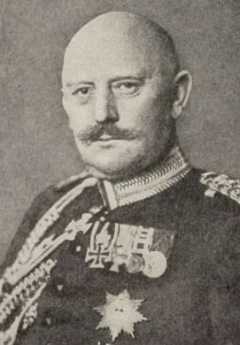
|
| General von Moltke |
Battle of Sedan. General von Moltke had used Prussian efficiency and discipline to defeat those indolent lazy French, and Fred Taylor evidently absorbed and retained these stereotypes for the rest of his life. Whatever he was looking for at Midvale Steel, what shocked him most was to find workers "soldiering on the job". That's a Navy term, by the way, invented by sailors to describe the useless shipboard indolence of any Army they were transporting. Taylor later went to Bethlehem steel, reduced the number of yard workers from 500 to 180, and was promptly fired. It seems that most of the foremen at the plant were owners of local rental houses, which were emptied of tenants when Taylor reduced the workforce. Even management came to mistrust Taylor. When the railroads wanted a rate increase, Louis Brandeis defeated them with the argument that they wouldn't need higher rates if they adopted Taylor's system of efficiency. In his later years after he became enormously rich, he toured the country giving speeches without fees, promoting the doctrine of finding the one best way and then doing everything that way.
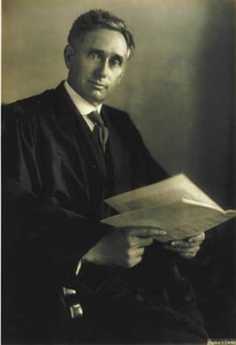
|
| Louis Brandeis |
Over time, Frederick Taylor had come to see that the industrial revolution had proceeded to the factory stage by merely bringing craftsmen indoors, each one treasuring his little trade secrets. Bringing the point of view of the company's owners onto the shop floor, Taylor could see how vastly more profitable the steel company would be if all those malingering tradesmen would stop soldiering on the job. No doubt the young Quaker soon learned that little was to be accomplished by remonstrating with workers, just as bellowing foremen had learned that bullying was also useless. Out of all this familiar scene emerged Taylorism, the idea of paying financial incentives to those who produced more, splitting the rewards of efficiency with the management. It sort of worked, but it didn't work enough to satisfy F.W. Taylor. When he walked around with a stopwatch, he collected the data showing how much more might be produced if the workers were perfectly efficient. Not only did that create the stereotype of the stop-watch efficiency expert, but it also provoked Congressional hearings and federal law against stopwatches which stayed on the books from 1912 to 1949. Although management responded by forming dozens of Taylor Societies to honor the approach, the unions invented the term "Taylorism" and bandied it about as the worst sort of epithet. Curiously, the Taylor approach proved to be enormously appealing both to Lenin and Stalin, who applied it as a central part of their five-year plans and general approach to industrialization. As we now all recognize, the Communist approach was a two-tier system instead of the three-tier system that was needed. It isn't enough to have a class of comrades called planners and another called workers; you need a layer of foremen, sergeants and chief petty officers in the middle. In addition to the elaborate time and motion studies leading to detailed written procedures, there needs to be an institutional memory for the required skills of the trade. In a funny sort of way, Fred Taylor the Quaker may have organized the downfall of the communist state before it was invented.

|
| Herbert Hoover |
Another peculiar outgrowth of Taylorism may be the partisan lines of our own political parties. If you trace the American ideological divide to the 1932 election of Franklin Roosevelt, you can see we are still fighting the battles of the depression. It happens that Herbert Hoover, another Quaker, was totally captivated by Taylorism. Not only that, he was adamant that to get rid of the depression all the country needed was to return to self-reliance, individual responsibility, and hard work. Those were qualities Hoover himself had in superabundance. One telling remark that he probably regretted saying but nonetheless firmly believed was, "If a man hasn't made a million dollars by the time he is forty, he can't amount to much." Franklin Roosevelt had the million all right, but his family had given it to him. The Cadburys and Clarks could have given it to Fred Taylor, too, but he chose to make it himself.
www.Philadelphia-Reflections.com/blog/1296.htm
Powel House, Huzzah!
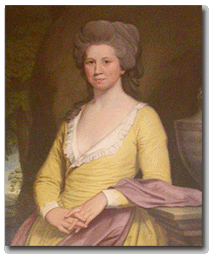
|
| Elizabeth Powel |
If George Washington were still alive he would no doubt be a Republican, but the term Republican Court actually has nothing to do with R's and D's. It was a scheme deliberately cooked up by Washington and Madison to enlist support by the new government's important ladies for a modified version of a European royal court, to make thirteen colonies into a cohesive nation. A most remarkable thing about it was its frank imitation of the royal courts, something only the Father of His Country could pull off in former colonies which had just fought an eight-year war to be rid of the monarchy. It is one more great testimony to the faith of Americans in George Washington; but it also testifies to the power of enthusiastic women, once they agree on a project. Chief among the leaders in this court was Elizabeth Powel, along with her niece living around the corner on Spruce Street, Anne Willing Bingham. Recently, the Peale Society of the Academy of Fine Arts held a candlelight dinner in Mrs. Powel's magnificent second-floor dining room, while scholars of the history of the Republican Court told assembled notables of Philadelphia what had once been what, during the first ten years of the Republic.
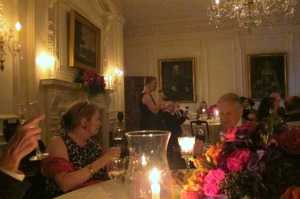
|
| Dining Room |
Members of the early Congress were largely the same men as the founding fathers of the Constitutional Convention, hand-picked by Washington and Madison to persuade the legislatures of their colonial states to give up state sovereignty, for a unified nation. There was the difference that now they brought their wives to live in Philadelphia during sessions of Congress. Those women wanted to know each other and wanted to have something exciting to do together in the largest city in the nation. Their husbands knew well how politically useful it was to be socially acquainted in this way, so everybody liked the idea of suddenly becoming nationally connected. The initial idea proved unworkable. Martha Washington was supposed to become Lady Washington, reigning over weekly receptions.

|
| In Our Cups |
But Martha, unfortunately, wasn't up to the task, and Anne Bingham whose rich husband had taken her on lengthy tours of European royal courts, moved right in and took charge of this project. Besides her cousin Elizabeth Powel, notable members of this social whirl were the two daughters of Chief Justice Benjamin Chew, Alexander Hamilton's wife, and various members of the Shippen and Willing families. Members of the family of Lord Sterling of New Jersey, Charles Carroll of Carrolton, Maryland, Cadwaladers of various sorts, and a number of other names famous from then until even today joined their affiliations with ladies from other states through parties and even some weddings. John Adams was particularly awestruck by the poise and beauty of Anne Bingham, although Abigail Adams may not have been quite so infatuated. It was a dizzy whirl, with dinner parties the central activity just as they are in Philadelphia even today. Country bumpkins had to learn how to dress, to talk and to eat with the right spoon and keep their elbows off the table; those who could tactfully show them what was what were friends for life. Centuries later, Emily Post made a fortune writing books about these rules.
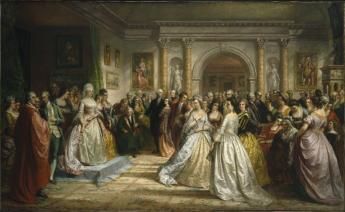
|
| Republican Court |
In those days, they even had their war cry, which was to raise a glass and shout back "Huzzah" in response to the proposer of a toast, who had raised his glass starting the warcry. It wasn't "Skol" or "Cheers" or "Here, here" if you knew what was what; it was "Huzzah". Most fashionable dinners had at least twenty courses, but the ladies didn't eat them. It was a whispered instruction among the ladies that they should eat before the dinner, so they could gracefully decline to gobble up goodies, and spend their time in gay conversation or waiting to be asked to dance. Drinking and eating, especially drinking, was for the men at the party, although naturally the many courses of the banquet were put in front of the ladies to be airily ignored. When George Washington was present as he often was, or even La Rochfoucault himself, it was important to remember every spoken word.
And, you know, it worked. When these important people went back home, they took the customs of the Republican Court with them. The American diplomatic corps found the equivalent of minor-league training for their efforts on behalf of the country abroad. Politics was easier if you personally knew your adversaries as well as your allies. The persistence of the same family names in the Social Register, the lists of The Four Hundred and other compilations of high society show that Anne Bingham and Elizabeth Powel did indeed know what they were doing, and for that matter, so did George Washington. If anyone else had been at the top of this heap, Thomas Jefferson stood ready to attack with all his might.
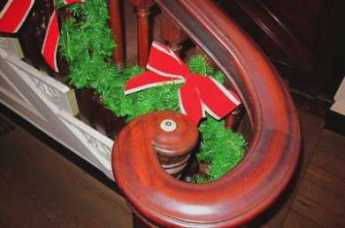
|
| Amity Button |
But he and even Patrick Henry didn't dare attack Washington. The aristocrats of Old Europe probably did sneer at this amateur effort, and in some circles still, do. But the inability of absolutely any other group of nations, whether European, Asian or South American, to unite peacefully is a thumb in the eye of anyone who mocks George Washington's little Philadelphia creation. And to think it all began right here, right here in the Powel House, right here in the dining room on the second floor. For that, folks, one thunderous "Huzzah!"
REFERENCES
| A Portrait of Elizabeth Willing Powell: 1743-1830 David W. Maxey ISBN-13: 978-0871699640 | Amazon |
The Best Density for an Idea
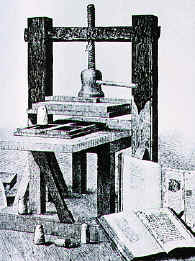
|
| Gutenberg |
Books were copied by hand before the invention of the printing press; every word counted. Quite often, that made the writing hard to grasp, too concise for comprehension by a normal reader at a single reading. An example would be Aristotle's comment on the nature of cities:
The partnership finally composed of several villages in the city-state; it has at last attained the limit of virtually complete self-sufficiency, and thus, while it comes into existence for the sake of life, it exists for the good life.... it is clear that the city-state is a natural growth, and that man is by nature a political animal, and a man that is by nature and not merely by fortune citiless is either low in the scale of humanity or above it.
Aristotle, Politics, I, i, 8-9, Translated by H. Rackham, and quoted by Sir Peter Hall.
Many modern readers glancing at this little paragraph would pass on to other concerns, confirmed in the conclusion that Aristotle is unreadable. A few who struggle through will see it is a collection of six epigrams. In the modern spirit of one-liners, they would be:
- A city is a collection of villages that, together, make a self-sufficient unit.
- A city grows because people are drawn there for economic reasons.
- City-dwellers don't return home because the city seems a more pleasant place to remain.
- People may come and go, but a city is destined to grow in size, on net balance.
- People innately prefer to live in clusters (politis).
- Those few people who don't like to live in a convivial cluster, are either boobs or saints.
Taking the trouble to tease his paragraph apart, one must acknowledge, Aristotle really has a lot to say about cities. By contrast, the author who quotes him on the frontispiece, Sir Peter Hall, uses eight hundred pages to make roughly the same arguments in Cities in Civilization. Although Sir Peter is a master of almost lyrical prose which touches on over 3000 literary citations, the six ideas are stretched too far on such a framework. Sir Peter controls his material and does not wander. The reader wanders.
It seems so terribly cruel to sound negative about a nice old gentleman, who must be an enormously entertaining person to share dinner with. And who has written a masterful prose poem about cities we all love. His book is well worth the price to buy, well worth the time to read. But it is overly long to support a half-dozen controversial ideas, just as Aristotle's seventy-five words are too few. The average reader will readily accept about two of the six propositions without elaboration, and will probably reject about two others in spite of all efforts to persuade.
When it comes to this sort of thing, the Economist, also written in Great Britain, has the most effective formula. Most of its pieces are written by one person and re-written by a second. After reading about a thousand such articles, the formula gets a little tiresome. But the density is nevertheless right for the modern reader. Three paragraphs for what Aristotle would accomplish in an epigram; ten pages for one really new, and difficult, idea.
Plain Speech

|
| Goofy Cartoon |
Philadelphians don't dislike New York; to them it's like an occasional visit to Disneyland. One day, a Main Line lady dressed her seven-year-old daughter in a little hat, shiny Mary-Jane shoes, and white gloves and the two went off to Gotham. The little girl kept her nose glued to the window of the taxicab.
They passed a midtown street corner of Fifth Avenue, where a cluster of young women, all painted up and overdressed, were waving at passing cars with one hand while brandishing a cigarette with the other. The little girl said, "Mommy, what are those ladies doing?" To which her mother replied, "Why, dear, they are waiting for their husbands to come to take them home."
At this point the cabbie turned around in the front seat and snarled, "Lady, why don't you tell your daughter the truth? You know those are Ladies of the Evening."
After a little silence the little girl asked, "Mommy, do Ladies of the Evening have any babies?"
"Yes, of course, Dear " replied the mother. "Where do you suppose taxi drivers come from?"
Methods of Thought: Scientific, Logical, Future

|
| Galileo |
Early in the Sixteenth century -- some say it was Galileo who started it -- the Scientific Method appeared. A hypothesis was generated, then subjected to experiment. Flaws were detected, the hypothesis re-modified, then tested again. The central characteristic of truth was established: reproducibility. The same test should always yield the same result in the Scientific Method.
A few decades later someone -- probably Sir Francis Bacon -- applied a modified Scientific Method to the common law. What seemed like a good remedy for a dispute was tested in the courts by entertaining appeals of similar cases, to test how the remedy seems to turn out. The reliance could not be on systematic experiments, so it had to rely on nature's experiments. Of the two disciplines, the scientific thesis-hypothesis-new thesis came to rest with firmer conclusions sooner than the common law did because scientists could devise systematic tests. A Judge, on the other hand, must wait for roughly the same circumstances to come up again before reproducibility can be determined, and that sometimes takes decades. Since a Judge can scarcely be expected to arrange his cases experimentally, non-comparable circumstances are always potentially present.
In both Experimental science and the Law, however, increased velocity --progress -- is an independent variable. It was celebrated enough during the Enlightenment to embolden public acceptance -- not merely of the validity of the Scientific Method, but -- of science itself and the Law itself. During those three hundred years after Galileo dropped bullets of differing sizes down the Tower of Pisa, rapid progress created a new respect for scientists and lawyers. Naturally, that led to lessened prestige for priests and kings, hence disruptions of existing power arrangements. History was the score-keeper of these turmoils, but History itself also became a variant of the scientific method. Unfortunately more than even the Law, History had to wait long periods for natural experiments to present themselves. Unfortunately, also, the effect of history on politics created an incentive for misrepresentation, now one of its main weaknesses.
Meanwhile untested Philosophy languished. The human uterus was not bicornuate, as anyone could see by examining one. Understanding only crept forward in a petty pace among logical philosophers; a century was brief in their vocabulary. For their part, Religions made a poor showing compared with the Common Law, particularly when advocating patterns of behavior. Religions were too rigid, too mysterious in their conclusions, provided too little guidance and too much grief. Too often the object seemed to be a skill in making the worse appear the better reason or acquiring detestable techniques of Oxford debating societies, where framing arguments in sly ways advances inappropriate victories. Logic acquired a bad name when its practitioners could easily be seen to prefer victory for the debater over advances for truth. And yet it does seem much too soon to discard logic and debate; indeed, they may be on the threshold of their finest hour.
A professor of mathematics of one of America's greatest scientific graduate schools, recently expressed his confusion about the nature of logic. Experiencing platoons of math graduate students marching past his blackboard, he commented on the extraordinary diligence of mostly foreign-born students, perfectly content to spend twenty daily hours studying to achieve distinction. "And yet," he said, "Every year there are two or three who never come to class, except to take the test. And they always get the highest possible grades." His inability to discuss the inner workings of such minds was related to the fact that he seldom met them in person. That such logical prodigies are not rare is also seen at chess tournaments, where players of no particular professional distinctiveness are to be observed moving among the chessboards of twenty opponents, occasionally even doing it blind-folded. The rest of us cannot hope to match such performances ourselves, so we are not entitled to scoff at the achievement, or belittle its potential for re-revolutionizing the science of thought.

|
| Bill Gates |
Academia sometimes expresses and should express more often, its discomfort that Bill Gates and a number of other certifiable geniuses have found colleges disagreeable, and drop out. When one of them becomes the richest man in the world before he is forty, at least it becomes necessary to acknowledge that his talents are not a one-trick pony. These people seem to be differentially attracted to computer science, perhaps instinctively recognizing that machines seem capable of exceeding the largest human memory, and their integrated processors sit idly waiting for some genius to put them to work. Even today, with mere mortals writing the programs, we are informed that seventy percent of stock market transactions are conducted between two machines, operating unattended. Perfecting stock transactions may well be approaching its useful limits, but potentials for improving the world's daily activities are so vast that grammar school children could easily list a hundred possibilities. What children cannot do is devise something to motivate a man to remain productive, after he already has fifty billion personal dollars. And another thing children cannot do is describe an educational system appropriate for such extraordinary people when they presently find nothing in the classroom worth their attention. We are giving up the Space Program as not worth its cost. Well, here's a goal which is obviously worth its cost, if only to stay ahead of international competitors in an atomic age.
Philosophy Means Science in Philadelphia
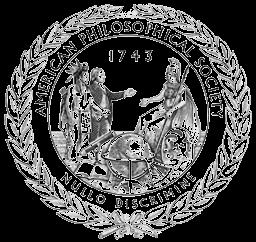
|
| American Philosophical Society Seal |
In the age of the Enlightenment, science was called natural philosophy; that accounts for the present custom of awarding PhD. degrees in chemistry and botany. The sort of thing which interested Ralph Waldo Emerson was called moral philosophy, and you will have to visit some other place than the A.P.S. if that is what interests you. Roy E. Goodman is presently the Curator of Printed Material (some would say he was chief librarian) at the American Philosophical Society, founded in 1743 by Benjamin Franklin who was clearly the most eminent scientist of his day, having discovered and explained the nature of electricity.
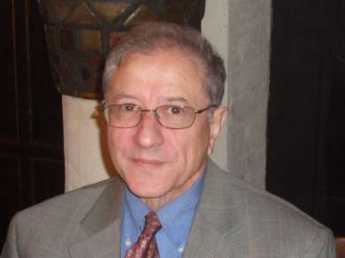
|
| Roy E. Goodman |
Roy Goodman is descended from cowboys and rodeo stars, but in spite of that he gave an entertaining talk recently at the Right Angle Club about this society devoted to useful knowledge, this oldest publishing house and scholarly society in America, once the home of the U.S. Patent Office, and scientific library and museum. They have many rare items in their collection, but the unifying theme is not a rarity, but curiosity. You might say some of the items reflect the whimsy of Franklin, but it would be fairer to say it is an enduring monument to Franklin's universal curiosity about all things.
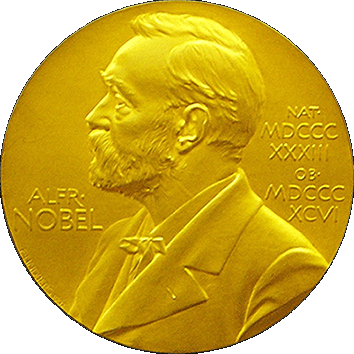
|
| Nobel Prize Medal |
There are about 900 members of APS, about 800 of them Americans, about 100 of them winners of a Nobel Prize. Let's just make a little list of a very few notables in the past and present membership. Start with the first four Presidents of the United States, add Alexander Hamilton and Lafayette, David Rittenhouse and Francis Hopkinson and you get the idea that Founding Fathers got in early. Robert Fulton, Lewis and Clark, Alexander Humboldt, John Marshall were early members, and more recent ones were Madame Curie,
Philadelphia Mafia: The First Fifty Years
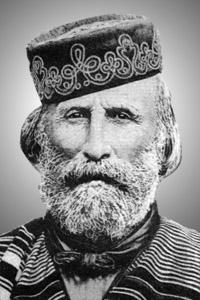 |
| General Giuseppe Garibaldi |
General Giuseppe Garibaldi unified Italy, but a great many Italians either didn't want to be unified, or emigrated to America after 1860 to escape the turmoil. The far western tip of Sicily was the most remote place in Europe, protected by mountains and volcanoes, speaking its own language, and loyal to no government except its own informal one. Over a period of centuries, secret traditions of feudalism and invisible governance had protected Sicily from invaders of various sorts. Although religion was a powerful force, theirs had traces of the Greek Orthodox Church; allegiance to the Vatican faded out as the local priesthood got closer to it. These people mostly wanted to be left alone, and dealt with outside authority in various devious ways, not stopping with murder if necessary. Informal taxes were collected as "paid protection" since a secret army costs money if only to support funerals and soldiers' widows. Rank within the underground army was identified by various degrees of "honor", which could sound vague but were in fact quite unambiguous. Central to the code of the Sicilian underground government, like all guerilla movements was a strict rule of silence, "omerta". As an intern in a hospital accident room, I have seen members of this organization actually go to their deaths, grimly repeating the mantra, "I don't know nuthin."
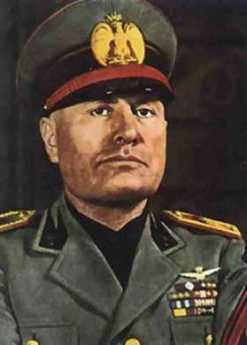 |
| Benito Mussolini |
Italy may have been unified by Garibaldi in the sense of being freed of French, Austrian and Papal domination, but unification was far from peaceful and contented, with losers often choosing emigration. A second wave of emigration was provoked by the harsh rule of the dictator Benito Mussolini, who determined to squelch underground resistance once and for all.
Western Sicilians originally chose New Orleans as their new home, which unfortunately for them already had its own secret society, the Ku Klux Klan. A prompt reaction to the "Italians" with ten or twelve lynchings soon convinced the Sicilians to resettle elsewhere. It seems possible that some of the later techniques of the Mafia were learned from the Klan. In any event, the Sicilians split into two main groups, one going to New York and the other to Philadelphia. Offshoots of the New York group moved to the mining areas of Luzerne County in central Pennsylvania (Hazelton), while another early group migrated to Norristown. There were, of course, links of intermarriage among these groups, but in the early years they drifted apart as separate colonies.
Italian immigrants were no exception to the common tendency of new immigrant groups to gravitate into crime. Records of the Pennsylvania police and jail systems for three centuries show successive waves of inmates with surnames identifying Scottish, then German, then Irish, and eventually Italians. At present, seventy percent of prison inmates are black. Almost without exception, the main victims of immigrant predation have been members of their own immigrant group. Immigrants are easily victimized, somewhat defenseless, and uncertain of the assistance of local law enforcement. Among the most famous of the lawless predator groups among the Italians was the Black Hand, whose specialty was extortion with notes signed with a black hand symbol, enforced by putting bombs under porches. Locals will show you a place on Ninth Street a couple of blocks from the Pennsylvania Hospital where the Black Hand blew things up. The Black Hand, however, was not the Mafia; it exemplified what the Mafia was formed to control.
The Italian community for fifty years was centered on Christian Street, mostly between Eighth and Ninth, gradually migrating westward toward Eleventh Street. Christian Street had been named by the Swedish Philadelphia colony after their monarchs, but the original Swedes tended to remain in Queen (Christina) Village, along Delaware, while the newer migrants drifted to newer areas. During the Civil War, northern railroads heading south ended in Camden. In time, the main Civil War traffic ferried across the Delaware River to wharves at the foot of Washington Avenue. South Street was the honky-tonk area, with a black community growing along with it. After the War, an immigration station was constructed in the Washington Avenue wharf, and the new Italians tended to settle nearby. As the streets were extended westward, the street names were also extended, but the region of Eighth and Christian was largely open fields when the Italians moved into the area, and never had been Swedish. Although there were forty or more murders in the block of Christian from Eighth to Ninth in ten years after the first World War ("Murderers Row"), in modern times the neighboring region is prized by Italian residents as an extremely safe place to live, because the Don likes it nice and quiet.
While it is probably true this safety net quality might not be so evident to blacks and Vietnamese, the safe streets for Italians feature are universally attributed to the Mafia. The Sicilian group quickly reestablished the secret army of "soldiers" and "dons" (usually one don overseeing ten soldiers), started collecting taxes in the form of protection money from the local residents, and putting one "capo" in overall command. You had to be a Sicilian, and a Western Sicilian at that, to be eligible for membership in this secret army. The hierarchy was secret but could be surmised by the elaborate "respect" paid by one to another.
My office partner, Dr. Robert Gill, tells a story illustrating the paying of respect. He was called in consultation to an Italian home by Dr. Baglivo, a highly respected general practitioner in the Italian community. The two of them walked down Eighth Street, and as they passed a barber shop, Dr. Baglivo suggested they both go in for a haircut. Evidently, the patient to be visited was a very important person, and as they went in the shop, Dr. Baglivo introduced Dr. Gill to the group of assembled loiterers as the big doctor from the Pennsylvania Hospital, come to visit you-know-who with the last name ending in a vowel. The group jumped to their feet, in respect, and the barber turned to the lathered-up, half-shaved man in the barber chair. "You!", he cried out, "Get out of that chair! Let the Doctor have a haircut.!" The man dutifully scrambled out of the chair with shaving cream dripping, and humbly sat in a waiting chair, while the big doctor got his haircut. As they left the shop, payment for the haircut was elaborately refused. The point, of course, is not so much one of respect for the medical profession, as respect for someone who had been chosen to attend a capo.
The Mafia was thought to do a fair amount of slashing and breaking of kneecaps, but killing was not permitted except at the order of the boss, or capo. The police could be fairly tolerant of informal methods of law enforcement, but dead bodies brought newspaper attention where even paid-off politicians might not be able to shield the Organization from "heat". For the first forty years, members of the Mafia were sort of volunteer firemen, earning their living as tradesmen and laborers; Mafiosi were paid protection money but were not generally wealthy. The identity of the capo was for forty years a complete mystery to the non-Sicilian community.
But then, along came Prohibition.
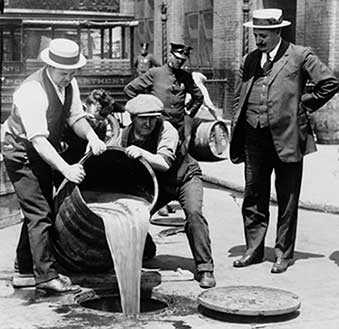 |
| Prohibition |
Prohibition created big money fairly safely, so bootleggers proliferated widely. It was soon no longer possible for one tightly-knit fraternal organization to intimidate a whole host of petty criminals acting alone or in small groups, so the Mafia was forced to control the bootlegging industry through dominating its sources of supply. As a general rule, "rum-running" involved bringing in conventional brand liquor from Canada. That route made Chicago, Boston and New York the major entry and distribution points for "good stuff". From Philadelphia south, most illegal liquor was "moonshine" or other illegally distilled products. Some liquor was distilled in abandoned buildings and garages, but a substantial amount was distilled in the Pine Barrens of nearby New Jersey. The colorful history of the Teamsters Union can be traced in part to the transportation network established for conveying one form of bootleg or another to its retail destinations. Trucks were often hijacked, so paid protection took a new motorized form. The manpower required soon exceeded the number of Sicilian neighbors related by intermarriage. Local groups had to be coordinated with national groups, requiring the establishment of syndicates and governing councils. Even then, one group of recognized Mafia might collide with another; the resulting murders had to be negotiated through a quasi-judicial appellate system.
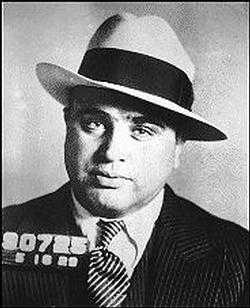 |
| Al Capone |
Philadelphia appears to have had a share of gangland warfare, but mainly that was based in Chicago and New York. In one year, Chicago experienced four hundred gangland murders, Philadelphia only forty. Al Capone came to visit Philadelphia, for reasons unknown, was assured he was most unwelcome and got himself put in jail, for his own protection. Eastern Penitentiary likes to show off his well-decorated cell, to which meals were apparently catered. What was really going on remains a mystery. A group of ten Philadelphia Mafiosi is now known to have gone to New York to participate in the "Castellammerese Wars", where two large New York Mafia groups engaged in a fierce battle for supremacy in what was now a source of vast riches. Occasional lurid episodes like this surfaced in Philadelphia, but the Mob was determined to remain as obscure as possible, and many details are missing or deliberately misrepresented. The essence of it all was that Prohibition had transformed the Mafia from a little vigilante group who imposed law and order on a lawless immigrant community, into a tightly organized army of killers, who mostly devoted their war efforts to exterminating rival tribes, while their daily activities consisted of running marginally tolerable criminal activities like gambling and loan sharking.
sting book by Celeste A. Morello called Before Bruno. In 1927, the Mafia decided they could no longer tolerate the Zanghi gang of four or five or a somewhat larger gang of Lanzetti brothers. On Memorial Day, 1927, several Zanghi members were standing on the corner of Eighth and Christian, when they were approached by several men in black overcoats. Down the street came a car with several others carrying shotguns. After the smoke cleared, three Zanghi (one of them the uncle of Mario Lanza the singer) were lying in a pool of blood, and the car went careening down Christian Street with four Mafiosi, including Salvatore Sabella, crouched on the running boards. "Musky" Zanghi, who was intended as another victim, emerged from the neighboring building and acted like a crazy man. "Sabella," he cried, "Sabella did it!". And he continued to squeal, right into the police station and newspapers. The unthinkable had happened; someone ratted. As it turned out, Sabella was revealed as the Capo himself, and general consternation ensued. Just how this information got circulated is unknown, but a story has it that $50,000 was paid to Musky to shut his mouth, Musky failed to appear in court as a witness, the court system was persuaded to blame the whole thing on an unknown underlying named Quattrana (who went to jail for eight years), everybody else was not guilty, Sabella retired as capo at the remarkably young age of 40 and lived for years in Norristown. In fact, because of the 1929 crash, Sabella the capo had to work as a butcher in Norristown, receiving small gifts as a pension. And, as these undocumented stories would have it, it took fifteen years but eventually someone, surely a friend of Sabella, "got" Musky Zanghi, who was hiding out in New York.And the Lanzetti brothers? Well, they got eliminated, reputedly by Sabella's successors in the organization, but the violence triggered extensive Grand Jury investigations led by Judge Edwin O. Lewis, later the father of Independence Mall. Thereafter, mob rubouts became considerably less frequent. Although newspaper and FBI activity had been extensive, and apparently effective, a more detached view makes it more likely that repeal of the Volstead Act was the major factor causing mob activity to subside.
REFERENCES
| Blood and Honor: Inside the Scarfo Mob, the Mafia's Most Violent Family George Anastasia ISBN-13: 978-0940159860 | Amazon |
| Before Bruno: The History of the Philadelphia Mafia Book 2 C. A. Morello ISBN: 978-0967733425 | Amazon |
| The Last Gangster George Anastasia ISBN-13: 978-0060544232 | Amazon |
| The Last Mouthpiece: The Man Who Dared to Defend the MobRobert F. Simone ISBN-13: 978-09401596932 | Amazon |
REFERENCES
| The Pine Barrens: John McPhee: ISBN-13: 978-0374514426 | Amazon |
Philadelphia Chromosome
Every Spring for the last 185 years, the Franklin Institute has honored the most distinguished scientists alive; Franklin would certainly be proud of the Institute named after him. In recent years, many awards were combined into two categories, the Bower Awards and the Benjamin Franklin gold medals. Unlike the Nobel Prize, the Franklin Institute Medals are not given for eminence in a designated field of science, but rather are given out by a hard-working committee of scientists who ask themselves What are the really hottest scientific fields at present, and then ask panels of international referees Who is most eminent in that field? The awards thus effectively avoid fields that are temporarily stale and static, by being unrestricted in advance to particular fields. The approach of searching for the greatest minds rather than greatest achievement may well lead to the same award, but the method of choice seems more harmonious with the spirit of Benjamin Franklin, who not only excelled in the field of electricity but actually invented that whole field. The subtle shift in emphasis seems to have been well received; this year's Awards Banquet was over-subscribed before the invitations were printed, and a capacity audience of 800 attended a superb reception, dinner and audio-visualized live ceremony. Actually, the ceremony extends for a whole week, with scientific symposia and in-person meetings with high school students designed to interest them in science.
This year eleven scientists, the most prominent of whom were Bill Gates and Peter Nowell, received the medals. We'll get to Bill Gates in a while; for the present, let's concentrate on Peter Nowell, who invented the Philadelphia Chromosome. What's that?
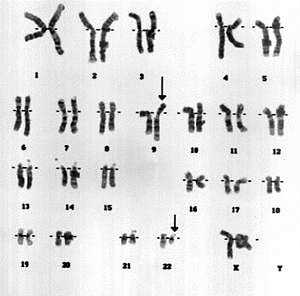
|
| The Philadelphia Chromosome |
Well, from 1921 to 1955, it was generally held that people, members of the human race, contained 48 chromosomes in every cell in their bodies. The chromosomes were thought to contain the genetic code governing our biological construction, explaining the difference between us and fruit flies, which for example only have four chromosomes per cell. After painstakingly examining the appearance of the chromosomes in different people and in cancer cells, it was then generally held that cancers never seemed to have any genetic abnormality. After all, the chromosomes of cancer cells looked exactly like those in normal tissue: Forty-eight chromosomes, never differing in cancers, so go look somewhere else for the cause of cancer. Unfortunately, the state of scientific development fifty years ago can be summarized by noting that about that time it then became established we really only had 46 chromosomes, not 48. As for cancer, the M.D. pathologist Peter Nowell, then noticed in 1956 that a patient with chronic myelogenous leukemia had an extra translocation on one particular chromosome, giving it a funny shape. This translocation was furthermore present in every single other leukemic cell suggesting that one cell had somehow undergone a single mutant change, and all the rest were its descendants. At least in CML (chronic myelogenous leukemia), it suddenly looked as though the cause had been found since the further study revealed the same was true of just about everyone who had CML. At first, it was felt that while maybe the cause of this particular type of cancer had been found, every other cancer might still be caused by something else. Not so. From believing no cancers were genetic in origin, Peter Nowell started us on the path of now being confident all cancers have a genetic cause.
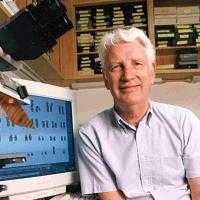
|
| Dr. Peter Nowell |
How could we all have been so wrong; can't scientists even count up to 46? No, as a matter of fact, in 1955 it was pretty hard. If we couldn't even tell how many of them were there, it's obvious the comment they all looked alike wasn't worth very much. As Peter shyly admits, his discovery was a result of being trained as a physician rather than as a life scientist; he knew what leukemia looked like, but at that time he didn't know very much about chromosomes. It happens chromosomes spend most of their lives expanded into tiny filaments too small to examine under the microscope. But as they enter the stage of cell division called metaphase, those filaments shorten and thicken up, becoming a lot easier to examine. As a pathologist, Peter didn't bother to stain his slides in dilute salt solution, but just washed them in tap water. The tap water had caused the cells to swell up and burst; those that happened to be in metaphase dumped their stubby chromosomes out where they could be stained and looked at. Simple. Doesn't everyone wash slides in tap water?
So fifty years ago, the general question of what causes cancer finally narrowed down to the right sort of specific question. Thousands of scientists, spending billions of dollars from the National Institutes of Health, sharpened the focus of their search considerably. It certainly looks as though someone is going to carry the search the final step, pretty soon. However, the fact that fifty years of intensive study still hasn't quite found the answer is an illustration of how fiendishly difficult the search really is. Each year that might have been spent futilely avoiding genetic searches would have added one year more before the answer was finally found. By the way, why is it called the Philadelphia Chromosome? In 1955 it had been decided by the scientific community that every genetic abnormality would be named after the city in which it was discovered. Dr. Peter C. Nowell of the University of Pennsylvania and the late Dr. David Hungerford of the Fox Chase Cancer Center were the joint discoverers, so obviously it was entirely a Philadelphia discovery; at that time it had been made a custom that genetic abnormalities were named after the city where they had been first found.
It would be a mistake to conclude that nothing new has been discovered in half a century of research. It has been established that not only Myelocytic Leukemia but essentially every cancer starts with some genetic abnormality, which triggers the expression of "mini RNA". These abnormalities then apparently express a cancer-producing action by triggering an abnormal factor in the cell signaling system, called tyrosine kinase. Drugs with the effect of paralyzing that enzyme have been found to be curative in 95% of cases of chronic myelogenous leukemia, and some other forms of lymphoma. We're certainly getting closer, step by unexpected step, to the answer. In fact, we may be getting even closer to a point where drug research can jump to seeking cures without precisely defining how the cancer was caused. After all, if cancer is caused by a chain of cellular events, it may not matter where you break the chain. That realization appeared with, first aspirin and then the statin drugs, for treating heart attacks and strokes, even though we are still not completely clear about how atherosclerosis is produced. Meanwhile, the death rate from hardened arteries has dropped by half.
It wouldn't be right to omit mention of Peter Nowell's Quaker heritage. Although he isn't a Quaker, his mother was a Matlack, a direct descendant of Timothy Matlack, the Haddonfield Quaker who was the scribe for the first writing of the Declaration of Independence. Sitting in silent Quaker meeting, polishing and simplifying one's message before delivering it, is very good training for a habit of simple, direct thought. As Dr. Nowell phrases it, he is a chronic "lumper" of ideas, when so many scientists are content to be "splitters". Splitting complexity into its essential components is a useful approach. But somewhere, someone has to get to the heart of the matter.
Pennsylvania Likes Private Property Private
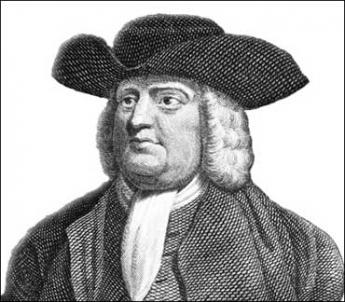
|
| William Penn Holding his Charter |
William Penn was the largest private landowner in America, maybe the whole world. He owned all of Pennsylvania, with the states of Delaware and New Jersey sort of thrown in. Although he and his descendants tried actively to sell off his real estate from 1684 to 1783, they still held an unsold three-fifths of it at the conclusion of the Revolutionary War, which they were forced to sell to the state for about fifteen cents per acre. This bit of history partly explains both the strong feeling this is private, not communal, land despite the existence of 2.3 million acres of the state forest system, which is affirmed right alongside the rather inconsistent feeling that raw land is somehow inexhaustible. Early settlers regarded the center of the state as poor farmland, particularly when compared with soil found in Lancaster and Dauphin Counties, or anticipated by settlers going to Ohio and Southern Illinois. A complimentary description is that glaciers descended to about the middle of Pennsylvania, denuding the northern half of topsoil which was then dumped on the southern part as the glaciers receded. Even today, farmers tend to avoid the northern region if they can, reciting the ancient advice from their fathers that "Only a Mennonite can make a go of it, around there."
So, lumbering had a century-long flurry in Central Pennsylvania, exhausting the trees and moving on. But that only related to the top layer of soil; beneath it lay anthracite in the East, and bituminous coal in Western Pennsylvania, supporting the steel industries of the two ends of the state with exuberant railroad development. Even today worldwide, hauling coal is the chief money-maker for railroads. The resulting availability of rail transport promotes the location of heavy industry near coal regions; the 20th Century decline of coal demand ultimately hurried the decline of heavy industry in the state by impairing the railroads.
Beneath all this lie the aquifers, porous caverns of fresh water. And beneath that, largely unsuspected for two centuries, lie the sedimentary deposits of a huge inland sea, compressed into petroleum which evaporates into natural gas. All of this is held by huge deposits of semi-porous shale rock, now mostly 8000 feet deep, stretching from Canada to Texas and called the Marcellus shale formation. If it can be economically recovered, there is more natural gas than in Arabia, and there is a similar formation along the near side of the Rocky Mountains in Colorado, stretching up to the Athabasca tar sands in Canada. There is another similar formation in France underneath Paris. No doubt, we will find the whole world has similar huge deposits for which the main problem has always been: how do you get it out?
There's another question, of course, of who owns it. Those who clearly do not own it maintain that everyone owns it. In the western world, most particularly in America, it is our firm belief that if you live on top of it, you own it. Since it is expensive to extract, quarrels like this are usually settled by purchasing mineral rights from the surface owner, who generally could not possibly extract it by himself. Those who assert they have a conflicting right to it because it belongs to everyone can expect belligerent resistance. At the present time when America faces a critical fifteen year period of dwindling oil supply, ultimately relieved by perfecting alternative energy sources, there is too little time to achieve consensus for any other governance theory. The problem which could possibly gain enough traction to interfere is the issue of potential damage to others which might result from the extraction of this subsurface treasure. Because of the apparent urgency of a decision to extract or go elsewhere to extract, the best we can hope for is some fairly rough justice.
William Penn Conducts a Witchcraft Trial
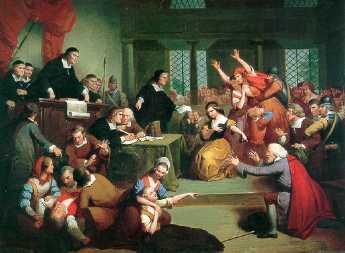
|
| Salem Witch Trials |
When trials for witchcraft are mentioned, most people think of Salem, Massachusetts, where 19 people were hanged as witches and hundreds were imprisoned, in 1692. The Salem trials were apparently provoked by a minister from Barbados, and it is thought the uproar about witches in America was in part related to encountering the spiritualism of the Indian tribes. Whatever its origins, the issue has been in the background for a long time, and occasionally even surfaces today in accusations of "Satanic rituals."
There were trials for witchcraft in New York in 1664, in West Chester in 1672, and in Princess Ann county of Virginia. But the trial of central interest to Pennsylvania occurred in 1683, when Governor Penn presided over it, himself. Pennsylvania had adopted British laws, including one from James I concerning the crime of witchcraft, so Penn probably had little choice but to hold the trial. His fellow judges were his Council; there is little doubt the outcome reflects his opinion.
The accused were two Swedish women, Margaret Mattson and Yeshro Hendrickson, who pleaded not guilty. Numerous witnesses told vague stories, and Mattson's daughter expressed her conviction of her mother being a witch. Governor Penn finally charged the jury, which brought in a memorable verdict. The defendants were found guilty of "having the common fame of a witch" but not guilty in the manner and form.
There are times, and this was one of them, when it is not useful to be overly precise in your meaning.
Parliamentary Procedure (1)
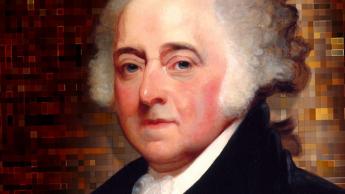
|
| John Adams |
The Constitution provides that the Vice President of the United States shall be the presiding officer of the Senate. Accordingly, during the Presidency of John Adams, from 1797 to 1801, Thomas Jefferson was the presiding officer of the U.S. Senate, down at 6th and Chestnut Streets. According to recent books by Ellis, McCullough and others, it must have been an exciting experience to preside over that particular Senate.
Just what was running through Jefferson's mind during that formative time of Senate procedure is largely left to conjecture. We hear it said that Senate debate was rambling, raucous, and sometimes physical. Since Jefferson himself was the most controversial person in the room, his rulings from the chair may well have been resisted. In any event, Jefferson proceeded to publish the first American Manual of Parliamentary Practice,
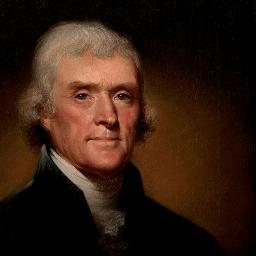
|
| Thomas Jefferson |
patterned after the rules of procedure of the British parliament. An uncut copy of this book is still on the shelves of the Philadelphia Atheneum, a block away. Its contents can be summarized as sensible elaborations of two basic rules: the deliberative body only takes up one topic at a time (discussion of anything which wanders from that topic is ruled non-germane), and the rights of the minority are to be respected. Since America had just concluded an eight-year war with England, it is a little surprising that the behavior of the English Parliament would be considered something to imitate, and by Thomas Jefferson, of all people. It is vital for any deliberative body to have a set of rules, agreed in advance, about how to conduct debate and reach a conclusion. Controversy can get pretty heated at times, and it is then too late to be making rules which might favor one side or the other. Establishing rules in advance is if anything more important than what those rules say. Jefferson was thus quite right in publishing such rules, with the intention that the first act of any newly elected group would be to adopt the rules in the book as the agreed standard for whatever happens to come up later. The uncut version at the Atheneum is symbolic; you don't have to keep discussing procedure if the procedure is agreed.
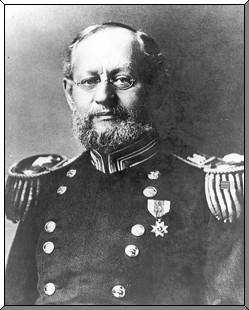
|
| General Henry M. Robert |
General Henry M. Robert wrote a revised version of Jefferson's rules in 1876, familiarly known as Robert's Rules of Order, which now govern the U.S. Congress. The main difference was to accommodate the creation of expert committees--on Ways and Means (taxes), Foreign Relations, health, etc, as the business of Congress grew more complex, and Congress met for longer and longer periods of time. Roberts Rules have thus become a special-purpose rule-book, and bodies like the American Medical Association or the American Bar Association, which meet for short periods yearly, find it more appropriate to substitute the use of "reference" committees. A reference committee is sort of a jury, intended to be a representative sample of the larger body, which is selected by the presiding officer to sort out a large amount of business and facilitate debate by the larger group as a whole. A reference committee system is better addressed by rules of order written by Mrs. Sturgis or Dr. Davis, than the more famous one by General Robert.
Underlying these seemingly dry technical issues is the struggle of an overburdened large group

|
| AMA |
to learn what its own collective opinion is, and to see that it is properly stated. As the agenda grows, it is necessary to designate smaller reference committees to hear testimony and present it fairly to the full convention when it assembles later. The referenced committee makes recommendations, but the full body reserves the decision to itself. In this way, the American Medical Association can make several hundred complex decisions in a week, almost universally recognized as representing the current opinion of the whole Association. Every few years, a decision is reversed, but remarkably seldom .
Eventually, a complex agenda grows to the size where a deliberative body must delegate a certain amount of power to experts, and the
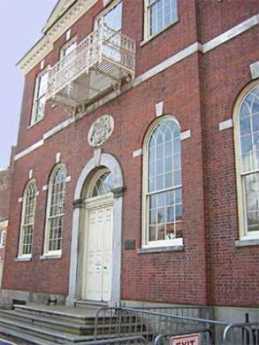
|
| U.S. Congress |
U.S. Congress is well past that point already. It must consider an average of 25,000 bills per session. The typical state legislature considers an average of 10,000 bills; without a set of rules, nothing can be accomplished within such an overburdened agenda. No one surrenders power easily, and Congressmen are correct to insist that a republic elects the specific people it wants to see making the decisions, and lets them organize their own process. Therefore, General Robert describes the intentionally obscure rules which have evolved to govern the delegation by the elected members, of specific matters to specific committees of its own members. To put it bluntly, some handsome extrovert who happens to have got himself elected to Congress can be assigned to some unfamiliar topic and expected to learn what it is all about, with his power constrained until he does. Rule by seniority makes a lot of sense in such a situation, although obviously, some learn faster than others. Accordingly, the deliberative body must have rules which assist the process of weeding out chairmen who acquire seniority faster than they acquire expertise, while at the same time sympathizing with the difficulties all members regularly experience, publicly thrust into unfamiliar topics. Most smaller deliberative bodies do not need the rules which Robert's have evolved to manage seniority difficulties without opening the gates to ruthless power manipulators, unfortunately, but commonly an over-represented group in politics.
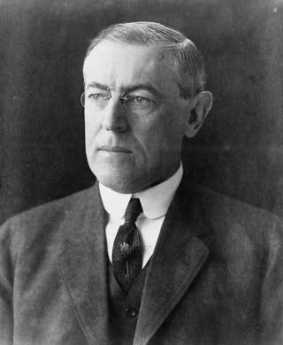
|
| Woodrow Wilson |
made himself a student of these arcane matters, and approved of the idea that, "Congress in Committee, is Congress at work" In recent decades, he would surely have been upset to see the degree to which the power of unelected experts has grown, at the expense of the power of home-made experts who none the less have been elected to exercise power in a general sense. The elected but amateur experts are in a constant struggle with experts provided by special- interest lobbyists, and experts in the bureaucracy who are provided by politicians in the executive branch. Lately, the executive branch is winning, and Congress had better look to its rules.
In this way, we begin to see how Parliamentary rules are different from Parliamentary procedure, although each influences the other. Parliamentary procedure is now a highly stylized, fast-moving game, greatly enjoyed by practiced players. Quick shots are applauded, and bumbling by presiding officers provokes instant indignation. Failure to call for votes in the negative was outlawed in 1604, there's no excuse for doing it this afternoon. Failure to call for debate of a proposal is an oversight too gauche to endure. Raucous "calling for the question" is as rude a form of behavior as taking off your shoe and pounding it on the table. Don't expect to get anywhere if you do things like this within an experienced group of players.
Now, modifying Parliamentary rules is something else. Changing or deliberately violating the rules of an organization is something only experts attempt, and usually with evil intent. Politicians sometimes can't be trusted with their own rules. The citizenry will be very sorry if, at a bare minimum, at least members of newsmedia editorial boards don't get more sophisticated about parliamentary rules, instantly sensing that something is up when someone wants to "modernize" them. The most egregious proposals of all are the ones which blandly propose to "bring the rules into conformity with current practice." Reflecting on such purring argument for a moment, it emerges that someone has been violating the rules for some time, and wishes to be condoned for it.
In one very important respect, Parliamentary procedure is accidentally mismatched to our legislative system. We elect a President or a Governor or a Mayor for a set period of time, and only remove him from office for egregious misbehavior, and in the case of Presidents only once in our history. In a Parliamentary system of government, by contrast, every Prime Minister expects to be removed by a vote of lack of confidence, which is a possibility every single day he is in office. The strategy of springing a trap could well underlie every proposal or budget measure; every move by the opposition could turn out to be a move in a chess game whose goal is to overturn the government. Consequently, Parliamentary debates are remarkably snide and uncivil in a Parliamentary system; no one dares to give an inch. In the American system, disorderly and mean-spirited remarks by the opposition are simply a nuisance, best ignored by the party in control. After two hundred years, our own legislative bodies have been slipping back a little into the savage reckless language heard in Parliaments abroad. Since the most important unwritten word in the Constitution is "compromise", one looks forward to the day when the voting public inflicts an unmistakable punishment for legislative intransigence. As Winston Churchill once growled, it's "Half foreign, and thoroughly reprehensible."
Owen Roberts: A Switch in Time
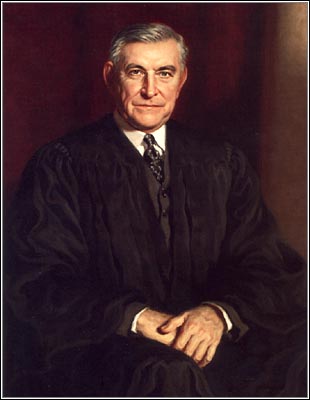
|
| Owen Roberts |
To this day, no one knows quite what to make of Owen J. Roberts, founder of one of Philadelphia's largest law firms. He was Prosecutor of the Teapot Dome scandal, Dean of the University of Pennsylvania Law School, Republican appointee to the U.S. Supreme Court. But then, he abruptly became the source of one of the most radical revisions of our system of government since the Declaration of Independence. Nothing in his prior career and nothing afterward in his subsequent civic-minded retirement from the Court seemed to suggest any radical turn of character had taken place. He has been compared with a famous baseball pitcher who threw right-handed or left-handed at will, unexpectedly, capriciously, who knows why.
The issue went far beyond one clause in the Constitution, but the commerce clause was the focus point. Under the limited and enumerated powers allowed to Congress by the Constitution was :
The Congress shall have power to regulate commerce with foreign nations, and among the several states, and with the Indian tribes.
That used to be called the interstate commerce clause until the Supreme Court announced its decision in the case of Wickard v. Filburn. When linked with the Tenth Amendment, granting to the States the power to regulate everything not specifically granted to the Federal government, this clause in the Constitution was universally taken to mean that the States had control of commerce within their borders, while Congress would control interstate commerce. Wickard v. Filburn took all that power from the states and gave it to Congress, which henceforth would regulate commerce. John Marshall had certainly triumphed over the hated state legislatures, but the Supreme Court suddenly lost its power to overrule Congress, too. One side had won the old argument, by silencing the umpire. No wonder Franklin Roosevelt started annual celebrations called Jefferson-Jackson Day dinners.
To describe the background: The 1929 stock market crash was quickly followed by the economic Depression of the 1930s. Nothing of this magnitude had been seen before, and there was a stampede to try new and untested solutions. Even government action which actually worsened economic conditions was felt justified if it conveyed to the frightened public the image that its leaders were taking firm action. Since Socialism and Communism were among the solutions grasped for, many unfortunate actions were felt justified as a way to control the Bolshevik threat. Many of these New Deal actions were declared unconstitutional by the Supreme Court since they involved sweeping revisions in the way all commerce, internal to the States as well as interstate, was conducted.
The Depression and financial panic continued through the 1936 Presidential election, which Roosevelt won in a landslide. Immediately after the start of the new term, he announced a plan to increase the number of Justices on the Supreme Court, appointing new ones more to his liking. He was at pains to point out that seven of the nine life incumbents had been appointed by Republican Presidents. This was, of course, the restraint intended by the Constitutional Convention, and the idea of packing the Court with new appointees was exactly what Jefferson and Jackson had tried to do.
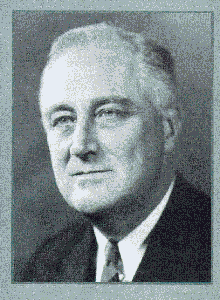
|
| Franklin Roosevelt |
In the meantime, the case of Filburn, a dairy farmer, came up. One of the New Deal agencies had assigned him a quota of 200 bushels of wheat he could grow on the side, as part of an effort to raise wheat prices by reducing supply. Filburn had raised 400 bushels, but consumed the extra wheat for his own personal use, hardly a matter of interstate commerce. The Court had repeatedly declared laws like this to exceed the interstate commerce limitation and were thus unconstitutional for the Congress to enact.
Well, Owen Roberts changed his position, Filburn lost his case. Forever afterward, this change of position was referred to as the switch in time, that saved nine. Since that time, the Court has rarely had the courage to rule any action of Congress unconstitutional, even though it is true that Congress promptly and resoundingly rejected the court-packing proposal.
And furthermore, the power of the state legislatures has shriveled because all commerce (except insurance and real estate) is federally regulated, with a corresponding vast increase in the size of the Federal bureaucracy, as Congress relentlessly pushes to intervene in commerce among the several states, formerly known as the Interstate Commerce Clause. Franklin Roosevelt had a certain right to gloat at Jefferson-Jackson Day dinners.
A few weeks before he died, Owen Roberts had all his papers burned. Apparently, we will never know whether the present outcome was the result he had in mind. Since he was later the author of Alfred Barnes' will, which strenuously sought to prevent the transfer of the Barnes art collection to Philadelphia County, anything written by a lawyer can apparently be reversed by other lawyers. One would have supposed that either the Original Intent would govern, or else the opinion of the Supreme Court on what the Constitution means, would prevail. Franklin Roosevelt showed us there is a third possibility: the President can overrule the Court by intimidating it.
Old Blockley (P.G.H.)
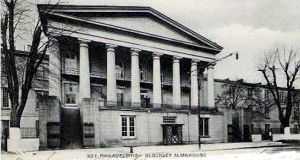
|
| Old Blockley |
For a long time, the Philadelphia General Hospital was the largest hospital in town, even growing briefly to seven thousand patients during the Civil War, but leveling off at about three thousand at the beginning of the Twentieth Century. At the end of World War II, it had shrunk to about 1500 beds, but it was Medicare and Medicaid in 1965 which finally did it in. By 1977 it was costing the City of Philadelphia about five million dollars a year beyond its revenues to run the place with only 300 patients, while the running expenses of the local private hospitals were actually less, per patient. Titles XVIII(Medicare) and XVIV(Medicaid) of the Social Security act constituted Lyndon Johnson's Great Society, and in effect they made every patient at PGH resemble a walking government check in the mind of hospital administrators. The local hospital association made the argument to the Mayor Rizzo that everybody would be better off if the hospital closed and those government checks were directed to the local voluntary institutions. After a few years, the federal government inevitably squeezed the generosity out of the bargain they would of course now like to abandon. But that's the way it goes. PGH is gone and it isn't coming back. The eighteen acres in Blockley Township, now West Philadelphia, were given to the University of Pennsylvania next door, and gigantic amounts of federal money were contributed to the building of skyscrapers replacements for the original PGH. Ironically, the two hundred children's beds now on the location are fewer in numbers than the three hundred adults once considered too uneconomically few to maintain, and the cost per day of hospitalization is roughly ten times the PGH cost which had been described as unsupportable. The rest of the real estate is built up with buildings involved in medical research, which is also an activity dedicated to working for its own extinction. Discovering a cheap cure for cancer would quickly create a need to fill the vacancies with something else. No one regrets this system of creative destruction, but everyone should regret the diminution of the spirit of local philanthropy which underlay it.
PGH was one of a dozen or so big-city charity hospitals, like Bellevue in New York, Charity in New Orleans, or Cook County Hospital in Chicago. Of these hospitals, PGH had surely been the best, and at the turn of the Twentieth Century a Mayor's commission issued a report about the place which began, "Philadelphia can surely be proud...." Having worked in Bellevue and having visited most of the rest, I can testify that was likely true. When PGH was finally torn down, the walls and floors had such substantial construction that changing the wiring and plumbing to some other purpose had become almost impossible. The PGH nurses were famous for running. Although the alcoholic and drug-addicted patients might be called the dregs of society, the alacrity of the student nurses in running them bedpans or answering other calls, was spectacular to watch. When a doctor came on the floor, they jumped to their feet and were usually ready with the patient's charts, unmasked. Unlike Bellevue, where the floors were creaky and wooden, the open wards at PGH were spacious, clean, well maintained and equipped. At Bellevue, the forty-bed wards were crowded with sixty or seventy patients, so close together you could almost roll from one end of the room to the other without touching the floor. I can remember seeing one seventeen-year-old Bellevue student nurse tending such award at night alone, the intern sharpening needles, and the medical resident developing electrocardiograms in the darkroom. None of this would have seemed acceptable at PGH.
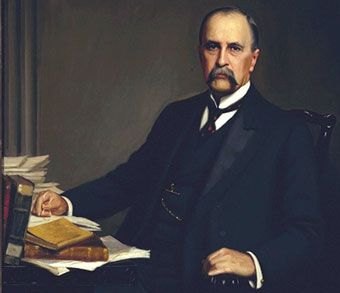
|
| Dr. William Osler |
Old Blockley was the place where modern systems of medical education originated. Up until William Osler came to Philadelphia, medical education mostly consisted of attending eight hours of lectures a day. Osler had an electrifying personality and wandered among the sick at PGH with a train of students following him. He is much quoted, and once suggested his obituary ought to read, "Here lies the man who took the students into the wards." A somewhat more elegant statement of the value of the practical experience was included in his dedication speech at the Boston Library: "To treat patients without books is to sail an uncharted sea. To read books without seeing patients is never to go to sea at all. Osler was somewhat underappreciated during his time in Philadelphia and went on to found the medical school at Johns Hopkins in Baltimore. Nevertheless, the main reason he later left John Hopkins and went to Oxford was his dismay at the adoption of the "full-time" system, which is to say the faculty stopped having a private practice of their own to act as a gold standard for their research and teaching. When all is said and done, there are some areas of discomfort in the transition of students from observers to actors. The PGH system of learning surgery was commonly reduced to a slogan, "See one, do one, teach one,"; things have progressed to the point where it is probably right for the public to insist on greater supervision and control than the old almshouse provided.
The disappearance of old Blockley ended a controversy, or even something of a mystery, about which was the oldest hospital in America, PGH or the Pennsylvania Hospital at 8th and Spruce. There had been an infirmary in Old almshouse at Eleventh Street, and there is no doubt the almshouse was there first. PGH grew out of the almshouse. However, there were many comments at the time of the founding of the Pennsylvania Hospital that it was now the first; that's a strange thing to say when the almshouse was three blocks away. Social historians need to look into the mindset of colonial America, which seems to have included the distinction between the worthy poor and the unworthy poor. Somehow, the founding principal of the Pennsylvania Hospital was to get people back to work who were capable of productive work, possibly even paying for itself in that way. In their minds, apparently just giving solace and help to those who were down and out was not quite the same thing.
Nobel Prize: Michael Brown, MD

|
| Michael Brown |
The College of Physicians of Philadelphia annually sponsors a lecture by a winner of the Nobel Prize in Medicine or Physiology. There is never any doubt of the high quality of any such lecture, but it does add an element of local pride whenever the Nobel Laureate comes from Philadelphia, as he did this year. Michael S. Brown, MD graduated from Cheltenham high school in 1958, received a B.A. from the University of Pennsylvania in 1962, and his M.D. degree in 1966. Nineteen years later, he was awarded the Nobel Prize in Medicine for his work in describing the cholesterol pathways, and the human defects in it which lead to heart attacks, strokes and other consequences of atherosclerosis. Almost immediately, Japanese investigators found the so-called stain drugs being produced by relatives of the penicillin mold for no, particularly obvious purpose. The patents have not yet expired on most of these drugs, but many millions of people have already been spared death or disability from hardening of the arteries, the commonest killer in modern life.
The speaker, now a gastroenterologist practicing in Texas, chose to organize his talk around the manner in which biochemical discoveries are currently being made. Physicians in medical research endure news media presentations, usually in silence, of scientific research performed by basic scientists with Ph.D. degrees, with MDs then merely dispensing the drugs. It sometimes happens that way, but in general, the basic scientist is too highly focused on the techniques of the scientific cutting edge to be well positioned to see the direction that should be taken next. The physician-scientist, on the other hand, is aching to find a solution to current problems, but often lacks the necessary technical skills to perform the experiment. James Shannon, one of the early directors of the National Institutes of Health, recognized this mutual deficiency was impairing progress and set about establishing training programs for cross-fertilization between the scientific approaches. Dr. Brown was one of the early trainees of that program, and now describes its glories, going from the patient bedside to the scientific laboratory bench, and then back to the bedside to test the results. Competition has morphed into collaboration.
Some day, someone will conduct a study of Nobel Laureates, seeking out the traits which characterize them. The next step after that would probably be cloning them, although public opinion will first have to catch up with that thought. From an observers point of view, Nobel prize winners all seem gifted with the ability to give a logical, entertaining and succinct description of a complicated matter. Almost all of them are located in very large research environments, where news of small scientific discoveries in obscure scientific journals is quickly picked up by a hundred eyeballs, filtered for the benefit of the local enthusiast of the topic, and often fitted together with something which that enthusiast has discovered but not published, or published too recently to be well known. Research is not just expert marksmanship, it is marksmanship within a boiling cauldron of undigested facts. One other thing about Nobel Laureates: as a group, they tend to drive over the speed limit, even when going to the local supermarket.
Anyway, it's really nice to take the statin drug and watch your cholesterol go down, secure in the knowledge that invisibly your longevity is improved. There's just nothing more attractive than having more longevity. At least, it's hard to imagine what would ever replace it in attractiveness.
Mutual Fund Governance

|
| Mutual Funds |
Unfortunately, mutual funds' main advisory revenue often or even usually comes from selling the fund they work for to corporate pension systems. Although the money belongs to the employees, the choice of fund is usually left to the employer. The revenue of that fund, and hence the revenue of that fund's management adviser firm, is based on the volume of assets; the bigger the fund, the more they all are paid. For the most part, corporation managements can readily change the mutual funds which handle employee pension savings. Consequently, If word gets around that some fund manager often votes the proxies against corporate management in proxy fights, there's ample opportunity for retaliation. So, effective reform of both corporate governance and mutual fund performance seemingly must either exclude corporate management from the selection of employee pension advisers or else from the right to vote the proxies. However, that's too simple. The unspoken bargain is "If you don't criticize our performance (and reimbursement), we won't criticize yours."
Mrs. Meade's House
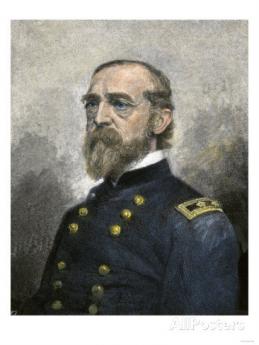
|
|
Union General George Gordon Meade |
General George Gordon Meade, the hero of Gettysburg, lived in quite an elegant house during the six years (1866-72) he was a Commissioner of Fairmount Park. The house (at 19th and Delancey) has "MEADE" carved over the stately entrance facing 19th Street, and while the neighborhood has run down somewhat, it was obviously once an imposing mansion. The house belonged to Mrs. Meade. From that, you might suppose that the General had married a rich woman, but that would be wrong.
When General Lee was advancing on Gettysburg, it was widely supposed that his goal was to conquer Philadelphia, the Arsenal of the North. The town was in a panic, built some forts on the Schuylkill to defend itself, and later lionized the hometown hero who had saved them. Mrs. Meade was living at the time in a modest little place, and the town fathers took up a collection to buy General Meade a proper house.
A delegation of officials traveled down to Virginia to present him with their gift of gratitude, but Meade would have none of it. He was only doing his duty, and could not consider for a moment accepting major gifts for his soldiering. No, he was very sorry, he had to decline.
So the delegation came home, all a fluster. Someone then had the idea of offering the house to Mrs. Meade. And when they visited her, she promptly said "Sure."
Money Bags
This little morality tale was told to me by two unrelated sources, one of whom was a staff aide to Wilbur Cohen, the author of the Medicare law. And the other was a high official of Pennsylvania Blue Shield, the appointed administrative agent for Medicare in Pennsylvania. Its relevance to the more recent SNAFU with Insurance Exchanges introducing the world to Obamacare should be fairly obvious.
After Lyndon Johnson rammed the Medicare amendment to the Social Security Act through Congress in 1965, he wasn't shy about drawing attention to it. The press was present in great numbers, with staff officials who had a role in crafting the document, members of Congress, and anyone else who was standing around. The legislation was laid before him and signed with twenty different pens to be presented as mementos to the in-group. Each pen was only used to inscribe about half of one letter of his name, so it was a slow but joyful process. As intended, it got lots and lots of publicity.
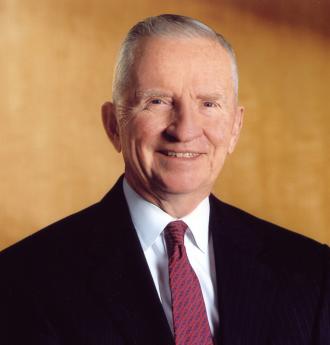 > >
|
| H. Ross Perot |
So, thousands of thankful old folks saw the ceremony on television, though they heard that the law was in effect immediately, and proceeded to dump their medical bills into a shoe box, sending them to Medicare to be paid. Unfortunately, Medicare didn't have an office, a staff, or even a telephone number. These things take time. As fast as they could, the Medicare staff constructed a system of carriers and intermediaries, carriers for part A, and intermediaries for part B. And almost without exception, appointed the local Blue Cross and Blue Shield organizations to be the carriers and intermediaries. Consequently, the organization of Medicare was patterned closely after the organization of the two administrative corporations. Meanwhile, the bills from old folks just kept pouring in through the postal service. It was about all the staff in Washington could do, just to direct the mail out to the local intermediaries and at least get it out of their hair.
Less than a year later, that's how the claims manage to Camp Hill, PA, a little suburban town near Harrisburg. In desperation, Blue Shield had rented a local vacant supermarket and piled the mailbags ten feet high. There were quite a few telephone calls of inquiry, and the old folks were politely told the matter was being looked into. It was beginning to look as though one supermarket wasn't big enough.
Computers were, of course, rented from IBM, who had a policy of renting, not selling, its valuable equipment. Keypunch operators, computer operators were hired, air conditioning was installed, and one team after another of computer programmers was hired -- and fired. Consultants were called, scratched their heads, sent big consultation bills, and turned sadly away. Sorry, but somehow it just doesn't work.
So that's how it happened that one Friday afternoon, a vice-president of Texas Blue Cross named H. Ross Perot came in, accompanied by a fellow with glasses so thick they looked like the bottom of Coca Cola bottles. So far as anyone can remember, the guy with coke-bottle glasses never said one word. The desperate, hopeless mess was explained to Perot, whose salary at that time was rumored to be twenty-five thousand dollars a year, about right for a Blue Cross executive. His background as a kindred Blue Cross person inspired confidence, and the conversation rambled on for an hour or so. Meanwhile, the guy with coke bottles went over to the Penn-Harris Hotel across the street and got to work. By the end of the weekend, he had come back a couple of times, but eventually, would you believe, it really, well it really worked. Contracts were quickly signed, the wheels began to turn, the mailbags in the supermarket began to march through the processing cycle. Blue Shield, the Medicare program, the finances of the nation's elderly, and Lyndon Johnson's reputation -- were all rescued.
As everyone now knows, the Medicare processing contracts made Ross Perot into a billionaire, living on Bermuda in the lap of luxury, eventually upsetting the re-election hopes of George Bush, senior by running for President himself on a third party ticket that had something or other to do with giant sucking sounds. A Congressional investigating committee looked into the outrageous profits Perot had extracted from his homeland's elderly, volleyed and thundered. Whether Perot actually thumbed his nose at them is doubtful, but he certainly was in a position to do so.
Meanwhile, whatever happened to that guy with the coke bottle glasses, no one seems to know.
Mister Roberts
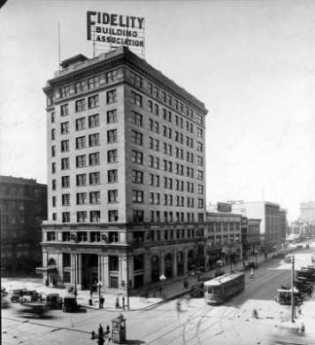
|
| Fidelity Building |
The Fidelity Building on Broad Street, now bearing the name of a successor bank, has its own ZIP code. It houses bank offices in one of its two towers and a general office building in the other. The top floor, the 29th, was originally the executive suite of the bank, with executive dining rooms, and lesser dining rooms where big deals were dealt. As an economy move, the executive floor eventually became a mid-day luncheon club, and right now it houses the law library of Montgomery, McCracken, and Rhoads. It carries the name of the law firm's most famous partner, Associate Justice of the United States Supreme Court, Owen Roberts. In the center of the hushed library, a single volume sits on a table, held in place by two very heavy bookends. It's the bound 1955 volume of the University of Pennsylvania Law Review, with a small green tab attached where a hundred pages of testimonials to Roberts are found. The tabbed page itself begins an essay by Felix Frankfurter, written in prose so elegant it seems like poetry. His topic is the mind of Justice Roberts at the time he switched sides in the 1936 Roosevelt Supreme Court packing episode, the famous "switch in time, which saved Nine."
Frankfurter and Roberts sat on the Supreme Court together for years, but the events in question took place before Frankfurter was appointed. Like the rest of us he has to conjecture what was in Roberts' mind. Felix Frankfurter offers two pieces of special evidence, his long personal observation of Roberts' character, and a private memo. Roberts had written in the memo that he had been ready to switch for Roosevelt before the court-packing proposal was made, but held off taking the step for several months because Justice Harlan Stone was absent for medical reasons. Stone, later elevated by Roosevelt to Chief Justice, was known to favor Roosevelt's New Deal proposals, particularly the Minimum Wage, which were central to the Constitutional question: whether the federal government had a right to go beyond regulating interstate commerce, to regulating all commerce. Frankfurter concludes that Roberts did not make the switch in response to Roosevelt's threats, because he had already decided to act before the threat was made to enlarge the court until it contained a majority in favor. Not only had Roberts decided to switch before the Presidential threat was made, but he also proved to be a courageous and highly moral person throughout the later years when he and Frankfurter were closely associated.
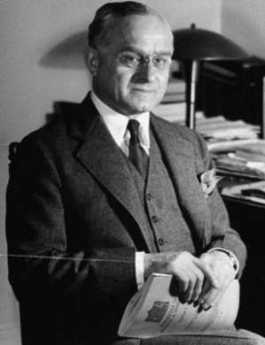
|
| Frank Furter |
Unfortunately, Frankfurter's 1955 eulogy has not convinced historical opinion. After all, there were dozens of people on the inside of the Supreme Court and the Presidential Administration who knew Roberts better than Frankfurter did and probably talked about nothing else for weeks. Up until the fateful decision, almost all of Roberts' close friends had been on the other side of the issue and felt entitled to some sort of explanation if not an apology. Washington is simply crawling with reporters whose job it is to search out gossip and hearsay. When an opinion emerges from such a cauldron and survives for seventy years, it has substance. The prevailing view is that Roberts felt the Judicial Branch of government was in jeopardy, and that someone must sacrifice himself in the crisis. Roosevelt had just been re-elected in a landslide, the new Congress would surely do anything he asked, the nation was in the depths of a horrendous economic depression for which Roosevelt was proposing the only conceivable Keynsean solution of increasing national liquidity through government spending. Roberts knew he would become a political pariah, but his duty seemed clear to him. It is merely a matter of phrasing whether his position was described as knuckling under to Roosevelts's threats, or throwing his body over Roosevelt's hand grenade.
With seventy years of retrospect, it all seems so pitiful. Public opinion and congressional action was in fact outraged at
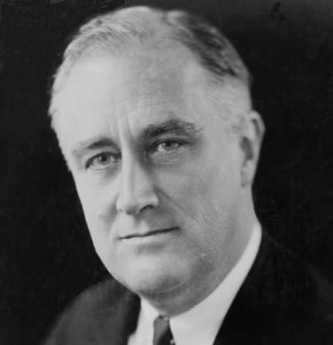
|
| Franklin Roosevelt |
Roosevelt, landslide or no landslide. Roberts and Stone had no need to do what Roosevelt asked. Any class in economics today can marshal a respectable argument against the wisdom of minimum wage laws, every class in law school is amazed and mostly appalled by their fresh reading of the Constitution's prohibition against Congress acting outside the limits of "commerce between the several states". On the level of governments rescuing their countries from depression by expanding liquidity, the experience has been that tax cuts usually succeed in that, while government spending usually does not. Paradoxically, the one principle to survive respectably from the 1936 political revolution was the movement toward national standards for internal trade and commerce, away from Balkanization. That's too big a step to take without public debate, perhaps, and highly disruptive if it's done in a single step. But the general idea is probably a sound one.
Poor Roberts probably never even considered that aspect. He was overwhelmed in his role as a Greek tragic hero, pursuing tragic inevitability.
Meschianza
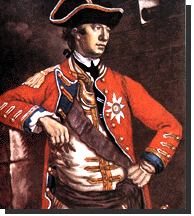
|
| General Howe |
The British under General Howe occupied Philadelphia for a little more than six months, withdrawing at the end of May 1778. Washington and his starving troops were shivering in the miserable encampment at Valley Forge that winter, and it is easy to imagine the British encircling, besieging or storming the encampment to put an end to the war then and there. Instead, Howe settled down in the enemy capital and had a merry time of it. Historians differ about the reasons for this puzzling behavior. On the one hand, Howe never did any campaigning in the winter if he could help it, somehow feeling that gentlemen soldiers had a right to revel, just as school children now feel they have a right to loaf in the summer. Perhaps there were practical military reasons to avoid winter campaigns, as well. However, it is also true that Howe had shown whig sympathies in the past, and very likely did feel that conciliation with the colonists was not only a possible but the best possible outcome of the dispute. If that was his idea, he was listening too much to the rich Tories in Philadelphia and not enough to the scowling artisan class, or to the solemn-faced Quakers. All winter long, the British soldiers revealed in theatricals and parties, apparently oblivious to the starvation nearby, or the appalled reactions of the sober Quakers to music, dancing, and ornamental dress. If Howe had any purpose to bedazzle the populace, he could not have put a better man in charge than his Lieutenant-General Major John Andre, whose thumb-in-your-eye attitude was defiantly underlined by his taking up Benjamin Franklin's own house as his pied a Terre.
Andre certainly cut a fine figure. It would be hard to say whether John Burgoyne or John Andre was the most dashing man in England, but it was surely one or the other. They both wrote plays and poetry of professional quality, designed costumes and scenery, and organized one extravaganza after another. They were both handsome in the eyes of ladies, and fearless soldiers in the eyes of men. Anything you can do, I can do better.
About the time Howe was replaced by General Henry Clinton and recalled to England, the position in Philadelphia began to look dangerous for the British. The French signed an alliance with the American Revolutionists earlier that spring, and the concern became a real one that the French fleet might blockade the mouth of Delaware and trap the British Army, stranded a hundred miles upriver from its own Navy. When Andre learned they were leaving, he saw they needed to have a celebration that would be remembered.

|
| Benedict Arnold |
Even today, the day-and-night revelry is indeed remembered. Andre wrote a detailed description for his local girlfriend Peggy Chew (the daughter of Pennsylvania's Chief Justice) that is really something to read. Made all the more pointed with our present hindsight that Peggy Chew was the best friend of the Peggy Shippen who married Benedict Arnold, the letter gives the celebration a made-up name, Meschianza. Sometimes spelled Mischianza, the derivation is loosely connected to the Italian word for Medley. It began with a regatta of costumed soldiers and local ladies on barges sailing slowly down the river accompanied by cannon fire, singing, and music. The main events of the week took place on the South Philadelphia plantation of Joseph Wharton, now called 5th and Wharton Streets. Horsemen of the British Army put on a Medieval tournament with jousting and whatever, dressed in white and pink satin, and hats of pink silk with white feathers on the brim. There were fireworks at night and banquets. Good wine, toasts, and laughter to witty remarks. The final high point was a fancy dress ball. Wow.
And then, the British moved across the river to New Jersey, and were gone.
REFERENCES
| Treacherous Beauty: Peggy Shippen, the Woman behind Benedict Arnold's Plot to Betray America: Mark Jacob:978-0762773886 | Amazon |
Mennonites: The Pennsylvania Swiss
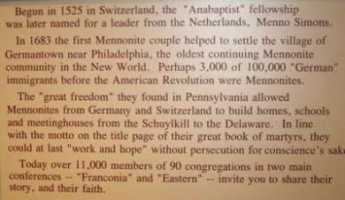
|
| On the Wall of the Mennonite Heritage Center |
Anabaptism, originally attributed to Ulrich Zwingli around 1525, centers around believing a baby is too young to understand baptism, so adults need to be re-baptized. The idea arose independently in Switzerland and Holland, and probably thousands of believers were unmercifully martyred for holding the belief. Because the worst persecutions took place during the War of Austrian Succession (1740-50), they are often attributed to the Roman Catholic Inquisition, but Magisterial Protestants, believing in the separation of church and state, were often also responsible. Many seemingly unrelated issues were introduced locally, and this period of unrest is known as the French and Indian War in America; its major battle took place in Louisburg, Nova Scotia, although George Washington's skirmish around Fort Duquesne (Pittsburgh) has acquired local fame as a major American manifestation.
The Swiss adherents moved to the Rhineland Palatinate, and from there were among the first to accept William Penn's offer of religious freedom. They were the settlers of Germantown, but have mainly moved a few miles west to southern Montgomery County, where the confusion about Pennsylvania Dutchmen is further confounded by the fact that they were Swiss. Menno the Dutchman gave his name to the order, but they themselves regard their true ethnic background as Swiss from the Zurich region. That, by the way, is not to be confused with Calvinism, which also comes from Switzerland, but by way of Geneva, not Zurich. The pacifism of the Mennonites made them mutually attractive with the English Quakers, who had made an appearance fifty or so years later in the region around Manchester, England; each group seems to have adopted some of the features of the other.

|
| Franconia Mennonite Meetinghouse |
Determined use of the German language has always held the Mennonites apart, however. From the start, it was really necessary to be somewhat bilingual in Montgomery County, using English for business conversation, and German at home and in the church. The idea of using a foreign language is based on the hope it would thus maintain a sense of distinctiveness or even remoteness from non-believers, without adopting the least hostility to them. It almost inevitably follows that the group has used its own schools, attached to their meeting houses. This sense of remoteness has persisted for almost four hundred years, surrounded by entirely different cultures. Starting only around 1960, this attitude has gradually softened, however, and it is widely assumed that in another few decades Mennonites will come to resemble the people in their environment a great deal more than they do at present. If you want to know where to find them, Harleysville is a good place to start. As the tinge of Pennsylvania Dutch accent gradually fades, and fewer of them wear the old costumes, a curious remaining hallmark of their presence can be noticed: an avoidance of foundation planting around their houses. The Mennonites themselves seem to be entirely oblivious to this unintended distinctiveness, which is however quite striking to non-Mennonite passers-by. Those who work in the fields all day have little interest in digging around their houses for decoration; those who have moved away from farming have seemingly adopted the bush-less style as a natural way of arranging things. There's no particular reason to change it, and so, there's no particular reason to notice it.
Marcellus Shale Gas: Good Thing or Bad?

|
| Marcellus Shale |
Soon after discovering widespread hard and soft coal, Pennsylvania found in Bradford County it also had oil. Local oil was particularly "sweet", with a low sulfur content. Long after much cheaper oil (cheaper to extract, that is) was found in Texas and Arabia, Pennsylvania oil was prized for the special purpose of lubricating engines, which commanded a higher price. This discovery of oil in the western part of the state also provided a vital competitive advantage for local railroads. Other east-west railroads like the New York Central and the Baltimore and Ohio lacked a dependable return cargo like this, so the Pennsylvania Railroad lowered prices and became the main line to the west for a century. Refineries were built in Philadelphia, and continue to dominate Atlantic coast gasoline production, even though the source of crude oil is mostly from Africa. When oil and coal declined in use, Pennsylvania's industrial mightiness declined, too. Philadelphia and Pittsburgh lost much of their competitive advantage, while the center of the state just about went to sleep. When even Texas oil later ran low, America's industry turned to computer-improved productivity to keep its prices competitive, helping California at the expense of Pennsylvania. The bleakness for Pennsylvania may not last, however. Suddenly, we discover we have another enormous source of cheap energy, shale gas.
It's rather deep, however, even deeper than our supply of fresh water. The next layer below surface minerals is porous rock filled with fresh water, the so-called aquifer. Gas bearing shale is layered just under the aquifer. We'll return to the aquifer later.
There is and will be abundant oil in the world, well into the future; but cheap oil has been selectively depleted. When military and economically weak nations like the Persian Gulf had cheap oil, only transportation costs were irksome. But now Russia is emerging as an oil-rich state, previously impoverished states like Iran are asserting themselves, the existence of an international oil cartel becomes more threatening because it reinforces oil price with military threats. Raw material discoveries -- gold rushes -- are always destabilizing because they are tempting to the dictator mindset. That's known in the political literature as the source of the "Dutch Disease", not because Netherlanders are aggressive, but because North Sea oil discoveries destabilized the politics of even that little peaceful nation. America has now made a universal decision to establish energy independence. It once was credible to make predictions that in a decade or two, we would run out of competitively priced energy. To be both rich and weak invites aggression and we knew it.

|
| Gas Drilling |
There's little question America is profligate with its energy, so the need for energy conservation is undisputed. Actually, we are already five times more efficient with energy use than China is; furthermore, we have improved energy efficiency by 20% while China has defiantly worsened. We'll do better, but unfortunately, our immense investments in inefficient home heating and transportation are too costly to discard abruptly in both cases. There is also little question that American research and development of alternative energy sources has been neglected, while China is subsidizing R & D appreciably. In our frenzy, converting food into gasoline by subsidy is a bad joke, electric cars are subsidized and widely described as "Welfare buggies", wind power is twice as costly as carbon-sourced energy and needs better battery development to be able to store it, atomic energy has been encouraged by the French government, but totally held back by ours, in response to public anxieties. The long and the short of it is this: we face a fifteen-year period of doubtful energy sources, a vulnerability our international competitors and enemies might easily use against us.
And then along came shale gas, like a gleaming savior on a white horse. For seventy-five years, the world has known unlimited amounts of petrol carbons are locked into vast stores of shale. Unfortunately, it is buried deep, and located where it is expensive to transport to market. The techniques for extracting such carbons were unacceptably expensive in a world that shrugged off abundant oil. Politics and geology turned against us; we now need fifteen years of catch-up to make alternative energy sources more affordable. Cheap oil ran out before non-carbon sources became practical. But miraculously shale gas is now upon us, right here in Pennsylvania. It takes a long time to map out the existence of shale from Canada to Texas, when it is 8000 feet deep; it was first recognized in 1839 from a cliff outcrop around the little town of Marcellus, New York and vigorously explored in the disappointed hope it would lead to discoveries of bituminous coal, iron ore or other minerals. Land speculators have been roaming Pennsylvania for two centuries. Now, they are offering $5000 an acre plus royalties, just for the right to drill. In 2010, probably 5000 leases will be issued. Needless to say, the discovery is popular with local farmers, and "gas fever" has enormous political momentum. With techniques discovered around Fort Worth, Texas, about 10% of the existing gas can be extracted easily, serving America's energy needs for much of the 15 years required to make renewable, non-fossil, energy cheap and practical. This long history paradoxically accounts for the apparent suddenness of the current popularity; it's not a new mineral discovery, it is the development of practical extraction methodology at a critical political and marketing moment.

|
| Tree Hugger |
And equally needless to say, the environmental movement is being called to its barricades. Whatever is their objection to drilling for gas, 8000 feet below the surface of a wilderness? In the first place, just cutting roads through the forests is destructive to migrating and local bird populations. In a well-known process of "fragmentation", the cutting of roads allows an invasion of raccoons and similar bird predators. Forest fragmentation simply cannot be avoided if drilling rigs are to enter and leave the forests; some vulnerable bird species are bound to go extinct. This particular region is particularly prone to emissions of radon, which is a radioactive gas traveling along the stone layer and occasionally entering the basement of houses; will drilling through to the shale layer make radon seepage better or worse? Furthermore, since this sedimentary shale layer lies underneath the aquifer, drilling must go through the freshwater-bearing caverns before it gets to the shale; expensive sealing methods may be needed to keep the contaminants below from seeping up through and around the drill holes. The practice of fracturing the shale by high-pressure mixtures raises issues with water, sand, and chemicals. Water consumption is millions of gallons per year per well, seemingly enough to drain the rivers and creeks. Some operators will be tempted to use the aquifer as a surreptitious source of water, leading to consequences hard to anticipate. The sand is meant to support the walls of the rock fractures but may clog up other channels unintentionally. And the composition of the chemical drilling components is a trade secret which the extraction companies naturally wish to keep private; it's pretty hard to get public approval of a secret. So to sum it all up, there is a legitimate need to hurry the drilling, and there are legitimate environmental safety issues to be addressed, slowing it all down. New York State has passed laws prohibiting further drilling. Is that an opportunity for Pennsylvania, or a warning we should heed?

|
| Where's My Aquifer? |
This is a time for serious negotiation, and the spending of serious amounts of money on study and monitoring, not for shouting. Politicians sense you can't make omelets without breaking eggs. For them, it's a question whether to choose to be blamed for the inevitable problems of exploring new science, or whether to be blamed for lack of patriotism in a national emergency. The amount of heedless rhetoric is predictably extreme, and the money available to spin it is daunting. If there is anything resembling a middle road in this uproar, let's explore it. In the first place, some sensible discussion between scientists of both sides can be held immediately. Geologists are probably unaware of issues like forest fragmentation, while naturalists are probably unfamiliar with radon hazards and available drilling precautions. Some concerns are exaggerated, some are unsuspected; let's get the experts together quickly and establish most of the knowns and unknowns before popular media runs away with the issue. Let's get the responsible leaders of the gas extraction industry into continuous dialogue with the responsible leaders of environmental protection organizations, so wars they get dragged into are real and not hysterical. Let Congress consider the issue and appropriate funds immediately to study the issues everybody agrees need to be addressed. It seems very likely the huge corporations involved in this issue will rather easily agree among themselves on responsible positions unless they get rattled by overly vocal denunciations. Since this is a gold rush, however, it is also likely that underfunded small operators will start to employ short-cuts and rush heedlessly into dangerous territory; large operators will wish to have laws passed to restrain everybody, small operators will plead fairness. The more transparency this field has, the better. And the most immediately obvious area of resistance to transparency is the natural wish to protect trade secrets in the composition of drilling fluids. In time, the other continents of the world will develop satisfactory drilling fluids; the secret won't last long. The situation cries out for the large operators to negotiate among themselves so those who have an incentive to protect secrecy can tell us how to do it responsibly, while those with a political incentive to expose secrets can be offered time limits related to the how fast the rest of the world catches up. Politicians particularly need to be offered some mechanism for assuring the public about those secret injection ingredients.
Anyway, let's negotiate a way to take chances we have to take, but avoid the costly blunders of studying the issue to death. Hurry up, folks, it's a matter of time before problems have to be faced.
Madame Butterfly (2)
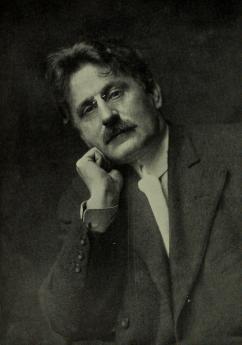
|
| John Luther Long |
There are two ways of looking at the love affair of Pinkerton, the dashing Philadelphia naval officer, and Madame Butterfly, the beautiful Japanese geisha. John Luther Long wrote about it one way, while Puccini somehow portrays it differently, even though Long collaborated on the Libretto of the opera. Puccini, of course, was himself a famous libertine, tending to follow the typical belief of such men that women somehow enjoy being victimized. Long in real life was a Philadelphia lawyer, trained to keep a straight face when people relate what messes they have got into. If you know the story, you can see Long in the person of Sharpless, the consul. Sharpless is definitely meant to be a Philadelphia name.
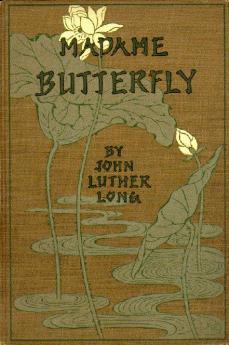
|
| Madame Butterfly |
Long was one of the early members of the Franklin Inn, and it is related he wrote much of his successful play at the tables of the club on Camac Street. David Belasco was the "play doctor" who knew how to make a good story fill theater seats. Even after Belasco's polishing, the play came through as a portrayal of the well-born gentleman who had been trained to regard foreign girls as just what you do when you are away from home. His real girlfriend, the beautiful Philadelphia aristocratic woman in a spotless white dress, was the sort you expected to marry. In just a few sentences of Long's play, this woman comes through as just about as distastefully aloof to foreign women as it is possible to be while remaining rigidly polite about it. Butterfly sees this at a glance, knows it for what it is, and knows it is her death. Her duty immediately is "To die honorably, when one can no longer live with honor".
It is Puccini's genius to take this story of how two nasty Americans destroy an honorable Japanese girl and using that same story with the same words, make it into a romantic woman being destroyed by a hopeless, helpless love affair. The power of the music overwhelms the story and sweeps you along to the ending. Even if you feel like Long/Sharpless, dismayed and disheartened by watching some close acquaintances doing things you know they shouldn't.
When Puccini's opera comes to Philadelphia every year or so, the Franklin Inn has a party for the cast, one of the great events of the Philadelphia intellectual scene. Somehow, the full intent of Luther Long's work never seems to come out.
That sounds pretty bad and should be a lesson to others. What Canada and a number of the individual United States got out of it was mainly this: if you lower corporation taxes, it causes prosperity. And so it might if politicians would do it gradually and moderately. Gradually and moderately are unfamiliar words in politics. Furthermore, there has long been a fundamental unfairness in taxing corporate profits twice -- once when the profits are made, and a second time when dividends are paid to shareholders. But it is obviously dangerous business, particularly when the governments involved are inexperienced. Canadians started talking about lowering their taxes to 16.5%, and no one could say whether that is a safe level or not. Within weeks, twenty-nine states with Republican governors were sending up trial balloons about joining this movement, and Governor Mitch Daniels of Indiana was much in demand as a consultant, and maybe a Presidential candidate, because Indiana had lowered corporate taxation some time ago, with favorable results.
This was exactly the sort of behavior James Madison had in mind when he designed the United States Constitution; it gave the people a way of disciplining overbearing state governments. Raise our taxes, and we will move. So there are strong arguments that these governors are approaching the right thing, and equally strong indications that everybody had better be plenty careful how this is approached.
The basic idea is good; double taxation should stop, and there is nothing in Madison's Constitution to prevent the Governors from doing what they say they would like to do. So how's this for a suggestion: if this movement gets started, let's take the opportunity to reduce all corporate income tax to zero. If everybody has the same zero rate, the incentive to migrate will disappear, and that's a good thing.
But if a major revenue source for the states disappears, what will take its place? At that moment of what would look like a crisis, it would be time for a national reconsideration and revision of the tax codes. And that would be an even more desirable outcome, provided it is done in an orderly and sensible way.
Look Out For That Ship!
 Tales of the Sea abound, even a hundred miles from the ocean. 
|
We are indebted to the President of the Maritime Law Association of the U.S., Richard W. Palmer, Esq. (who unfortunately died in March 2017 at the age of 97), for both a strange definition and an amusing story. An "allusion" is a collision between a ship and a stationary object, such as a bridge or a dock. As you might imagine, the ship is almost invariably at fault, mainly through errors of the pilot, although hurricanes and other severe weather conditions can make a difference. Moving ships have been running into stationary objects for many centuries, and almost every allision contingency has been explored. Ho hum for maritime law.
The Delair railroad drawbridge over the Delaware River at Frankford Junction is just a little different. It was built in 1896 when the Pennsylvania RR decided it needed to veer off from its North East Corridor to take people to Atlantic City. For reasons relating to the afterthought nature of the bridge, the tower for the drawbridge is located half a mile away, out of a direct vision of the ships going through. Also, a late development in the history of the river was the construction of U.S. Steel's Morristown plant, bringing unexpectedly huge ore boats from Labrador to the steel mill. The captains of the ships pretty much turned things over to the river pilots, for the last hundred miles of the trip.

|
| Delair Railroad Drawbridge |
Shortly after this iron ore service was begun, the inaugural ore boat Captain had a little party with some invited guests. So it happened that the Commandant of the Port, the Admiral in Charge of the Naval Yard, and other equally high ranking worthies like the head of the Coast Guard were on the bridge of the ore boat, taking careful notes of the procedure.
The ship tooted three times, the shore answered back with three toots. In real fact, they were connected by ship-to-shore telephone for most of the real business, but this grand occasion called for an authentic nautical ceremony. Three toots, we're approaching your bridge. Three toots back, come ahead, the coast is clear. The admirals scribbled it all down.
As the ship approached the point of no return, beyond which it could no longer stop or turn in time to avoid an "allusion", the people on the bridge were appalled to see a train crossing the bridge ahead. Several toots, loud profanity on the ship to shore phone.
No worry, answered the bridge, we'll lift the drawbridge in plenty of time. But half a minute later the bridge controller made the anguished cry that the drawbridge was apparently rusted and wouldn't open, to which the captain shouted, "This ship is going to take away your blankety-blank bridge and sail right through it".
At this point, the pilot took matters into his own hands, and violently threw the rudder hard left, swinging the ship sideways, soon nudging the bridge with some damage, but nothing like the damage of a head-on allision. The lawsuit, as one might imagine, was the outcome.
The attorneys for the railroad were pretty high-powered, too, and had piles of legal precedents to cite. But they were quite unprepared for Dick Palmer to put the Commandant of the Port on the witness stand, reading slowly and painfully from his very detailed notes about the conversations on the bridge, about the approaching drawbridge.
And so, Philadelphia can now claim to have experienced one of the very few instances where a ship ran into a bridge -- and the court found the bridge to be entirely at fault.
Loaves and Fishes

|
| Philadelphia Food Bank |
Philadelphia is full of people and institutions that have done wonderful things without a lot of fanfare and hype, butPhilabundance and its executive director, Bill Clark, surely set some sort of record. The organization has been in existence for twenty years and is generally known as a nice charity that gives surplus food to poor people. And how.
With a four-million dollar budget, they distribute food at a cost of about ten cents a meal. From that, you can easily calculate they are both efficient and big, very big. For a long time, they collected left-over food from restaurants and caterers and gave it to poor folks in shelters. But that was before someone had the brilliant idea to hire an executive director who had formerly been an executive in the supermarket business, rather than a dietician or a social worker or a retired lawyer. Nowadays, Philabundance still takes the calls from restaurants and caterers but refers them to some local food bank to do the pickup. And it doesn't distribute food to the poor itself, instead, it helps new churches get established in poverty regions, showing them how to organize and run food distribution agencies, or stores or kitchens.

|
| Philabundance |
Philabundance is going for big deliveries, and cutting the big costs in the food chain. Clark knew who was dumping the food, by the carload, and it wasn't restaurants. He organized a system of collecting bread from major bakeries, fruit from major importers, meat from the food distribution center -- in carload lots. Someone from inside the food distribution system knows how tightly organized the shelf life is, and if he can get bananas to his eaters in five days, he can have them free from people who absolutely must have eleven days to get them through a delivery chain of fussy people picking and choosing what is on display before they buy. In a market system where food is routinely discarded in order to maintain stable prices (ask any farmer), someone who knows what he is doing can really get some bargains for the poor. You have to know about taxes, too. Donations of food are not just deductible at cost, but at cost plus half of the normal mark-up. A great many of the cargo containers arrive at Philabundance warehouse, unopened because they arrived too late for the weekend buying rush, and would otherwise have to be sold at low Monday prices. There's a lot to learn about this business.
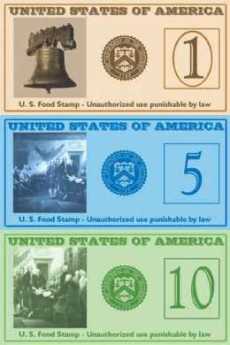
|
| Food stamps |
Food stamps might be a better way to distribute food to the poor, but big cities have an acute shortage of supermarkets, as you soon learn if you live there. New York has an extensive system of neighborhood mom and pop groceries, but Philadelphia doesn't. It's hard to know whether mom and pop stores can't survive in Philadelphia for some reason, or whether New York's notoriously political-legal system is slanted in favor of them, along with rent-controlled apartments on Park Avenue. Supermarkets in center city are hampered by the underlying supermarket the assumption that there will be ample place to park a car at both ends of the shopping trip. Since it is easy to pay $300 a month to park in center city, and even then you find the attendant may have parked someone else in the aisles, you can see that the supermarket idea, which largely developed in Philadelphia in the first place, is more popular in the suburbs.
So, anyway if you are going to throw food away you might as well give it to the poor and get a tax deduction. And if you are going to give food to the poor, you might as well be efficient about it. No doubt there will be some who raise the point that making things free for the poor will attract more of them into the region, raising Medicaid costs and so on. Maybe that's why Bill Clark draws so little attention to the splendid job he is doing, but if so, we really must betray him.
Lewis Harlow van Dusen, Jr. (1910-2004)
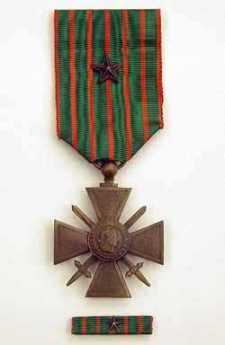
|
| Croix de Guerre |
Lew van Dusen was one of the great story-tellers of a story-telling city. In one continuous lunch conversation he could string together personal anecdotes about Lloyd George, Lawrence of Arabia, William Bingham, the making of the hydrogen bomb, the Croix de Guerre (which he had been awarded), Nicholas Murray Butler, several Supreme Court Justices, Harvard Law School (where he led the class), and on and on until the waitress would just go ahead and clear the table. He even told of his own great suffering as a boy sitting at proper Philadelphia dinners, where it was a firm rule that acceptable topics of conversation were limited to the Wimbledon lawn tennis matches and the sinking of the Titanic.
When the landmark U.S. Supreme Court case of State Oil v. Kahn came up for arguments, he and I rode together on the Metroliner down to Washington, stayed at a club there, and after the hearing took the train back to Philadelphia. During the entire time, Lew never stopped talking, and his voice was very loud. There was the time in Macao when a retired British diplomat came up to him and said he knew the history of every gravestone in the cemetery for foreigners, except five, and two of those names were on the letterhead of Lew's firm (Drinker, Biddle and Reath). Drinker, it turns out, was American consul and discovered that all of his guests were poisoned by the cook. He traveled all night, getting stomachs pumped out, but not his own, and died the next morning from the poison. Biddle, on the other hand, was also a physician interested in Yellow Fever and died of it when he contracted the disease from one of the subjects.
There was the time when he was the young guest of Nicholas Murray Butler at a luncheon with British Prime Minister Lloyd George. "Tell Mr. Roosevelt," said George, "That Social Security is nothing but a dole."
And the time when King George gave everybody the day off on his 25th Anniversary as King, so they played cricket. His teammate was Lawrence of Arabia, and after the game, Lawrence hopped on his motorcycle and rode off down the road to be killed. Lew was the last person to see Lawrence alive.
Well, when you get to the Supreme Court, the public stands in line on the steps, out in the rain. But the lawyers go around to the back door, where there are a lounge and a lunchroom. Inside two minutes, Lew was surrounded by lawyers as he told more stories. One of them tugged my sleeve and asked, "Is that who I think it is?" I said I supposed so, although who he had in mind is still a mystery to me.
State Oil turns out to have been as important to antitrust law as we supposed it would be; the fine points of vertical integration were afterward explained to me. And finally, I was told how, when he was chairman of the Ethics committee of the American Bar Association, Lew's committee caused the ABA to reverse its long-standing opposition to cameras and audio equipment in courtrooms. The effect of this has been slow, but gradually courts are permitting the televising of trials, and eventually they probably all will permit it. But not yet the U.S. Supreme Court. Non-lawyers still stand in the rain outside, and if there are no seats left inside, too bad.
Lawn Tennis at the Cricket Club
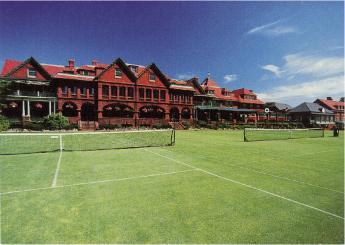
|
| Merion Cricket Club |
Lawn tennis isn't terribly ancient, having originated in England around 1880 as a variation of badminton which was brought back from India during the days of the British Empire. As the name suggests, it was originally played exclusively on grass courts, which proved hard to maintain. It was supplanted for a while by clay courts, and more recently by hard and artificial surfaces. Lawn tennis on lawns has largely become a game for the rich because of the cost and difficulty of maintaining a playable surface in hot weather.
If you wander into the Merion Cricket Club you'll find lawn tennis in the grand style, viewed from luncheon tables under a roofed porch. The long relatively narrow porch is right up against the grass courts, but it's also sort of a Peacock alley where well-groomed young ladies show their stuff, and everybody at the tables wishes to seem to know everyone else. There are times when the athletic entertainment becomes cricket out there on the field beyond the porch, but a larger proportion of the lunchers turn their backs on the field during that season than when exciting tennis championships are reaching the finals.

|
| "Lawn" Tennis |
In addition to being more expensive to maintain the courts, tennis on the grass is a different game from tennis on a hard surface, like clay or asphalt. The ball tends to skid when it hits the grass, so it is more effective to volley it before it hits or before it takes much of a bounce. The bounce tends to be more nearly straight up, while on harder surfaces the ball bounces at a low angle. Either way, the consequence is a tendency for a faster game on grass. The players run harder to get the ball at the bounce, and the advantage goes to those who serve hard and return the ball hard -- and fast.
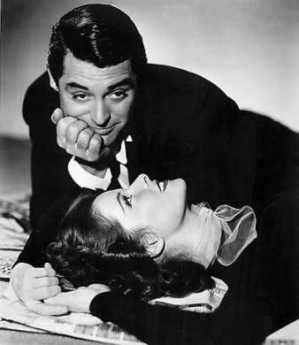
|
| Cary Grant and Kathryn Hepburn |
The rather special nature of the game adds to the up-scale atmosphere. And makes it just as attractive for the Kitty Foyles at the tables, as for the Kathryn Hepburns, both of whom have their own attractions for the Cary Grants. The parking lot is also a good place to form an opinion about the latest in high-priced autos.
www.Philadelphia-Reflections.com/blog/1494.htm
Laundered Money
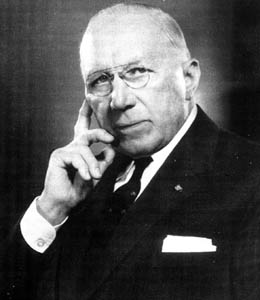
|
| Judge Edwin O. Lewis |
Judge Edwin O. Lewis finally got his way, the Pennsylvania State Government acquired four blocks of Chestnut Street stretching to the East of Independence Hall, and the Federal Government acquired four blocks stretching to the North. Judge Lewis was determined that a real revival of historic Philadelphia required the clearance of a lot of lands. Those who heard him describe it will remember the emphasis, "It must be BIG if it is to serve its purpose."
The open land is rapidly filling in but for a time the movers and shaker of this town had to scratch a little to find something to put there. That's fundamentally why the historic district has a Mint, a Federal Reserve, a Court Houses, a Jail, and a big Federal Building to house various local offices of the landlord, the federal government. It's where you go to visit your congressman, or to renew your passport, or to argue with the Internal Revenue Service. If you have certain kinds of business, there's an office for the FBI and the U.S. Secret Service. The mission of the Secret Service is a little hard to explain with logic.
The Secret Service is a federal police organization, charged with protecting the President of the United States, and enforcing the laws against counterfeiting money. In unguarded moments, the Secret Service officers will tell you they only have one function: to guard three-dollar bills. The President only comes to town from time to time, but the mandate extends to the President's family, and to the extended family of official candidates for election to that office. So, there is usually always a certain amount of activity relating to running behind limousines with one hand on the fender, or poking around rooftops near the speaker's platform at Independence Hall, or talking apparently to a blank wall, using the microphones hidden in their ear canals. The rest of the time is taken up with counterfeiters, but even then the excitement is only occasional, depending on business.
A few years ago, the buzz around the office was that some very good, even exceptionally good, fake hundred dollar bills were in circulation in our neighborhood. The official stance of The Service is that all counterfeits are of very poor quality, easily detected and no threat to the conduct of trade. Unfortunately, some counterfeits are of very good quality, not easily detected, and when that happens, The Service is made to feel a strong sense of urgency by its employers. These particular hundred dollar fakes were of very good quality.
One evening, a call came in. Don't ask me who I am, don't ask me why I am calling. But I can tell you that a very large bag of hundred dollar wallpaper has just been tossed over the side of the Burlington Bristol Bridge, near the Southside on the Jersey end. Goodbye.
Very soon indeed, boats, divers, searchlights, ropes, and hooks discovered that it was true. A pillowcase stuffed with hundred dollar wallpaper of the highest quality was pulled out of the river. By the time the swag was located and spread out for inspection, it was clear that several million dollars were represented, but they were soaked through and through. Most of the jubilant crew were sent home at midnight, and two officers were detailed to count the money and turn it in by 7 AM. The strict rule about these things is that all of the money confiscated in a "raid" was to be counted to the last penny before it could be turned over to the day shift and the last officers could go home to bed. After an hour or so, it was clear that counting millions of dollars of soggy wet sticky paper was just not possible by the deadline. So, partly exhilarated by the successful treasure hunt, and partly exhausted by lack of sleep, the counters began to struggle with their problem. One of them had the idea: there was an all-night laundromat in Pennsauken. Why not put the bills in the automatic drier, so they could be more easily handled and counted? Away we go.

|
| Burlington Bristol Bridge |
At four in the morning, there aren't very many people in a public laundromat, but there was one. A little old lady was doing her wash in the first machine by the door. It was a long narrow place, and the two officers took their bag of soggy paper past the old lady, and down to the very last drying machine on the end. Stuffed the bills into the machine, slammed the door, and turned it on. Most people don't know what happens when you put counterfeit money in a drier, but what happens is they swell up and sort of explode with a terribly loud noise. The machine becomes unbalanced, and the vibration makes even more noise. The little old lady came to the back of the laundromat to see what was going on.
As soon as she got close, she could see hundred dollar bills plastered against the window, and that was all she stopped to see. She headed for the pay telephone near the front of the door. The secret Servicemen followed quickly with waving of hands and earnest explanations, but within minutes there were sirens and flashing lights on the roof of the Pennsauken Police car. Out came wallets and badges, everyone shouting at once, and then everything calmed down as the bewildered local cop was made to understand the huge social distance between a municipal night patrolman and Officers of the U.S. Secret Service. Now, he quickly became a participant in the great adventure and was delegated the job of finding something to do with armloads of (newly dried) counterfeit hundred dollar bills. He had an idea: the local supermarket was also open all night, and they carried plastic garbage bags for sale. Just the thing. But who was going to pay the supermarket for the bags? Immediately, everyone was thinking the same thing.
Fortunately for law and order, the one who first suggested the the obvious idea of passing one the counterfeits was the little old lady. At that, everyone came to his senses. Wouldn't do at all, quite unthinkable. The local cop was sent off for the bags, relying on his ability to persuade the supermarket clerk. And, yes, they did get the money all counted by 7 A.M.
La Cosa Nostra Has an Apalachin Outing
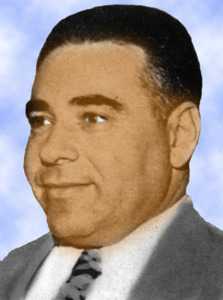
|
| Joseph Barbara |
It's hard to convince people of something they don't want to believe; others are simply determined to deny they already know it. In any event, prior to 1957, it was vigorously denied by many Americans of Italian descent that there was any such thing as organized crime, The Mob, The Mafia, or La Cosa Nostra. One of the pieces of evidence for regarding organized crime as just an anti-Italian slander was the consistent denial by the head of the F.B.I. J. Edgar Hoover that a national crime syndicate existed. Just why Hoover took this strange position will have to be left to future historians. But even J. Edgar Hoover couldn't deny it after November 14, 1957, when New York State Police surrounded a hundred mob bigwigs, lieutenants, and bodyguards at Apalachin, NY.
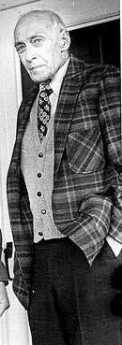
|
| Sgt Edgar Croswell |
New York State troopers always kept a watchful eye on a fifty-acre estate belonging to Joseph Barbara the reputed boss of Central Pennsylvania crime, located just within New York state borders; it is not necessary to invent a feud with one trooper, or insist that some disgruntled criminal tipped him off. When all local motels were suddenly booked up, and dozens of expensive automobiles with out-of-state licenses could be seen parked in the estate, it was only prudent to check the license numbers. When the report came back that most of the cars belonged to persons suspected of leadership in organized crime, it was reasonable to establish roadblocks around the estate, just in case. And then, after a car sped in past the roadblocks, soon followed in reverse by dozens of adult males fleeing in suits into the surrounding woods, it was natural enough to pick them up for questioning. It's estimated that fifty of them got away, but 58 mob bosses, henchmen, and bodyguards were caught and indicted. Everybody, it seems, had heard that Joseph Barbara was feeling unwell, and they had come to inquire after his health. Local lore has it that for years, wallets filled with hundred dollar bills were to be found tossed into the nearby underbrush.
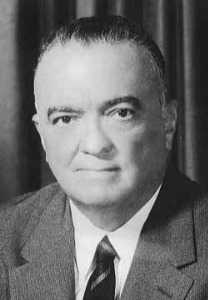
|
| J. Edgar Hoover |
A great deal has been said and written about what was really going on, although a lot of it is probably deliberate misinformation, and some of the rest is couched in "weasel words" intended as some sort of code. The present general opinion is that the old-style Sicilian Mafia had engaged in a war for several years with upstart "Liberals" and that this meeting was intended as a peace treaty of the "Crime Commission", for which some crime bigwigs from Italy had been imported as referees. Grander visions, including the extension of crime syndicates into Cuba, Las Vegas, and California were on the agenda but were not the primary agenda. It was rumored that Angelo Bruno of Philadelphia had been newly appointed to the Commission, and was leaning toward favoring the "Liberal" faction. Such a disruption of leadership as the Apalachin round-up naturally resulted in a large number of assassinations, imprisonments, novels, and movies. This was the final, undeniable, outing of organized crime. The mob was finally turning away from the giddy days of prohibition rum-running, toward more modern entertainments like recreational drugs, gambling, and loan sharking. The Sicilians were losing control to Italians and Jews. The public was going to movies and reading books; it was becoming inevitable that the "goddam innocent bystanders" and other do-gooders were going to demand that this sort of invisible empire simply had to be curbed

|
| Joseph Barbara's Place |
Just why Apalachin was selected is debatable. It's visible from the Interstate Highway, and state roads run by the estate. It's quite close to the Susquehanna River, for whatever value that might have to organized crime. It's, therefore, both private and remote, as well as within a couple of hours easy drive to most East coast cities. And its back road runs straight to Hazelton, which might seem a more natural place for the boss to live, except that Apalachin was just over the state line for legal purposes. The verbal history circulated within knowledgable circles is that the Mafia started in Sicily in response to resistance to Italian authorities, especially Garibaldi. When it got to be time to move, they first went to New Orleans. Unable to cope with the Ku Klux Klan, however, the pilgrims split into two main movements. One went to South Philadelphia, and the other went to Hazelton. After that, the links to New York, Chicago, and Las Vegas are obscure.
So, Apalchin is worth a drive-by. Those who are timid can get a fairly good idea from Google Earth.
Killer Instinct
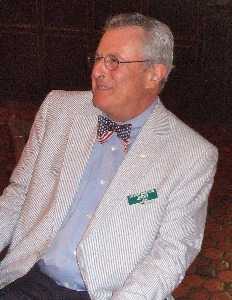
|
| Jerry Leon |
Once every year or two, a speaker at the Right Angle Club fails to show up. That happened recently, and as usually happens, one of the members stood right up to the microphone and gave an impromptu speech. The volunteer was Jerry Leon, who surprised us all by announcing he spent thirteen years in the Marines as a fighter pilot on aircraft carriers. You would never guess that from his behavior as a successful businessman, and to some extent that was his whole point.
In the first place, he volunteered as a Marine during the Korean War, and worked his way through boot camp and all that, until one day an officer brought them all to attention, asking for volunteers to fly airplanes. After flight training school, he might have flown air freight or eight-engine bombers, but he volunteered to fly fighter planes off the deck of an aircraft carrier. In those days, the carrier plane was fired by a steam driven catapult off the flight deck like a projectile. You go from zero speed to two hundred miles an hour in two or three seconds; the experience is arresting. After he recovers his wits, the pilot is expected to take sole control of the plane, fly around the carrier a few times, and then land the plane on the postage stamp flight deck. Fighter planes come in at a lower altitude than commercial aircraft, and steeper, and faster. The tailhook catches one of the three wires across the deck, and then the plane jolts to a stop. Or not, in which case the pilot must retake immediate control, take off at full speed, circle the carrier, and try it again. That's hard enough on a calm sea, but the Navy never stops for rough weather, so at night in rough seas, you have to do it in the dark with the ship rising, falling, pitching and yawing, right or left in three dimensions. That's somewhat harder. There are usually four planes in the air at any one time, all doing the same thing every ninety seconds, and if the plane runs off the end of the landing strip the pilot must remember to eject before he goes down with the plane. This whole process must be repeated six times in one day with only one aborted landing, in order to qualify for carrier duty. Saying nothing of the sudden bumps and jolts, the process of qualifying is pretty hard on the sphincters, it's pure terror no matter who you are. Like stage fright for an actor, crash landing does seem easier with practice but having done it seven hundred times, Jerry still wasn't able to do it calmly.

|
| P40 War Hawk |
Unusually good eye/hand coordination is something you are born with, and baseball seems to require the same ability. Ted Williams, the famous .400 hitter for the Boston Red Sox, was an outstanding fighter pilot, and many less famous professional baseball players have also gravitated to the role. To be called a fighter ace a pilot must have shot down five enemy planes, and one pilot became a fighter ace at the Battle of Midway on his first mission. Because of his lack of experience, this pilot was only detailed to hunt for the battleship Yamamoto, but he found it, radioed its location, and on the return flight ran into 30 enemy planes. Tearing into them alone, he shot down five, becoming an ace before he returned to the carrier deck from his first mission. Now there's the killer instinct with eye/hand coordination, the combination which seems to make you an ace. He wasn't alone in these qualities, although 30% of the pilots do seem to account for 90% of the victories. In those days "between W-2 and Korea" the American pilots were flying propeller planes, while the Chinese pilots were flying jets, and even the Germans were flying some jet-powered Messerschmidts. That's five hundred miles an hour versus seven hundred, and the enemy planes would often swoop past in a whoosh. So, the Americans developed a technique. When the jet came up on your tail, you pulled back as hard as you could with all flaps down. The enemy jet pilot had to pull up his nose, flew over the top of the propeller-driven American, and then was blasted out of the air by the prop plane now waiting for him from behind. They say it worked every time, but of course, it only worked for the pilots who came back to talk about it. A former pilot with Chenault once told the story of letting go with fifty-caliber machine guns into the tail of a Zero, causing the Zero and its pilot to vanish into a puff of smoke and debris. Of course, the prop plane then just flew through the cloud.
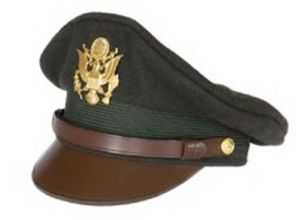
|
| Pilot's Hat |
The fly-boys were of course chased by hordes of women, particularly in the bars around the training school in Pensacola. They drank hard, at reckless heedless parties; it was reported that Australian pilots even had two or three drinks before taking off, but our Navy strictly policed going that far. Nobody saved any money, nobody cared one whit about being promoted or demoted. Getting to be an Admiral was something that attracted what were disdainfully referred to as "politicians". And nobody bragged about his exploits, even to friends and family. What mattered was that word of mouth had carried your exploits to your buddies. The senior George Bush flew a bomber not a fighter plane, but he played baseball like an angel, and you never heard him boast of his adventures; that's a fair approximation of the personality type, although George Bush was unusually tall for a pilot, and clearly better bred. If you can't guess what he thought of Bill Clinton and Ross Perot, it isn't necessary to relate it here.
Somehow, feminist women intruded themselves into this fraternity, and some who seemed well-qualified got hustled along through token promotions. But few women have the real killer instinct, and just getting equal opportunity won't get you through those six gut-wrenching flights in a carrier qualification. Thirteen women pilots were killed in qualification flights before the Secretary of the Navy intervened and put a stop to it. To new entrants from a previously shunned group, achieving the same status as men is a form of promotion, and lusting for promotion is despised by natural-born fighter pilots. It's sort of a Catch-22 situation. What killers want, is to excel at things that are viciously dangerous, getting the esteem of others who tried to do as much and maybe failed; like tournament golf, in this game, you are really playing against yourself. And so this Greek tragedy finally came to a confused pause with the famous Tailgate party incident. To preserve appearances and rescue The Service from the press corps, the Navy brass was shocked, shocked, to discover what was going on. Women weren't being respected if you can believe such a thing of fly-boys.
"Hey, fellas, c'mon. Do you want to win this war or don't you? Professional killers have been behaving like this for centuries. And because you come along, we've got to change and do things your way?"
July 4, 1776: Patients in the Pennsylvania Hospital on Independence Day
According to the records of the Pennsylvania Hospital, the following 48 persons were patients in the hospital on July 4, 1776:
| Richard Brinkinshire (Admitted 11/15/1775) | John Ridgeway (Admitted 12/26/1775) |
| James Chartier (Admitted 1/6/1776) | patient (Admitted 1/6/1776) |
| patient (Admitted 1/20/1776) | patient (Admitted 1/20/1776) |
| Mary Yell (Admitted 2/7/1776l) | John Beckworth (Admitted 2/7/1776) |
| Bart. McCarty (Admitted 2/10/1776) | John King (Admitted 2/10/1776) |
| Robert Alden (Admitted 2/17/1776) | William Patterson (Admitted 3/6/1776) |
| Elizabeth Hanna (Admitted 3/9/1776) | John McMahon (Admitted 3/13/1776) |
| Mary Burgess (Admitted 3/23/1776) | Mary Anderson (Admitted 4/10/1776) |
| John Hatfield (Admitted 4/15/1776) | Eliza Haighn (Admitted 4/17/1776) |
| Charles Whitford (Admitted 4/24/1776) | patient (Admitted 5/8/1776) |
| Susanna Carrington (Admitted 5/8/1776) | patient (Admitted 5/8/1776) |
| William Johnson (Admitted 5/13/1776) | Lazarus Chesterfield (Admitted 5/22/1776) |
| Mary Spieckel (Admitted 5/22/1776l) | William Edwards (Admitted 5/22/1776) |
| patient (Admitted 5/23/1776, Lunatic) | Jane White (Admitted 5/25/1776) |
| Charles McGillop (Admitted 5/29/1776) | ---Fitzgerald (Admitted 6/1/1776) |
| Michael Rowe (Admitted 6/6/1776) | patient (Admitted 6/6/1776) |
| John Hughes (Admitted 6/12/1776) | Joseph Smith (Admitted 6/15/1776) |
| Esther Munro Lunda (Admitted 6/15/1776) | Mathew Coope (Admitted 6/19/1776) |
| Anne Patterson (Admitted 6/19/1776) | Thomas Savoury (Admitted 6/20/1776) |
| Rebecca Winter (Admitted 6/26/1776) | Elizabeth Manning (Admitted 6/26/1776) |
| Negro (Admitted 6/24/1776) | Elex. Scanvay (Admitted 6/24/1776) |
| Fanny Stewart (Admitted 6/24/1776) | Peter Barber (Admitted 6/29/1776) |
| Catherine Campbell (Admitted 6/29/1776) | Ann McGlauklin (Admitted 7/3/1776) |
| Elizabeth Lindsay (Admitted 7/3/1776) | Ann Jones (Admitted 7/3/1776) |
The records indicate the following diseases were the reason for admission of those patients. Although in Colonial times there was no medical delicacy to avoid offending readers, present privacy standards require that we strip the diagnoses from the name of the patient and list them independently. There is some overlap, sometimes making it difficult to judge which disorder caused the admission.
- Sore, poisoned or ulcerated legs: 16 cases
- Lunacy, mind or head disorders: 10 cases
- Syphilis: 7 cases
- Fever and Rheumatic fever: 7 cases
- Dropsy: 5 cases
- Gunshot: 4 cases
- Diabetes: 1
- Blindness with clear pupil: 1
- Spitting blood: 1 case
- Dislocated arm: 1 case
- Inflammation of face: 1 case
- Scurvy: 1 case
- broken arm: 1 case
The following physicians were elected at the Managers Meeting dated 5/13/1776:
- Dr. Thomas Bond
- Dr. Thomas Cadwalader
- Dr. John Redman
- Dr. William Shippen
- Dr. Adam Kuhn
- Dr. John Morgan
John Head, His Book of Account, 1718-1753
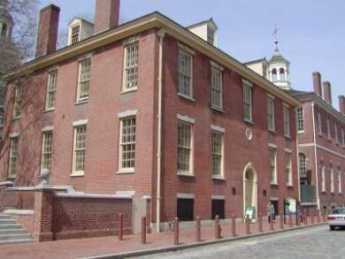
|
| American Philosophical Society |
Jay Robert Stiefel of of the Friends Advisory Board to the Library of the American Philosophical Society entertained the Right Angle Club at lunch recently, and among other things managed a brilliant demonstration of what real scholarship can accomplish. It's hard to imagine why the Vaux family, who lived on the grounds of what is now the Chestnut Hill Hospital and occasionally rode in Bentleys to the local train station, would keep a book of receipts of their cabinet maker ancestor for nearly three hundred years. But they did, and it's even harder to see why Jay Stiefel would devote long hours to puzzling over the receipts and payments for cabinets and clock cases of a 1720 joiner. Somehow he recognized that the shop activities of a wilderness village of 5000 residents encoded an important story of the Industrial Revolution, the economic difficulties of colonies, and the foundations of modern commerce. Just as the Rosetta stone told a story for thousands of years that no one troubled to read, John Head's account book told another one that sat unnoticed on that library shelf for six generations.
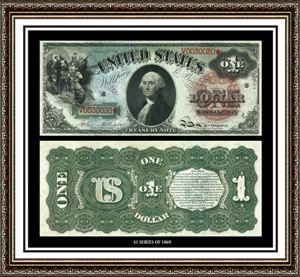
|
| Colonial Money |
The first story is an obvious one. Money in colonial days was mainly an entry in everybody's account book; today it is mainly an entry in computers. In the intervening three centuries, coins and currency made an appearance, flourished for a while as the tangible symbol of money, and then declined. Although Great Britain did not totally prohibit paper money in the colonies until 1775, in John Head's day, from 1718 to 1754, paper money was scarce and coins hard to come by. Because it was so easy to counterfeit paper money on the crude printing presses of the day, paper money was always questionable. Meanwhile, the balance of trade was so heavily in the direction of the colonies that the balance of payments was toward England. What few coins there were, quickly disappeared back to England, while local colonial commerce nearly strangled. The Quakers of Philadelphia all maintained careful books of account, and when it seemed a transaction was completed, the individual account books of buyer and seller were "squared". The credit default swap "crisis" of 2008 could be said to be a sharp reminder that we have returned to bookkeeping entries, but have badly neglected the Quaker process of squaring accounts. As the general public slowly acquires computer power of its own, it is slowly recognizing how far the banks, telephone companies, and department stores have wandered from routine mutual account reconciliation.
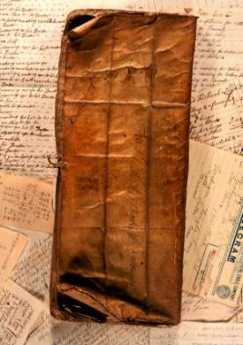
|
| John Head's Account Book |
From John Head's careful notations we learn it was routine for payment to be stretched out for months, but no interest was charged for late payment and no discounts were offered for ready money. It would be another century before it became routinely apparent that interest was the rent charged for money and the risk of intervening inflation, before final payment. In this way, artisans learned to be bankers.
And artisans learned to be merchants, too. In the little village of Philadelphia, chairs became part of the monetary system. In bartering cabinets for the money, John Head did not make chairs in his shop at 3rd and Mulberry (Arch Street) but would take them in partial payment for a cabinet, and then sell the chairs for the money. Many artisans made single components but nearly everyone was forced into bartering general furniture. Nobody was paid a salary. Indentured servants, apprenticeships trading labor for training, and even slavery benignly conducted, can be partially seen as efforts to construct an industrial society without payrolls. Everybody was in daily commerce with everybody else. Out of this constant trading came the efficiency step for which Quakers are famous: one price, no haggling.
One other thing jumps out at the modern reader from this book of account. No taxes. When taxes came, we had a revolution.
www.Philadelphia-Reflections.com/blog/1517.htm
James A. Michener (1907-1997)
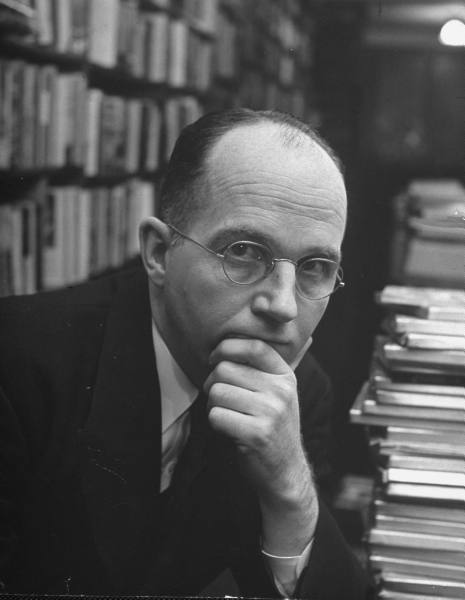
|
| James A. Michener |
James Michener seemed headed for a recognizably Quaker life until show business rearranged his moorings. He was raised as a foundling by Mabel Michener of Doylestown, Pennsylvania, under circumstances that were very plain and poor. Many of his biographers have referred to his boyhood poverty as a defining influence, but they seem to have very little familiarity with Quakers. When the time came, this obviously very bright lad was offered a full scholarship to Swarthmore College, graduated summa cum laude, went on to teach at the George School and Hill Schools after fellowships at the British Museum. And then World War II came along, where he was almost but not exactly a conscientious objector; he enlisted in the Navy with the understanding he would not fight.
While in the Pacific, he had unusual opportunities to see the War from different angles, and wrote little short stories about it. Putting them together, he came back after the War with Tales of the South Pacific. Much of the emphasis was on racial relationships, the Naval Nurse who married a French planter, the upper-class Lieutenant (shades of the Hill School) who had a hopeless affair with a local native girl that was engineered by her ambitious mother, as central characters. Michener himself married a Japanese American, Mari Yoriko Sabusawa, whose family had been interned during the War. There are distinctly Quaker themes running through this story.
And then his book won a Pulitzer Prize, Richard Rodgers and Oscar Hammerstein made it into a Broadway musical hit, then a movie emerged. The simple Quaker life was then struck by the Tsunami of Broadway, Hollywood, show biz and enormous unexpected wealth. Just to imagine this simple Bucks County schoolteacher in the same room with Josh Logan the play doctor is to see the immovable object being tested by the irresistible force. Michener retreated into an impregnable fortress of work. He produced forty books, traveled incessantly, ran for Congress unsuccessfully, and was a member of many national commissions on a remarkably diverse range of topics. Although he lived his life in a simple Doylestown tract house, he gave away more than $100 million to various charities and educational institutions.
In his 91st year, he was on chronic renal dialysis. He finally told the doctors to turn it off.
Inazo Nitobe, Quaker Samurai
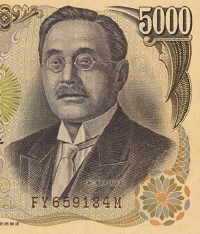
|
| Inazo Nitobe |
The story of Inazo Nitobe (1862-1933) comes in two forms, one from the Philadelphia Quaker community, and the other from his home, in Japan. One day in Philadelphia, a well-known ninety-year-old Quaker gentleman, rumpled black suit, very soft voice -- and all -- happened to remark that his Aunt had married a Samurai. A real one? Topknot, kimono, long curved sword, and all? Yup. Uh-huh.
That would have been Inazo Nitobe, who met and married Moriko, nee Elizabeth Elkinton, while in college in Philadelphia. He became a Quaker, and when the couple returned to Japan, the Emperor then found himself confronted with a warrior nobleman who was a pacifist. You can next perceive the hand of his Quaker wife in the deferential diplomatic suggestion that there were vacancies for Japan at the League of Nations and the Peace Palace in the Hague. Perhaps, well perhaps, there could be service to his Emperor as well as his new religion in such an appointment for her new husband. Good thinking, let it be done. As far as Philadelphia is concerned, Ambassador Nitobe next appeared when Japan was invading Manchuria. The Emperor had sent Nitobe on a tour of America to explain things. At the meetinghouse then on Twelfth Street, Nitobe adopted the line that Japan was only bringing peace and order to a chaotic barbarian situation, actually saving many lives and restoring quiet. After a minute of silence, Rufus Jones rose from his seat on the "facing bench": He was having none of it. And that was that for Nitobe in Philadelphia.
The other side of this story quickly appears if you go to Japan and ask some acquaintances if they happen to have heard the name Inazo Nitobe. That turns out to be equivalent to asking some random American if he has ever heard of Abraham Lincoln. To begin with, Nitobe's picture appears on the 5000 Yen ($50) bills in everybody's pocket. He was the founder of the University of Tokyo, admission to which now is an automatic ticket to Japanese success. He wrote a number of books that are now required reading for any educated Japanese. A number of museums, hospitals, and gardens are named after him; one of them outside Vancouver, at the University of British Columbia.
Nitobe's father, Jujiro Nitobe, had been the best friend of the last Shogun, deposed by the return of the Emperor to effective control after Perry opened up Japan to Western ideas. The Shogun was beheaded, of course, and the tradition was that the victim could ask his best friend to do the job because he would do it swiftly. Jujiro was unable to bring himself to the task, refused, and his family was accordingly reduced to poverty. Subsequently, the Samurai were disbanded by the newly empowered Emperor, given a pension, and told to look for peaceful work. Inazo Nitobe was in law school when the Emperor's emissary came and said that Japan did not need culture, it had plenty of culture. The law students would please go to engineering school, where they could help Japan westernize.
Nitobe later wrote a perfectly charming memoir, called Reminiscences of Childhood in the Early days of Modern Japan , which dramatizes in just a few pages just how wide the cultural gap was. For example, Nitobe's father brought home a spoon one day, and this curious memento of how Westerners eat was placed in a position of high honor. One day, a neighbor ordered a suit of western clothes, and hobbled around it, saying he did not understand how Westerners are able to walk in such clothes. He had the pants on backward.
One of Nitobe's greatest achievements was to struggle with his appointment as Governor of Formosa (Taiwan). Japan acquired this primitive island in 1895, and Nitobe got the uncomfortable role of colonist in Japan's first experience with colonization. He sincerely believed it was possible for Japan to bring the benefits of Westernization to another Asian backwater, but just as the British found in their colonies, there was precious little gratitude for it. Although he was undoubtedly acting dutifully on the Emperor's orders when he later came to Twelfth Street Meeting, he surely knew -- perhaps even better than Rufus Jones -- that there was something to be said on both sides, no matter how conflicted you had to be if you were in a position of responsibility. This most revered man in his whole nation almost surely saw he had been a complete failure in Philadelphia.
House that Love Built: Ronald McDonald of Philadelphia
Kim Hill had the misfortune to develop leukemia, but the great luck to have Fred Hill of the Philadelphia Eagles football team for a father. Driven by gratitude for the treatment at St. Christopher's Hospital for Children
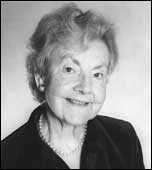
|
| Audrey Evans |
Fred demanded to be told what he could do and was referred to Dr. Audrey Evans. This world-famous pediatric oncologist was well known for her philanthropic activities and had frequently expressed the need for a temporary residence for families of children needing protracted medical treatments. Young children have young parents, whose savings are soon exhausted by travel, hotel and other non-insured costs related to a seriously sick child. The Hills had just been through such an experience and grasped the problem immediately, adding to it the discomfort and loneliness of families in such a situation. Fred Hill quickly enlisted the enthusiastic support of the whole professional football organization, and Jim Murray the Eagles' general manager recruited Don Tuckerman from their advertising agency, who got to Ed Rensi, the regional manager of McDonald's. Together, they got the project financed and started with a seven-bed facility near Children's Hospital of Philadelphia.
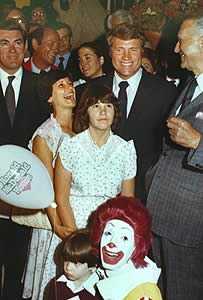
|
| Fred Hall |
In 25 years, the Philadelphia Ronald McDonald House has grown to a capacity of 44 families, in a century-old mansion at 39th and Chestnut Streets filled with Mercer tiles and the like. The operation uses eighteen volunteers at all times, runs two jitney buses, and is one huge teeming family home for people confronting a common issue, supporting each other through a wrenching emotional experience. Although it actually costs about $65 a day per family, the charge is $15 and over half of the clients cannot afford even that. Although an effort is made to have family cooking, the McDonald's restaurant chain supplies 20% of the budget along with generous help with exigencies and in-kind assistance with such things as clowns for the entertainment program, birthdays and the like. Although McDonalds's is probably the world's premier franchising corporation, every one of the 300 worldwide Ronald McDonald Houses is an independent local organization, run without a central headquarters or any sort of standards-setting and the like. Every one of the other 299 Houses got the idea from Philadelphia but proceeds in its own way. Philadelphia created it, but Philadelphia does not own the idea.
In this connection, it is probably worth reflecting on the history of this topic. When Benjamin Franklin and Dr. Thomas Bond started the Pennsylvania Hospital in 1751 at Eighth and Spruce Streets, it was the custom to be diagnosed, treated, be born and to die in your own house. The unique perception behind the nation's first hospital was that poor people generally did not have home facilities that were adequate to support home care. In Franklin's own handwriting the purpose of the Pennsylvania Hospital was stated to be "for the sick poor, and if there is room, for those who can pay." It was understood that poor sick people needed a place to take care of them, not merely for their surgery and overwhelming illness,
<but for convalescence and rehabilitation as well. Two centuries later, in the first thrill of founding the Medicare and Medicaid programs, it was imagined that things would remain exactly the same, only paid for by the Government. But after four or five years, it became abundantly clear that it was far too expensive to use hospitals in that way. The very act of federally paying for the program undermined its volunteer spirit, raised its mandated standards, and made it financially unsustainable. And so, although the 1965 Amendments to the Social Security Act insisted, and still pretend, that no change was to be made to the delivery of care, the delivery of care simply had to be changed. Not only was domiciliary and custodial care to be excluded, but heroic efforts were to be made to reduce the length of stay in the hospital to what would once have been regarded as special intensive care. In effect, if a type of service could normally be handled at home by non-indigent people, it was to be prohibited for everybody. Since the cost of care in hospital has continued to escalate far in excess of the cost of living, it seems unlikely we will ever go back to the days of rest and in-hospital recuperation.
So, just as Dr. Bond recognized the problem and went to Ben Franklin to handle the philanthropy, Dr. Evans had the idea and Fred Hill made it work. Around the Ronald McDonald house, the idea is frequently heard expressed that every hospital needs such a place nearby, for people of all ages. Perhaps that is workable, but it offhand seems more likely that Retirement Villages, so-called CCRC, will be called on to supply this badly needed service, at least for senior citizens. And that what we now call hospitals will evolve into the scientific "focused factories" so popular in the minds at the Harvard Business School.
Highway Beautification

|
| Prince Grigory Potemkin |
Someone who has traveled in modern China -- and is at all observant -- knows that the extensive slums and trashy wastelands of the Inner Kingdom are systematically hidden from tourist's eyes by fences and plantings of tall trees. In a few years, the trees will grow a few feet taller and fully conceal what is behind them, but today modern tourist buses are high enough so you can see over the treetops if you look. When American tourists notice this, they are very smug.
The term Potemkin Village is a somewhat exaggerated term for the process Grigory Potemkin used to clean up the villages that his girlfriend Catherine the Great passed through on her visit to southern Russia and Crimea. He apparently did not construct whole fake villages as enemies claimed, but he was unnecessarily forceful,
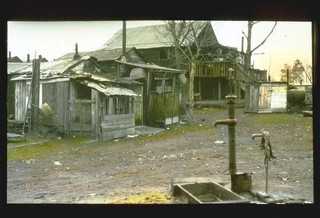
|
| West Philadelphia, at one time. |
let us say, in his efforts to smarten things up. After taking a few rides on Philadelphia's suburban commuter trains, or a boat ride up to its rivers, the idea does cross most minds that we could use a Potemkin in charge of our Streets Department, or maybe a Communist Chinese on loan. We have miles, maybe even hundreds of miles, of overgrown weeds along our embankments, spiced with the discarded trash of historic duration. Since nobody wanted to live next to coal-burning locomotives, and most people even dislike the noisy though cleaner replacements, the houses along the railroad clearly deserve to be hidden. That's true in almost every town in the world (not Japan, not Switzerland) and it's deplorably true in our Philadelphia. Seaports and riverbanks are a mess everywhere, too, and we are certainly in style in that department as well. Why can't the Schuylkill look like the Seine, next to the cathedral of Notre Dame?
So the Chinese have combined the concept of cleaning up their public spaces, which we applaud, with the concept of hiding the economic truth, which we sneer at. Maybe we should give some thought to a spin campaign, the essence of which is a metropolitan crusade to pick up the trash, build some strategic fences, and plant a whole lot of tall evergreens along with the public ways. We've made a good start with Boathouse Row; why not extend it to Gray's Ferry, or even to Norristown? The idea is not a new one; Lady Bird Johnson made it her main goal in public life.
In 1965, Lyndon Johnson used his famous powers of legislative persuasion to give his wife what she wanted. The Highway Beautification Law of 1965 was passed by Congress on Lady Bird's birthday, with everyone in the gallery dressed in evening clothes. With the vote counted and enormous standing applause registered for fifteen minutes, the whole group traveled over to the White House for a signing of the law with nineteen pens. There followed the birthday party at the White House, to end all birthday parties. Highway billboards were a thing of the past.
That was forty or so years ago, and unfortunately, the billboard companies didn't like it at all. Through administrations both Democrat and Republican, the Department of Transportation has never issued regulations, so Highway Beautification was never implemented. It represents just one more unwritten aspect of the Constitution that James Madison and his friends didn't fully anticipate.
Henry Cadbury Dresses Up for the King

|
| Henry Cadbury |
There are a few old Quaker Clothes in the attics of their descendants, and on suitable occasions, an old broad-brimmed hat or two will appear at a Quaker gathering, for amusement. Quakers gave up the old style of "plain dress" when it became generally agreed that such eccentric dress was not plain at all but rather drew attention to itself. On the other hand, there is a distinctly unfashionable quality to almost everything Quakers do wear. When silk and nylon stockings were fashionable for women, Quaker women often wore black stockings. When it became the style for women to sport black stockings, Quaker women usually wore flesh-colored nylons. Among men, thin metal-trimmed spectacles displayed the same counter-fashionable tendency. Nowadays, these little quirks are often public signals among strangers, a way of wig-wagging "I notice you are a Quaker, so am I." And of course, unfashionable clothes are cheaper, and that's always a good thing.
And so it happened in 1947 that the Quakers were awarded the Nobel Peace Prize, with information passed along that white tie and tails were the expected form of dress at the ceremony. Henry Cadbury was selected to receive the award on behalf of the American Friends Service Committee, and you can be sure Henry Cadbury didn't own a set of tails. Henry was also very certain he wasn't going to go out and buy a set, just for a single wearing.
The AFSC collects used clothing, to distribute to the poor. Henry inquired whether there might be a set of white tie and tails to be found in the used-clothing bin, and luckily there was. It had been collected on behalf of the Budapest Symphony Orchestra when that impoverished but distinguished group of musicians was invited to give a concert in London. One of the monkey suits more, or less, fit Henry.
So, after investing in dry cleaning and pressing, Henry packed it up and went off to Oslo, to meet the King.
Health Savings Accounts
The legislation removes the hampering restrictions of the 1995 Law. What follows is a brief outline of the main features of the HSA/MSA clause in the 2003 law,
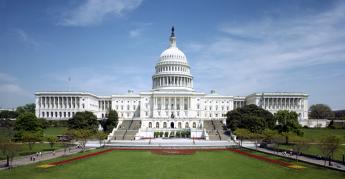
|
| U.S. Capital |
as published by the main authorizing committee, the House of Representatives, Committee on Ways and Means. From this point forward, more specifics of the program will probably be written by the Executive Branch and published in the Federal Register. The Ways and Means Committee will continue to exercise oversight authority, however, in conjunction with the Senate Finance Committee. As a consequence, statutory modifications of the program are likely to appear in future annual budget reconciliation acts, or else in any new Medicare amendments. The legislative route map becomes more understandable when it is recalled that Medicare itself is considered to be an amendment (Title XVIII) of the Social Security Act.
Committee on Ways and Means
Medicare Prescription Drugs, Improvement And Modernization Act of 2003
Health Savings Accounts (HSA's)
Lifetime savings for Health Care
Working under the age of 65 can accumulate tax-free savings for lifetime health can needs if they have qualified health plans.
A qualified health plan has a minimum deductible of $1,000 with $5,000 cap on out-of-pocket expenses for self-only policies. These amounts are doubled for family policies.
Preventive care services are not subject to the deductible.
Individuals can make pre-tax contributions of up to 100% of the health plan deductibles. The maximum annual contributions are $2,600 for individuals with self-only policies and $5,150 for families (indexed annually for inflation).
Pre-tax contributions can be made by individuals, their employers, and family members.
Individuals age 55-65 can make additional pre-tax "catch up" contributions of up to $1,000 annually (phased in).
Tax-free distributions are allowed for health care needs covered by the insurance policy. Tax-free distributions can also be made for the continuation coverage required by Federal law (i.e., COBRA), health insurance for the unemployed, and long-term care insurance.
The individual owns the account. The savings follow the individual from job to job and into retirement.
HSA savings can be drawn down to pay for retiree health care once an individuals reach Medicare eligibility age.
Catch-up contributions during peak savings years allow individuals to build a nest egg to pay for retiree health needs. Catch-up contributions allow a married couple to save an additional $2,000 annually (once fully phased in if both spouses are at least 55.
Tax-free distributions can be used to pay for retiree health insurance (with no minimum deductible requirements), Medicare expenses, prescriptions drugs, and long-term care services, among other retiree health care expenses.
Upon death, HSA ownership may be transferred to the spouse on a tax-free basis.
Contain rising medical costs- HSA's will encourage individuals to buy health plans that better suit their needs so that insurance kicks in only when it is truly needed. Moreover, individuals will make cost-conscious decisions if they are spending their own money rather than someone else's.
Tax-free asset accumulation- Contributions are pre-tax, earnings are tax-free, and distributions are tax-free if used to pay for qualified, medical expenses.
Portability- Assets belong to the individual; they can be carried from job to job and into retirement.
Benefits for Medicare beneficiaries- HSA's can be used during retirement to pay for retiree health care, Medicare expenses, and prescription drugs. HSA's will provide the most benefits to seniors who are unlikely to have employer-provided health care during retirement. During their peak saving years, individuals can make pre-tax catch-up contributions.
Chairman Bill Thomas Committee on Ways and Means 11/19/2003 12:56 PM
Gross National Happiness In Bhutan
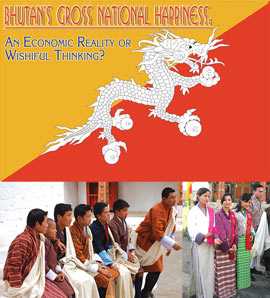
|
| Gross National Happiness |
When feudal and primitive cultures come in contact with more advanced ones, their response is apt to be to reject modernism in all its forms and trappings. The Pennsylvania Amish, the American Indian, and most Middle-Eastern countries display this response. After a while, the advanced countries just give up appealing to them, and resort to extermination, with results that are very sad. The Kingdom of Bhutan has a 28 year-old king who went to Oxford, a long-rejected Mongolian Genghis Khan heritage, and a reflective self-denying Buddhist religion. Twenty-five Stanford professors who every year come and study the place may possibly contribute something to locally prevailing ideas as much as they learn from them. In any event, the charming Bhutan response of Karma Galay (Gross National Happiness) ought to be deeply thought-provoking.
Unlike so many other countries in this position, Bhutan does not resist progress but fully anticipates it. They also anticipate the disorder which will result when their young people watch satellite television and want to have some of those consumer durables for themselves. Buddhist culture teaches you to keep your life simple, and the root of all observable evil is -- craving. What's obviously more important is to be happy, so why not measure happiness in some Western way and see how you are collectively doing. From this comes the idea that since economic strivers and cravers measure their economic progress by Gross National Product, why not apply a statistical approach to what Buddhists truly want, which is happiness, and see how they are making out?
That includes a broad methodology. Buddhist teaching emphasizes never harming any sentient creature, but rather devoting constant attention to removing impediments to happiness from themselves and others. A country dead-set against consumerism recognizes that Internet and TV are going to assault them with consumerism, and they want to preserve an open mind about whether it is improving happiness or injuring it. Most American parents would agree that a case can be made in both directions, so let's be fair, let's measure it. No doubt many of the monks harbor a suspicion that happiness will lose, and proven deterioration in GNH can be used to show why they should close their borders and hunker down. Others, probably including those Stanford professors, probably anticipate that a demonstrated rise in GNH can be used to pacify the conservatives whenever the facts show the whole country is happier if they substitute something else for rancid butter tea, rice and potatoes. On a less grandiose level, perhaps different strategies of education can be tested as Bhutan goes from the Fifteenth Century to the Twenty-first, relieving stress when it appears, and augmenting community contentment if something probably has that result.
Maybe all Americans should give some thought to what is being said, here. Maybe in a strange way that's what Castro was failing to do in Cuba, and Cuba could now become an experimental laboratory for GNH measurement. Or Iraq or Russia. And of course, let's measure the consequences of our own cravings for achievement. Is, or is not, most of this self-denial just a lot of sour grapes? Let's give some thought to this, because if Thou shouldst mark iniquity, Oh Lord, who shall stand?
Goat Head Merchant
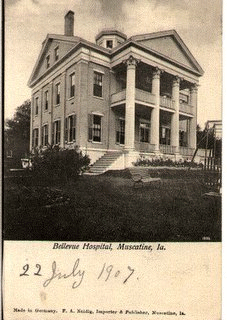
|
| Bellvue Hospital |
In 1948, one of the Internet physicians at Bellevue Hospital contracted tuberculosis. The senior medical students at Columbia were asked to volunteer to take his place, and for a month I did so. Since I knew I was soon going to Philadelphia to the Internet at the Pennsylvania Hospital, my interest was particularly taken by an old Bowery bum who was talking about untaxed liquor. In New York at that time, it was common for Skid Row denizens to drink the wood alcohol in Sterno, called "squeeze" because it could be extracted from the waxy contents of a Sterno can by wrapping it in cheesecloth or a handkerchief and squeezing out the juice. Another favorite was "Smoke", which was typically a mixture of automobile radiator fluid and other sundry handy ingredients. My new best friend at Bellevue was just recovering from the effects of such recreation, and was in a mood of "never again". He observed that "When I get out of the Bell View, I'm going to get on a bus and go down to Philly. They've got a drink there called Goat Head, and, man, is it ever smooth."
The Chief Resident of the Pennsylvania Hospital was happy to tell me what Goat Head was. It was bootleg liquor, made in the Pine Barrens of New Jersey. Bags of cane sugar were fermented and distilled through coils of copper tubing, obtained from old hot-water heaters. The smooth stuff that so intrigued the bums of Bellevue was what was otherwise known as "White Lightning". It was then sold in the alleys near South Street by "Goat Head Merchants", who carried a suitcase full of small bottles, sold for about 25 cents a bottle. They say that during the Depression, Goat Head was sold out of an open bucket, at 10 cents a dipperful. One of the Goat Head Merchants used the Accident Room of the hospital as his family doctor, let us call him Walter Apple.
One day, Walter had a heart attack and was brought in on a stretcher, in considerable pain. I had just completed an electrocardiogram on him, when the pain disappeared. A few weeks later, he had completely recovered and was going home. Every time I came anywhere near him, he announced to everyone in the vicinity that I was the best doctor in the world, having cured his heart attack by giving him the "wire treatment".
As he gathered up his belongings to go home, he apologized that he was not going to be able to pay his bill. He had once known Dillinger and all those other big shots wore a diamond stick-pin and drove a Duesenberg car. But now he was broke.
But grateful, too. So, if ever there came a time when I encountered someone unpleasant, who needed "pushing' around" -- just you call on Walter Apple, and Walter would be glad to pay off his debt.
Getaway

|
| Delaware Hospital in Wilmington |
Occasionally prisoners must be taken to the hospital, and that's a problem for the authorities. Philadelphia General Hospital had a special prison unit on its grounds, so the problem for the guards was merely to transport the prisoner to the locked hospital ward and bring him "home" after his medical problems were fixed. The State of Delaware doesn't have a prison unit in any hospital, so the security risk must be addressed by sending at least two guards, night and day, to some hospital, and securely manacle the prisoner to the bedstead. Nobody likes this situation, particularly the head nurses, but no one has a better solution to offer.
When prisoners have to make an outpatient trip for an x-ray or similar, there is usually an iron rule: no one is to know about it in advance. In one particular case, however, a convicted Delaware murderer had to have an x-ray of his gallbladder, which in those days required swallowing some large pills the night before. That was the tip-off.
On the specified morning, he was bundled into a patrol car with manacles and guards, and whisked off to the Delaware Hospital, now the Delaware Division of the Wilmington Medical Center. The x-ray department was at the end of a long corridor, with the diabetic clinic on the right and the bathrooms on the left side of that corridor. The entrance was on the side of this corridor, right next to the office for visiting consultants. Things were busy but peaceful that morning when a commotion arose. Three prison guards came marching through the door, surrounding their manacled prisoner. They turned left, and down the long hall to the x-ray department.
As they passed the men's room, the prisoner begged his guards to let him relieve himself, so they took him into the bathroom, removing the handcuffs. He washed his hands, dried them with a paper towel, pushed it into the waste container. Then quick as a flash he thrust his hand deeper into the crumpled waste paper, got the loaded revolver his accomplices had put there, and emerged from the wastebasket -- shooting. The guards got down on the floor, a bullet went into the Diabetic Clinic were a very prominent society lady was working in a pink volunteer's uniform, and another bullet went into the consultants' office, which on other days I might have been using. The escapee was running hard, fired one final bullet into the ceiling at the door, and was out in a second to the waiting getaway car where his buddies were ready. He got away clean, as they say.
There's nothing like an episode of that sort to bring people together. We were survivors of an exhilarating experience, having something in common that no one could take away. For a couple of years afterward, the bullet hole remained unobtrusively in the ceiling by the entrance. The nurses told me that workmen had arrived several times to patch it up, and the society lady, who was a trustee of the hospital, wouldn't let them fix it. That was our bullet hole.
George Washington's View of the British Army
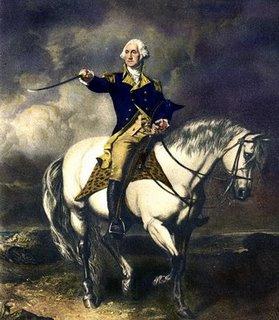
|
| George Washington |
TWO things about George Washington continue to puzzle us. Why would the rich, aristocratic Virginia gentleman become a revolutionary? And, how could he or his backwoodsmen soldiers even imagine they could defeat the British, the greatest military force in the world? The following letter, written to his mother after the defeat of Braddock's army, shows his viewpoint at the age of 23, putting the British regular army in a very bad light, indeed.
"HONORED MADAM: As I doubt not but you have heard of our defeat, and, perhaps, had it represented in a worse light, if possible, than it deserves, I have taken this earliest opportunity to give you some account of the engagement as it happened, within ten miles of the French fort, on Wednesday the 9th instant.
"We marched to that place, without any considerable loss, having only now and then a straggler picked up by the French and scouting Indians. When we came there, we were attacked by a party of French and Indians, whose number, I am persuaded, did not exceed three hundred men; while ours consisted of about one thousand three hundred well-armed troops, chiefly regular soldiers, who were struck with such a panic that they behaved with more cowardice than it is possible to conceive. The officers behaved gallantly, in order to encourage their men, for which they suffered greatly, there being near sixty killed and wounded; a large proportion of the number we had.
"The Virginia troops showed a good deal of bravery and were nearly all killed; for I believe, out of three companies that were there, scarcely thirty men are left alive. Captain Peyrouny and all his officers down to a corporal were killed. Captain Polson had nearly as hard a fate, for only one of his was left. In short, the dastardly behavior of those they call regulars exposed all others, that were inclined to do their duty, to almost certain death; and, at last, in spite of all the efforts of the officers to the contrary, they ran, as sheep pursued by dogs, and it was impossible to rally them.
"The General was wounded, of which he died three days after. Sir Peter Halket was killed in the field, where died many other brave officers. I luckily escaped without a wound, though I had four bullets through my coat, and two horses shot under me. Captains Orme and Morris, two of the aids-de-camp, were wounded early in the engagement, which rendered the duty harder upon me, as I was the only person then left to distribute the General's orders, which I was scarcely able to do, as I was not half recovered from a violent illness, that had confined me to my bed and a wagon for above ten days. I am still in a weak and feeble condition, which induces me to halt here two or three days in the hope of recovering a little strength, to enable me to proceed homewards; from whence, I fear, I shall not be able to stir till toward September; so that I shall not have the pleasure of seeing you till then, unless it be in Fairfax... I am, honored Madam, your most dutiful son."
Frida Kahlo
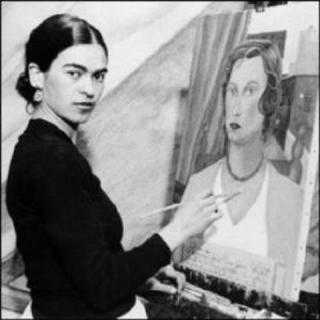
|
| Frida Kahlo |
The central exhibition of the Philadelphia Museum of Art in 2008 was a collection of the paintings of the Mexican, Frida Kahlo, who was badly injured in a bus accident, spent several years in bed, followed by a lifetime of pain. Lacking formal training in art, she nevertheless worked at it hard and threw herself at her demigod Diego Rivera, the much older but famous painter of murals with a Communist theme. She was semi-bedridden, had a slight mustache, eyebrows that grew across the bridge of her nose, was alcoholic and drug addicted. Diego weighed nearly three hundred pounds and enjoyed a constant succession of philandering experiences. Frida also had a large sexual experience in both sexes; evidently, venereal disease was just an ordinary part of this household. They divorced, remarried, and all that sort of thing. One of her lovers, if that is the term, was Leon Trotsky. These people invented Haight Asbury long before the Hippies of the sixties.
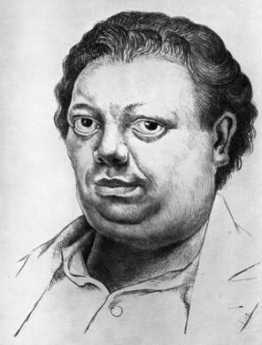
|
| Diego Rivera |
Well, what about her art? Largely confined to bed, Frida tended to paint small canvases, using both herself and her cats as models, sometimes daubing the picture frame with blood. You find extremely fine detail when you get up close, but the canvas maintains a primitive simplicity of tones with great luminosity at a distance. When the viewer does get close, the small details often concern repellant, even disgusting features. Diego never bothered with little details, slapping large chunks of colored fresco on the murals celebrating downtrodden workers with hammers or glorifying Communist leaders with flags. Frida's pictures have much the same color scheme at a distance, but up close are blood and guts, disease, torment and suffering with an unreal organization. Somehow, these people were popular with Hollywood, actresses and models, and the literati like Clare Booth Luce. Evidently, they were excited to know.
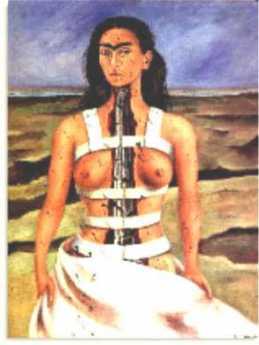
|
| Me Generation |
Modern painting abandoned both beauty and representational features during the lifetime of the Rivera family and skipped on to post-modernism, defined as blurring the distinction between real and unreal. Both Diego and Frida were strictly representational throughout their careers but crossed over into the unreal rather earlier than most. The one constant in Frida's work, the one thing she was really interested in -- was herself. Consequently, her attraction for what has become known as the "Me Generation" is easy to understand.
Funny Toes: A Physician Viewpoint

|
| Webbed Toes |
It probably took me twenty years to notice that, unlike most people, I had an incomplete separation of my second and third toes. I thought my toes were like everybody else's, but once you start peeking, you see that webbed toes are not normal, although they are not really rare, either. After another thirty years, it became apparent that most of my numerous descendants had the same kind of toe; it was obviously an inherited condition. When the family clan gathered at the beach, it was a source of mild amusement, possibly even a little pride. A few weeks ago, I happened to mention the matter at a party, whereupon another doctor promptly pulled off his shoes and socks, and revealed fused or webbed toes of a much more striking sort than mine; obviously, he was proud of it, too. He is of an old, old Philadelphia family that owns one of the oldest, if not the oldest, a house in Germantown. His family, too, is stigmatized in the same way only more so. In Philadelphia, when you are proud of your family, you are really, really, proud of it.
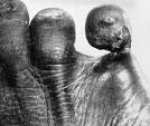
|
| Ainhum |
Which brings me back to my days as an intern in the accident room of the Pennsylvania Hospital. When there is a sudden crowd of emergencies in an emergency department, the nurses get all of them undressed, put in a hospital gown, and instructed to wait for the doctor behind a curtain that doesn't quite reach the floor. For some reason, as a medical student, I had been particularly struck by a photograph in a textbook of an inherited disorder said to have been first noted on a slave ship; the disease in the native language was named Ainhum. For reasons obscure, a tight little band appears at the base of the fifth, or little, too. It gets slowly tighter over a period of months, and eventually, the little toe falls off. That's all there is to Aihnum, and all that was known about it. So, imagine my surprise and delight to walk past a row of naked feet sticking out below curtains -- and there was my first and last case of Aihnum.
I summoned my colleagues, and the visiting medical students from both Jefferson and Penn who at that time shared training in our accident room. I raced off to my room to get a camera to record this momentous event. An elderly staff physician, either Tom McMillan or Charles Hatfield, wandered past and was invited to share the excitement. Well, he says, I saw one of those forty years ago, it looked just like that; old Doctor Norris showed it to me when I was an intern. Much murmuring ensued but abruptly stopped when the patient himself rose up and started putting on his clothes. He was going home, but why? "Well," he growled, "I came here because my back hurts, and all you people do is look at my toes!" He said he was going over to the Jefferson Hospital to get proper treatment, and I guess he did.
And finally, there is Morton's Toe. Or perhaps more properly, Mortons' Toes. There were in fact two Doctor Mortons, one of them at Columbia College of Physicians and Surgeons where I went to school, and the other at the Pennsylvania Hospital where I interned. In New York, Morton's Toe refers to a painful callous, or neuroma, that forms on the bottom of the victim's big toe. In Philadelphia, such an answer would get a failing grade, because the Philadelphia Morton had noticed that some people have a big toe that is shorter than the other toes, instead of being bigger as the term would suggest was proper. The tricky thing about this relatively harmless variant is that the big toe is actually not short at all. The foot bone, or metatarsal, is short, so the toe of normal length sits back farther on the foot and just looks shorter. The main significance is for shoe salesmen since the shoe needs to be long enough to avoid crushing the other toes.
So now, you readers who were not lucky enough to go to medical school can get a feeling for what it seems like to be a doctor. The other significant shared bond within the fraternity is a sense of outrage at the way health insurance companies drag their feet paying doctors, but that's not limited to feet..
Frederick Mason Jones,Jr. 1919-2009
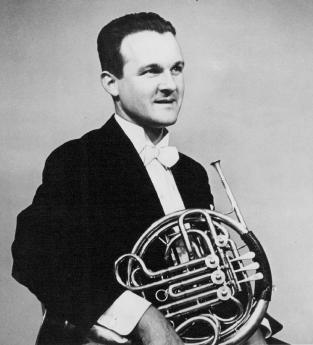
|
| Mason Jones |
Classical music, however else it may be defined, strongly implies music played by an orchestra, or at least a group of musicians. It thus should be no surprise that the members of a famous orchestra bond together for most of their lifetimes in a sense far beyond the ordinary meaning of teamwork. If you are good, really, really good, you will come to the orchestra as a boy, devote every hour of every day to the orchestra, and step down only as a famous old man when you sense that reaction times have slowed. You sit together, travel together, rehearse together, and talk a language of detail which no one else can fully comprehend. Mistakes that one of you made forty years ago in performance, are still joked about because your colleagues know you still feel the pain of it, just as they share their own infrequent but no less fully remembered, moments of failure, largely unnoticed by the audience. When one of your colleagues dies, you turn out by the hundreds for the funeral. And when the hymns are sung, the organist is ignored, struggling to keep up with the people who really know music.
Mason Jones attended the Curtis Institute, itself a collection of prodigies, and was hired by Ormandy after a single audition; a year later he took the position of a first horn and kept it until he finally sensed he was passing his prime and laid it down. He was featured in the many recordings which defined the orchestra, and the Philadelphia Woodwind Quintet. He sometimes recorded as a soloist, but he thought of himself as an orchestral horn player, teaching orchestral horn at the Curtis to many generations of aspirants. He even conducted a little, usually in small groups. His comment on that was that it doesn't take much to be a conductor. "Just ask any orchestra player." At his funeral, it was related that the second horn once had two solo passages repeated within a larger piece, but when its time came there was silence. The second time around, it was played faultlessly. Afterward, Mason was asked what happened. "Fell asleep," he answered. And the second time? "I just played it for him."
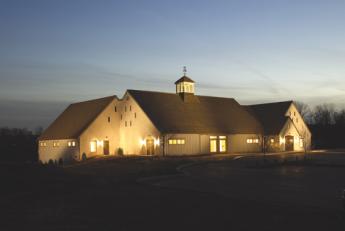
|
| St. Peter's in the Great Valley |
Mason's funeral was held at St. Peter's in the Great Valley, illustrating that strange combination of artistic prodigies with modest beginnings, and the highest of high society, who mix together to create a great orchestra. A very well-groomed lady was heard to remark that this was where she had her coming-out party. St. Peters was founded as an Anglican mission church in 1700 in the Welsh Barony, built a log cabin church in 1728, replaced it with a little white jewel of a church in 1856, and added new buildings in the past few years to accommodate the population growth in the valley. The church has abundant well-tended land, sited on a hilltop surrounded by high hills, quite suitable for a college or private school campus. The homes in the area are a step beyond splendid, hidden in the wooded countryside. Unless you know precisely where to go, the tangle of country roads will defeat you. But the arterial of U.S. 202 is only a few miles away, and Philadelphia's silicon valley nestles beside the highway, inevitably closing in on the countryside. There will be horses and kennels and fox hunts in the region for another decade perhaps, but the new world is moving in on the old one, from all directions.
The Supreme Court Arrives, A Little Late
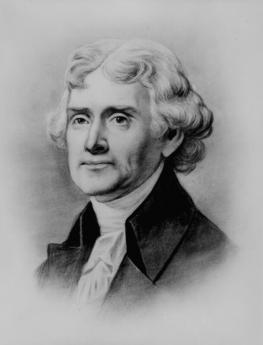
|
| Jefferson |
Thomas Jefferson became President in the country's fourth Presidential election; John Marshall was the fourth Chief Justice of the United States. These two Virginians hated each other personally, and each hated what the other stood for. Jefferson had been aboard when the Constitution was written, and when he came home it was too late to change it. But it didn't suit him at all, whereas Marshall devoted his whole life to strengthening it. The Constitutional System had evolved pretty far in sixteen years, except for the Supreme Court. From the Moment Marshall administered the oath of office to Jefferson, the war over the Court was on. Marshall was precise, concise, and implacably logical. Jefferson issued great clouds of uplifting rhetoric that were often hard to follow. People of those two personality types almost always detest each other.
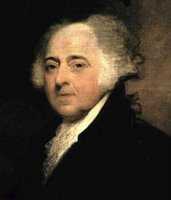
|
| John Adams |
By this time, it was becoming clear that minority rights were most effectively protected by confronting the party in power with the near certainty of being soon out of power, hence soon exposed to retaliation. The problem this solution generated was then how to maintain national stability when power was constantly shifting. Marshall's solution was to have a semi-permanent judicial system, with the power to overrule both President and Congress on fundamental, Constitutional, issues. It is not clear whether this concept had always been in his mind, or whether the experience of seeing his Federalist party swept out of office made him cast about to find ways to preserve their will. It now scarcely matters, since outgoing President John Adams had made a whole pack of "midnight" appointments as he left office, and Jefferson promptly tried to throw them out. That, in essence, is what the famous case of Marbury v. Madison, was all about. When the smoke cleared, Marshall had established that the Supreme Court could overrule the other branches of government if it could find support in the Constitution. And the Constitution largely means whatever the Supreme Court says it means. That was a bitter pill for Jefferson, who had proclaimed and campaigned on the principle that the will of Congress was supreme.
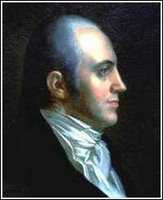
|
| Burr |
The other sweeping concept which Marshall introduced into our system of government was to transform the Supreme Court from a mere tribunal into a pulpit for announcing fundamental principles of law. His method was to decide cases on the basis of wide ranging constitutional principles when the same decision could have been made on narrow technical points. In the famous trial of Aaron Burr,, Marshall could quite properly have refused to hang a former Vice President just because Jefferson hated the man, especially since the main witness against Burr was a notorious liar and scoundrel. Instead, these features gave Marshall the cover to expose weaknesses in the constitutional definition of treason, which contained muddled thinking but vexingly specific language. One man's legal clarification is another man's legislating from the bench, of course, but the innovation was nevertheless Marshall's. By holding the lower courts strictly to the letter, this approach concentrated interpretative latitude in one place, where it cannot escape public notice. The European Union, struggling to match the American model, will be hard put to match this particular unwritten subtlety.
REFERENCES
| American Sphinx:The Character of Thomas Jefferson Joseph J. Ellis ISBN-13: 978-0679764410 | Amazon |
Morris Upended by a Nobody
THE Revolutionary War ended militarily with the Battle of Yorktown in 1781, and diplomatically with the Treaty of Paris in 1783. The careers of Washington and Franklin appeared to be complete, while the economic and financial career of Robert Morris seemed likely to stretch for decades into the future. But as matters actually turned out for these three fast friends, it was Washington who was propelled into a new political career, Franklin soon died, and Morris got himself into a career-ending mess. The financial complexity and economic power of the United States did grow massively in the next several decades, but unfortunately, Robert Morris was soon unable to exert any leadership. At the end of Washington's eight years as President, the power of the Federalists, and particularly the three men most central to it, was coming to a close. John Adams had a tempestuous single term, and then Federalism was all over.
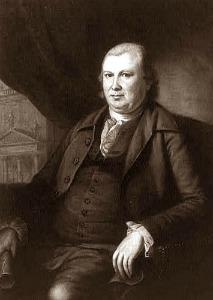
|
| Robert Morris |
The end of the Eighteenth century marked the end of The Enlightenment and the beginning of the Industrial Revolution, accompanied by many national revolutions, not just the American one. This was a major turning point for world history. The momentum of these upheavals still continues, but it is clear that the Industrial Revolution of which the Morris banking revolution was an essential part swept the world far faster than the social and political revolution, in which he also played a pivotal role. In the banking and industrial revolution, it is universally agreed that Morris was almost always right. In the social and political world, it is conversely agreed he was quite wrong. Essentially, Morris assumed that a small minority, an aristocracy of some sort, would rule any country. Within weeks of the ratification of the new Constitution, or even somewhat in anticipation of it, America made it clear that replacing an aristocracy of inheritance with an aristocracy of merit would not satisfy the need. Morris, born illegitimate and soon an orphan, was obviously in favor of promotion based on merit. John Adams defined leadership even more narrowly; he said a gentleman was a man who went to college, and he probably meant Harvard. Nobody extended the leadership class to include Indians and slaves, but the backwoodsmen of Appalachia made it clear that power and leadership at least included them. Thomas Jefferson was the visible leader of this expansion of the franchise, but changed his mind several times. James Madison switched sides; Thomas Paine switched in the opposite direction. The leaders of Shay's Rebellion and the Whiskey Rebellion lacked coherence and consistency on this point; instead of agitating for a refined goal, they mostly seemed to be running around looking for a leader. William Findlay, on the other hand, knew what he wanted. The issue might be defined as follows: it was obvious that hereditary aristocracy was too small and too inflexible to suffice, but it was also obvious that every man a king was too inclusive. An expanded leadership class was needed, but its boundaries were indistinct and contentious. But to return to Findlay, who at least had a clear idea of what he wanted.
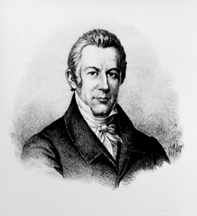
|
| William Findlay |
William Findlay was a member representing Western Pennsylvania in the State Legislature, in 1785. It would be difficult to claim any notable accomplishment in his life; he was largely uneducated. The new leadership class must, therefore, include both the uneducated and the mediocre. The Legislature at that time met in the State House, Independence Hall, in Philadelphia, where no doubt the unconventional dress and manners of backwoodsmen did not pass without audible comment. Findlay made his own political goals quite explicit; he was for paper money to facilitate land speculation which could make him rich. Wealth was a goal, but it did not confer distinction. The rights of the Indians, the rights of the descendants of William Penn, the rights of the educated class and the preservation of property were all just obstacles in the way of an ambitious man who had carefully studied the rules. Everybody's vote was as good as everybody else's, and if you shrewdly controlled a majority of them, you could do as you please. If this meat-ax approach had any rational justification, it lay in the essential selfishness of every single member of the Legislature, working as hard as he could to further his own interest. If someone controlled a majority of such votes, then the majority of the public were declaring in favor of the outcome. Those who believed in good government and the public interest were saps; the refinements of education mostly just created hypocritical liars. There was a strain of Calvinism in all this and a very large dose of Adam Smith's hidden hand of the marketplace. If you were rich, it was proof that God loved you, if you were poor, God must not think much of you, or He wouldn't have made you poor. Findlay had the votes and meant to become rich; if his opponents didn't have the votes, they could expect soon to be poor. In this particular case, the vote coming up was a motion to renew the charter of the Bank of North America. Findlay wanted it to die.
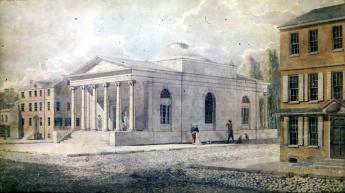
|
| America's first bank, the Bank of Pennsylvania |
It came down to a personal debate between Findlay, and Robert Morris. Morris had conceived and created America's first bank, the Bank of Pennsylvania. Today it would be called a bond fund, with Morris and a few of his friends put up their own money to act as leverage for loans to run the Revolutionary War. After a short time, it occurred to Morris that the money in a bank could be expanded by accepting interest-bearing public deposits and making small loans at a higher interest rate, which is the way most banks operate today. Accordingly, a new bank called the Bank of North America was chartered to serve this function, which greatly assisted in winning the Revolutionary War. There was no banking act or general law of corporations; each corporation had its individual charter, specifying what it could do and how it would be supervised. When the charter came up for renewal, Findlay saw his chance to kill it. Morris, of course, defended it, pointing out the great value to the nation of promoting commerce and maintaining a stable currency. The reply was immediate. Morris had his own money invested in the bank and only wanted to profit from it at the public expense. His protests about the good of commerce and the public interest in stable money were simply cloaking for this rich man's greed to make more money. Findlay made no secret of his interest in reverting to state-authorized paper money, which could then be used by the well-connected to buy vast lands in Ohio for speculation. There were enough other legislators present who could see welcome advantages, and by a small majority the charter was defeated.
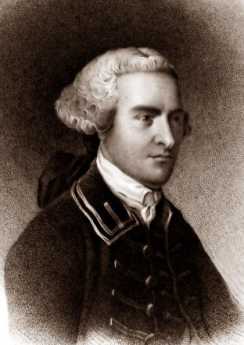
|
| John Hancock |
At this point, Morris made a staggering mistake. After all, he was a simple man of no great background, largely uneducated but fortified by his ascent in society from waterfront apprentice to the highest of social positions, a friend of George Washington and Benjamin Franklin, acclaimed as a financial genius, the man who saved the Revolution, very likely the richest man in America. For many years, he had harbored not the slightest doubt of his personal genius, his absolute honesty, and total dedication to the welfare of his country. To have this reputation and accomplishment sneered at by a worthless backwoodsman, a man who would stoop to using the votes of other backwoodsmen to accomplish self-enrichment, was intolerable. Morris announced and actually did sell out his entire business interest as a merchant, at a moment when he fully understood the new nation was about to enjoy an unprecedented post-war boom. So much for his self-interest. It helps to understand that John Hancock and Henry Laurens had done the same thing in Boston and Charleston, against what we now see as a strange aristocratic tradition of prejudice against bankers and businessmen. In even the few shreds of aristocracy now surviving in Britain and Europe, the tradition persists that a true aristocrat is so independently wealthy that no self-interested temptations can attract him away from purest attention to the public good. The original source of this wealth was the King, who conferred high favor on those who served the nation well. A curious exception was made for wealth in the form of land, the only dependable store of tangible wealth, and transactions in land. Wealth was something which came from God and the King in return for public service. Land ownership was its tangible storage and transfer medium. Otherwise, grubbing around with trade and manufacture was beneath the dignity of a true gentleman.
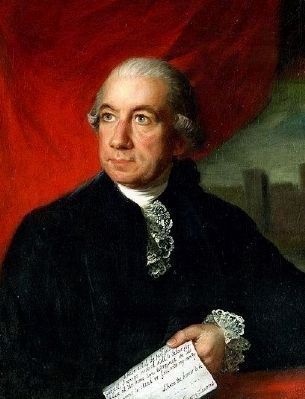
|
| Henry Laurens |
We now know what was coming. Wealth was soon to be the reward of skill and merit, recognized by fellow citizens in the marketplace, by consensus. Findlay and his friends wholly accepted this conclusion, unfortunately skipping the merit part of it for several decades. In their view, you were entitled to the money if you had the votes. As the nation gradually recognized that rewards must be durable, and once granted were yours to have and to hold, the new nation gradually came to see the need for durable ownership of property. Unless or until the owner places it out at risk in the marketplace, legislative votes may not affect its ownership. Our system ever since has rested on the three pillars of meritorious effort, assessment of value by the free market, and respect for pre-existing property. That's quite a change from the Divine Right of Kings, and therefore quite enough material to keep two political parties agitated for a couple of centuries. And quite enough change to bewilder even so brilliant a victim as Robert Morris.
State in Schuylkill Fishing Club
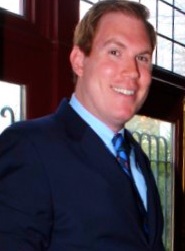
|
| Richard Romm |
Richard Romm, a rising historical scholar with a special interest in early Philadelphia, recently educated the Right Angle Club in the history of the Schuylkill Fishing Club in the State in Schuylkill, and was immediately accepted into membership. Of the Right Angle, that is, which is an old club by some standards, but scarcely a hundred years old in the eyes of the really old, old clubs.
The State in Schuylkill is an eating club, originally a fishing and eating club, apparently organized around the annual shad run up the river. The clubhouse, or Castle, was moved several times, in response to damming of the river, and is now located on the grounds of, or adjoining the edge of, Nicholas Biddle's estate on the Delaware River called Andalusia. One by one, the Atlantic Ocean rivers of America have been dammed and their annual shad migrations brought to an end, except through the city of Richmond, Va, so there was little point in moving The Castle to follow the fish. It remains, overlooking Delaware in spite of its name.
There seems to have been several name changes, the most important of which was to change the Colony of Schuylkill to the State of Schuylkill for obvious reasons. Originally, the Castle was roughly opposite the falls of Fairmount on the West Bank of the Schuylkill at about Girard Avenue; thus, from 1732 to 1822 located on Baron Warner's property called Eaglesfield. In 1822 it moved to Rambo's Rock (the Rambo family is said to be the oldest European settler family in Pennsylvania) opposite Bartram's Gardens, then finally in 1887 to Andalusia, Nicholas Biddle's country estate. The club was founded in 1732, and dates of movings are possibly hazy, possibly somewhat because of the reluctance of club officers to return the calls of inquiring historians. The State in Schuylkill claims to be the oldest organized men's club in the world, an honor contested by White's in London. The roots of this argument are found tangled in the vital issue of whether their age should be based on the formal organization of the clubs, or on the establishment of the coffee houses which housed the original clubs. Four books are said to have been written about club history, but we depend here on Mr. Romm.
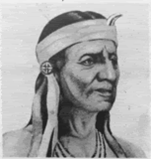
|
| Chief Tammenend |
There is also an unclear relationship with Chief Tammenend, possibly traceable to the shad run, but in any event to the Indian chief depicted with William Penn in the paintings by Benjamin West and Edward Hicks. May 1 is St. Tammany's day, growing into the fancy that he was the "Patron Saint of America", before a branch of the nation-wide Tammany association opened in New York and sort of tarnished up the name. Other traditions of the Fishing club have to do with wearing Mandarin hats, possibly having to do with the export of ginseng which was once abundant in our colonial suburbs, with a return cargo of Chinese dishware. All of the cooking is done by official citizens of the club. The quantities of food are remarkable; one 19th Century menu listed eleven pounds of meat per member. The club drink is a punch, the famous Fishhouse Punch, widely recognized to be rather strong. Its inventor is reputed to be Edward Shippen Willing, on the occasion of the first visit to the clubhouse by women guests. The quantity of alcoholic beverage at these events is especially remarkable in view of the Quaker origins of many original members of the club, but not necessarily of the guests. Among the various guests were Generals Grant, Meade, and McClellan. Dinner begins with two traditional toasts: to George Washington, and to Captain Sam Morris. Washington was appropriate enough, having a history of drinking a bottle of Madeira every day at lunch. But Sam? Captain Sam the Quaker?
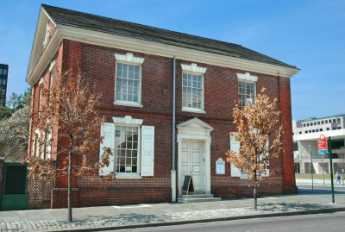
|
| Free Quaker Meetinghouse, Fifth and Arch Streets |
Somewhere in this tradition are allusions to the Free Quakers, Quakers who abandoned the peace testimony to fight the British. There is also the tradition of hostility to British rule which antedates the Revolution and may have some connection to the fanciful contention that their little state was not really part of Penn's colony. Captain (of the City Troop) Sam was a stalwart, possibly the sole founder, of the Gloucester (N.J.) Fox-hunting club. The history is passed down that 22 of the original 26 members of the First City Troop were members of the fox-hunting club, and many if not most were Quakers. The first "Governor" of the State in Schuylkill was Thomas Stretch, but the second Governor, from 1766 until his death, was Captain Sam. He was repeatedly referred to as the life of the club and held in the highest esteem by all. He was "read out" of the main Quaker Meeting, not so much for his drinking as for his flouting of Quaker belief in pacifism. He reputedly led a saber charge at the Battle of Trenton and was a leader of the City Troop in that revolution within a revolution at James Wilson's house, which rescued at least four future signers of the Constitution from a mob of militia which momentarily turned Jacobin.
Naturally, descendants of Quakers on both side of this uproar have been reluctant to say much about it. But somewhere within the history of Samuel Morris must be some important clues about the 18th Century splits within the Quaker Church, to say nothing of the revolt of the three Quaker colonies against British rule.
Political Parties, Absent and Unmentionable
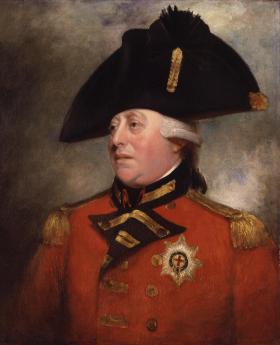
|
| King George III |
BECAUSE America had recently revolted to rid itself of King George III, the Constitutional framers of 1787 sought to construct a government forever free from one-man rule. Inefficiency could be accepted but central dictatorial power, never. It is unrealistic however to expect a wind-up toy to keep working forever, and our Constitution creates the same worry. After two centuries, some chinks have appeared.
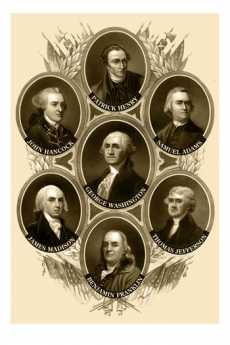
|
| Founding Fathers |
Political parties existed in 18th Century England and Europe, but the American founding fathers seem not to have worried about them much. Within ten years of Constitutional ratification, however, Thomas Jefferson had created a really partisan party which naturally provoked the creation of its partisan opposite. James Madison was slowly won over to the idea this was inevitable, but George Washington never budged. Although they were once firm friends, when Madison's partisan position became clear to him, Washington essentially never spoke to him again. Andrew Jackson, with the guidance of Martin van Buren, carried the partisan idea much further toward its modern characteristics, but it was the two Roosevelts who most fully tested the U.S. Supreme Court's tolerance for concentrating new powers in the Presidency, and Obama who recognized that the quickest way to strengthen the Presidency was to weaken the Legislative branch.
Dramatic episodes of this history are not central to present concerns, which focuses more on the largely unnoticed accumulations of small changes which bring us to our present position. Wars and economic crises induced several presidents, nearly as many Republicans as Democrats, to encourage migrations of power advantage which never quite returned to baseline after each crisis. Primary among these migrations was the erosion of the original assumption of perfect equality among individual members of Congress. A new member of Congress today may tell his constituents he will represent them ably, but when he arrives for work he is figuratively given an office in the basement and allowed to sit on empty packing cases. This is not accidental; the slights are intentional warnings from the true masters of power to bumptious new egotists, they will get nothing in their new environment unless they earn it. Not a bad idea? This schoolyard bullying is a very bad idea. If your elected representative is less powerful, you are less powerful.
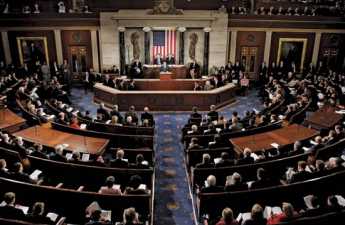
|
| Houses of Congress |
Partisan politics begins with vote-swapping, evolves into a system of concentrating the votes of the members into the hands of party leaders, and ultimately creates the potential for declaring betrayal if the member votes his own mind in defiance of the leader. The rules of the "body" are adopted within moments of the first opening gavel, but they took centuries to evolve and will only significantly change direction on those few occasions when newcomers overpower the old-timers, and only then if some rebel among the old timers takes the considerable trouble to help organize them. In the vast majority of cases, after adoption, the opportunity to change the rules is then effectively lost for two years. Even the Senate, with six-year staggered terms, has argued that it is a "continuing body" and need not reconsider its rules except in the face of a serious uprising on some particular point. Both houses of Congress place great weight on seniority, for the very good purpose of training unfamiliar newcomers in obscure topics, and for the very bad purpose of concentrating power in "safe" districts where party leaders are able to exercise iron control of the nominating process. Those invisible bosses back home in the district, able to control nominations in safe districts, are the real powers in Congress. They indirectly control the offices and chairmanships which accumulate seniority in Congress; anyone who desires to control Congress must control the local political bosses, few of whom ever stand for election to any office if they can avoid it. In most states, the number of safe districts is a function of controlling the gerrymandering process, which takes place every ten years after a census. Therefore, in most states, it is possible to predict the politics of the whole state for a decade, by merely knowing the outcome of the redistricting. The rules for selecting members of the redistricting committee in the state legislatures are quite arcane and almost unbelievably subtle. An inquiring newsman who tries to compile a fifty-state table of the redistricting rules would spend several months doing it, and miss the essential points in a significant number of cases. The newspapers who attempt to pry out the facts of gerrymandering are easily gulled into the misleading belief that a good district is one which is round and compact, leading to a front-page picture showing all districts to be the same physical size. In fact, a good district is one where both parties have a reasonable chance to win, depending for a change, on the quality of their nominee.
So that's how the "Will of Congress" is supposed to work, but the process recently has been far less commendable, and in fact, calls into dispute the whole idea of a balance of power between the three branches of government. We here concentrate on the Health Reform Bill ("Obamacare") and the Financial Reform Bill ("Dodd-Frank"), which send the same procedural message even though they differ widely in their central topic. At the moment, neither of these important pieces of legislation has been fully subject to judicial review, so the U.S. Supreme Court has not yet encumbered itself with stare decisis of its own creation.
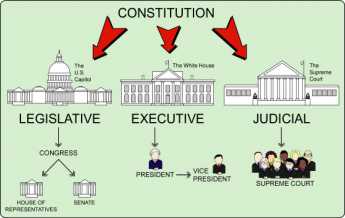
|
| Three branches of government |
In both cases, bills of several thousand pages each were first written by persons who if not unknown, are largely unidentified. It is thus not yet possible to determine whether the authors were affiliated with the Executive Branch or the Legislative one; it is not even possible to be sure they were either elected or appointed to their positions. From all appearances, however, they met and organized their work fairly exclusively within the oversight of the Executive Branch. Some weighty members of the majority party in Congress must have had some involvement, but it seems a near certainty that no members of the minority party were included, and even comparatively few members of highly contested districts, the so-called "Blue Dogs" of the majority party. It seems safe to conjecture that a substantial number either represent special interest affiliates or else party faithful from safe districts with seniority. The construction of the massive legislation was conducted in such secrecy that even the sympathetic members of the press were excluded, and it would not be surprising to learn that no person alive had read the whole bill carefully before it was "sent" to Congress. It's fair to surmise that no member of Congress except a few limited members of the power elite of the majority party were allowed to read more than scattered fragments of the pending legislation in time to make meaningful changes.
The next step was probably more carefully managed. No matter who wrote it or what it said, a majority of the relevant committees of both houses of Congress had to sign their names as responsible for approving it. Because of the relatively new phenomenon of live national televising of committee procedure, the nation was treated to the sight of congressmen of both parties howling that they were only given a single day to read several thousand pages of previously secret material -- before being forced to sign approval of it by application of unmentioned pressures enabled by the rules of "the body". When party members in contested districts protested that they would be dis-elected for doing so, it does not take much imagination to surmise that they were offered various appointive offices within the bureaucracy as a consolation. As it turned out, the legislation was only passed narrowly on a straight-party vote, so there can be a considerable possibility of its likely failure if the corruptions of politics had been set aside, with members voting on the merits. Nevertheless, since this degree of political hammering did result in a straight-party vote, it leaves the minority party free to overturn the legislation when it can. The prospect of preventing an overturn in succeeding congresses seems to be premised on "fixing" flaws in the legislation through the issuance of regulations before elections can open the way to overturn of the underlying authorization. Legislative overturn, however, is very likely to encounter filibuster in the Senate, which presently requires 40 votes. Even that conventional pathway is booby-trapped in the case of the Dodd-Frank Law. The Economist magazine of London assigned a reporter to read the entire act, and relates that almost every page of it mandates that the Executive Branch ("The Secretary shall") must take rather vague instructions to write regulations five or ten times as long as the Congressional authorization, giving the specifics of the law. The prospect looms of vast numbers of regulations with the force of law but written by the executive branch, emerging long after the Supreme Court considers the central points, years after the authorizing congressmen have had a chance to read it, and well after the public has rendered final judgment with a presidential election. The underlying principle of this legislation is the hope that it will later seem too disruptive to change a law, even though most of it was never considered by the public or its representatives.
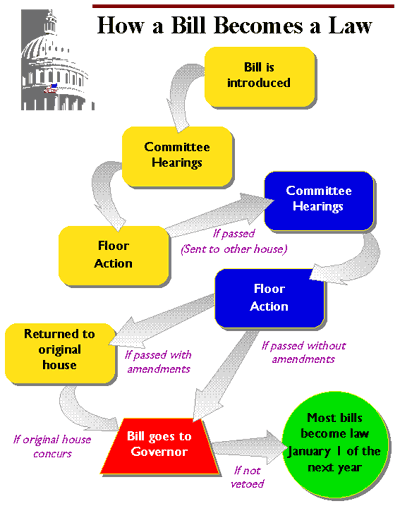
|
| Bill become a Law |
The "regulatory process" takes place entirely within the Executive branch. Congress passes what it terms "enabling" legislation, containing language to the effect that the Cabinet Secretary shall investigate as needed, decide as needed, and implement as needed, such regulations as shall be needed to carry out the "Will" of Congress. Since the regulations for two-thousand-page bills will almost certainly run to twenty thousand pages of regulations with the force of law, the enabling committee of Congress will be confronted with an impossible task of oversight, and thus will offer few objections. The Appropriations Committees of Congress, on the other hand, are charged with reviewing every government program every year and have the power to throttle what they disapprove of, by the simple mechanism of cutting off the program's funds. Members of the coveted Appropriations Committees are appointed by seniority, come from safe districts, and are attracted to the work by the associated ability to bestow plums on their home districts. By the nature of their appointment process, unworried by the folks back home but entirely beholden to the party bosses, they have the latitude to throttle anything the leadership of their party wants to throttle badly enough. The outcome of such take-no-prisoners warfare is not likely to improve the welfare of the nation, and therefore it is rare that partisan politics are allowed to go so far.
The three branches of government have become unbalanced. These bills were almost entirely written outside of the Legislative branch, and the ensuing regulations will be written in the Executive branch. The founding fathers certainly never envisioned that sweeping modification will be made in the medical industry and the financial industry, against the wishes of these industries, and in any event without convincing proof that the public is in favor. This is what is fundamentally wrong about taking such important decisions out of the hands of Congress; it threatens to put the public at odds with its government.
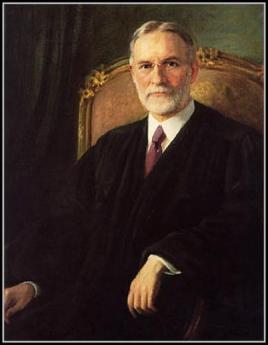
|
| Justice George Sutherland |
There is no need to go further than this, harsher words will only inflame the reaction further than necessary to justify a pull-back. And yet, the Supreme Court would do us mercy if it doused these flames; the Supreme Court needs a legal pretext. May we suggest that Justice George Sutherland, who sat on the court seventy years ago, may have sensed the direction of things, short of using a particular word. Justice Sutherland recognized that although it is impractical to waver from the principle that ignorance of the law is no excuse, it is entirely possible for a person of ordinary understanding to read law in its entirety and still be confused as to its intent. He thus created a legal principle that a law may be void if it is too vague to be understood. In particular, a common criminal may be even less able to make a serious analysis. Therefore, at least in criminal cases, a lawyer may well be void for vagueness. In this case, we are not speaking of criminals as defendants or civil cases of alleged damage of one party by a defendant. Here, it is the law itself which gives offense by its vagueness, and Congress which created the vagueness is the defendant. Since we have just gone to considerable length to describe the manner in which Congress is possibly the main victim, this situation may be one of the few remaining ones where a Court of Equity is needed. That is, an obvious wrong needs to be corrected, but no statute seems to cover the matter. The Supreme Court might give some thought to convening itself as a special Court of Equity, on the special point of whether this legislation is void for vagueness.
We indicated earlier that one word was missing in this bill of particulars. That would be needed, to expand the charge to void for intentional vagueness, an assessment which is unflinchingly direct. It suggests that somewhere in at least this year's contentious processes, either the Executive Branch or the officers of the congressional majority party, or both, intended to achieve the latitude of imprecision, that is, to do as it pleased. Anyone who supposes the general run of congressmen voluntarily surrendered such latitude in the Health and Finance legislation, has not been watching much television. Given the present vast quantity of annually proposed legislation, roughly 25,000 bills each session, the passage of a small amount of vague legislation might only justify voiding individual laws, whereas an undue amount of it might additionally justify a reprimand. However, engineering laws which are deliberately vague might rise to the level of impeachment.
Void for Vagueness

|
| Question Mark |
BECAUSE otherwise, everyone would plead ignorance, ignorance of the law has been dismissed as a defense for thousands of years. What, then, is the situation when the statute itself is accused? Here, a group of citizens accuses the government of enacting vague laws, conceivably with the malicious intent to give government officers a free hand. Only the U.S. Supreme Court may decide Constitutional issues, and nine Justices are certainly inadequate to cope with a huge vagueness project. The Court must at least define a method for coping with imprecision. What is to be done with this?
 Is it really any longer true that ignorance of the law is no excuse? 
|
This novel proposition is a recent one, mostly because the volume of laws has steadily grown since 1787, when we began the Republic without any statutes at all, to the present gargantuan size of the Federal, State and Local Codes requiring hundreds of feet of shelf space in a library. No human brain can contain all that information at once, not even to mention the interpretive Regulations which grow by hundreds of thousands of pages each year. The limits of practical governance by traditional methods have passed the point where ignorance of the law is a theory, it is an absolute certainty for every citizen in most situations. Is it thus really any longer true that ignorance of the law is no excuse? Perhaps modern computer search capability has advanced to the point where it can conquer this problem for judges in an appellate situation, but woe unto the financier or automobile driver who professes ignorance of the state of judicial dispute resting in the system. Sometime relatively soon, some legal genius must figure out a sensible, workable, way to reconsider the rule that ignorance is no excuse when plainly anything other than ignorance is a laughable pretense.
But this muddle is only a background for a new twist to the same issue. The synthetic process has now created a growing apprehension that duly elected officials have passed laws which are deliberately vague, forcing the country to surrender decisions to a tyrannical process. Leave motive and intent out of the discussion; a tyrant is being created whether a tyrant seeks the crown or not. Just review recent history.
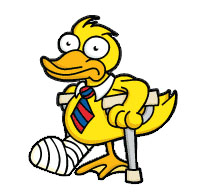
|
| Lame Duck |
We now grow accustomed to seeing proposed legislation thousands of pages long, appearing on the desks of elected congressmen who have been given a day or two, or sometimes less than a day, to approve them. The authors of this proposed legislation are often quite unidentifiable, and might sometimes not even be officials of the government. For a while, there was some talk of appointing "Czars" for certain areas of activity, but this has apparently provoked too much Congressional resistance. These multi-thousand page bills appear out of nowhere in particular, nominally authorized by the Speaker, the Committee Chairman, or some other official of Congress whose freedom of action is actually tightly controlled by arcane but irresistible partisan politics. A legislative body pretending that every member is the equal of every other, is in fact ruled with an iron hand.
Elected representatives of the people, charged with writing our laws, who even happen to belong to the majority political party, are powerless to refuse to adopt the legislation they have not read, and the minority is even more dismissively ignored. Confounding even careful reading of small sections of these bills, they are vague, potentially intentionally so. There is scant opportunity afforded legislators to question the authors of these legislative piles, not even the opportunity to have them reveal their names. Subscribe to this mystery package, or suffer unspoken political punishments. We are told assurances are privately given there will be an opportunity to correct errors when regulations are written by the Executive branch. The Legislative branch effectively removed itself from the expenditure of a trillion dollars for a medical reform that no one could lucidly explain, affecting a sixth of the gross domestic product. Within a month, this "reform" was followed by a highly similar process directed at the financial system of the nation, which likewise bears almost no resemblance to the problems it claims prompted the action. Small wonder the countryside is dotted with Tea Parties, and small wonder they are confused by what they want. Chief among their objectives is a demand to return to an understandable system, controlled by the legislative branch, not the executive one.
Whether the applicable term is "vagueness" or whether an underlying motive is to be alleged by calling it "deliberate ambiguity", a former Justice of the U.S. Supreme Court once supplied an adequate slogan for these legal barricades. Justice George Sutherland, who sat on the court from 1922 to 1938, constructed the legal standard for the unconstitutionality of criminal cases called Void for Vagueness . It seems a sufficiently evocative slogan for fall election campaigns, and it might even serve as a legal claim in a Supreme Court test of the matter.
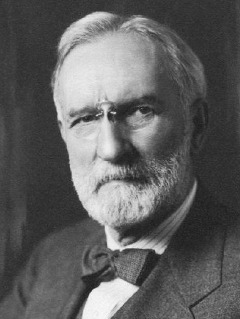
|
Meanwhile, we have wars to fight, and the deepest recession in eighty years, plus whatever events national or international news may force us to contend with. A monumental Supreme Court test seems an almost welcome alternative. To make it possible, the Court will have to resolve the difficulty that this issue is neither criminal nor civil in the usual sense, and there is no third alternative. Furthermore, there is the picky-picky quibble that the doctrine of "void for vagueness" has only previously been used in criminal cases. We will have to endure the Republican resurrection of George Sutherland as a former American Bar President, whose elevation to the Supreme Court was so anticipated by everyone that he was unanimously confirmed, without hearings, the day he was nominated.
The fact is, popping the bubble of "void for vagueness" in this particular political tap dance is only an early warning that the nation is already inundated in a sea of bewildering rules. To the point where ignorance of the law must be acknowledged to be the common fate of all citizens. The law must soon address the matter, uncharacteristically remembering that the first step in resolving any true crisis is to decide which rule must be broken.
Rearranging Mickles, Makes Muckles
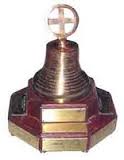
|
| Right Angle |
Thank you, Mr. President. Tonight I'm to discuss Right Angle Club's odd contribution to book publishing, with emphasis on history books. To make it easier for the audience to follow, I originally titled the speech Three Threes, for three meanings, in three categories each. It touched -- in threes -- on 1) book technology, 2) variable proportions of facts and opinion, and 3) pitfalls to success. Times three, made nine bases to touch, so that evening at the Philadelphia Club I had to hustle. For a reading audience, however, it's more comfortable to revert to the writing style which I am advocating, since it illustrates as it explains.

|
| Philadelphia-Reflections |
First, let's deconstruct the essay you are reading. Ten years ago, I began taking notes at the Right Angle Club's Friday lunches, writing reviews of the speakers. The younger generation calls it "blogging" when you then broadcast such essays on the Internet; that's how I started the journey, giving it the title of Philadelphia Reflections, which is reached by entering www.Philadelphia-Reflections.com/topic/233.htm in the URL box of any search engine, on any browser. If you prefer, you can simply click on the underlined lettering in this blog, a process called "linking". The blogs in this website concentrate on the Philadelphia "Scene" because that's what our speakers usually do. Our club has met since 1922, so by rights, it might contain ten thousand blogs, but unfortunately, I arrived late, so we only have 3000. Call them 3000 beads in a bowl, subdivided into annual bowls of beads. After more accumulation, they were re-connected as Collections for ease of use in re-assembly. Sometimes they are chronological, sometimes by subject matter; the purpose is to expedite searching for things, placing them in temporary categories, ultimately producing a book, a speech, or an essay. When an archive grows to this size, it's surprising how easy it is to lose something you know you have written.
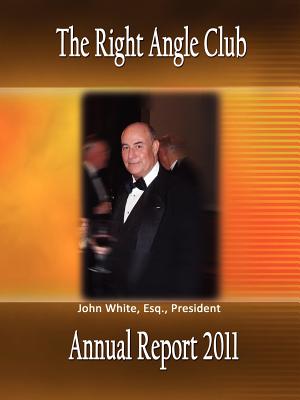
|
| The Right Angle Book |
After a while themes emerge, so if I picked similar beads from the combined bowl of four hundred, then groups of similar beads become necklaces. Just as green beads make a green necklace, blogs about Ben Franklin make up a Franklin topic. Selected but related necklaces can then be artfully arranged into a rope of necklaces, which is to say, a book about Philadelphia, from William Penn to Grace Kelly. Almost without realizing it, I had been writing quite a big book without foreseeing where it would go. I described this curiosity to my computer-savvy son, who wrote a computer program to make it simple for anyone to rearrange blogs and topics of aggregated material. Simple, that is, for an author re-arrange his random thoughts repeatedly, as if to wander among his own random thoughts, and only in retrospect extract the books. Most authors are not Scotsmen, but they eventually learn that Many a Mickle -- Makes a Muckle. Many authors, however, once imagined they sat down to write a book from start to finish, only to discover one was already there, waiting to emerge if the Mickles could be re-arranged. At the end of the process, it is of course often necessary to insert a few bridging sentences to smooth out the lumps. However, when this outcome hasn't been planned, most authors must totally rewrite their material into a coherent book, once they finally realize where it has been going. Since I am also in the publishing business in a small way, I was able to guide my son into automating several subsequent steps of conventional publishing so any author could perform them without a publisher.
That begins to make book authorship resemble fine art; the artist does it all except marketing. In marketing fine art, it is conventional for the artist to receive 50% of the retail price, whereas in book publishing an author only receives 10%, and must sell five books to achieve an equal result. With refinement, using this system of authorship promises to incentivize the writing of many superior books, in smaller individual numbers, but an overall greater reading audience. True, "file this program" also aspires to eliminate the whole old-fashioned assembly line of publishing, which is in the process of dying anyway, but without a useful replacement.
So here's the cluster of three components -- blogs re-assembled into topics, topics re-assembled into volumes, with copy editing, spell checking and book design mostly performed by the computer. Whether paper books will completely transform into e-books is not so certain, but will mainly depend on computer design, not book design. At the moment, e-books are making their greatest progress in fiction books, for technical reasons. No doubt their negligible production costs will promote the emergence of vanity publishing, works of transient interest, and otherwise unsalable books. For this to work, will require not merely a further computer revolution, but a revolution within information circles. I'm afraid I am too old to indulge in such distant visions and can only hope to advance it a stage or two.
Rossperry1
Rossperry4
1250Gulph
f166f166
Xy34Ty12
July 23,2017
LastPass--call George
More, or Fewer, Raisins in the Pudding

|
| manuscripts |
Some book publishers do indeed regard history as handfuls of paper in a manuscript package, mostly requiring rearrangement in order to be called a book. Librarians are more likely to see historical literature dividing into three layers of fact mingled with varying degrees of interpretation: starting with primary sources, which are documents allegedly describing pure facts. Scholars come into the library to pore over such documents and comment on them, usually to write scholarly books with commentary, called secondary sources . Unfortunately, many publishers reject anything which cannot be copyrighted or is otherwise unlikely to sell very well, however important historians say it may be. Authors of history who make a living on it tend to focus on the general reading public, generating tertiary sources, sometimes textbooks, sometimes "popularized" history in rising levels of distinction. Sometimes these authors go back to original sources, but much of their product is based on secondary sources, which are now much more reliable because of the influence of a German professor named Leopold von Ranke. Taken together, you have what it is traditional to say are the three levels of historical writings.
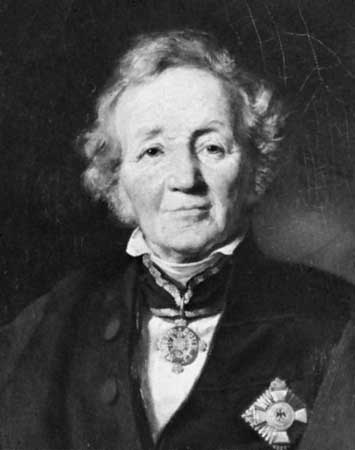
|
| Leopold von Ranke |
Leopold von Ranke formalized the system of documented (and footnoted) history about 1870, vastly improving the quality of history in circulation by insisting that nothing could be accepted as true unless based on primary documents. Von Ranke did in fact transform Nineteenth-century history from opinionated propaganda in which it had largely declined, into a renewed science. At its best, it aspired to return to Thucydides, with footnotes. That is, clear powerful writing, ultimately based on the observations of those who were actually present at the time. Unfortunately, Ranke also encased historians in a priesthood, worshipping piles of documents largely inaccessible to the public, often discouraging anyone without a PhD. from hazarding an opinion. The extra cost of printing twenty or thirty pages of bibliography per book is now a cost which modern publishing can ill afford, making modern scholarship a heavier task for the average graduate student because the depth of scholarship tends to be measured by the number of citations, but incidentally "turning off" the public about history. All that seems quite unnecessary since primary source links could be provided independently (and to everyone) on the Internet at negligible cost. And supplied not merely to the scholar, but to any interested reader, no need to labor through citations to get at documents in a locked archive.

|
| E-Books |
The general history reader remains content with tertiary overviews, and a few brilliant secondary ones because document fragility bars public access to primary papers, but many might enjoy reading primary sources if they were physically more available. The general reader also needs impartial lists of "suggested reading", instead of the "garlands of bids", as one wit describes the bibliographies employed by scholars. If you glance through the annual reports of the Right Angle Club, you will see I have increasingly included separate internet links to both secondary as well as primary sources, because the bibliographies within the secondaries lead back to the primaries. Unfortunately, you must fire up a computer to access these treasures. The day soon approaches when scholars can carry a portable computer with two screens, one displaying the historian's commentary while the second screen displays related source documents. It seems likely history on paper will persist while that remains cheaper, but also because e-books make it hard to jump around. Newspapers and magazines particularly encounter this obstacle, because publication deadlines give them less time for artful re-arrangement. E-books are sweeping the field in books of fiction because fiction is linear. Non-fiction wanders around, even though this subtlety is often unappreciated by computer designers.
Prisoners in the Stone
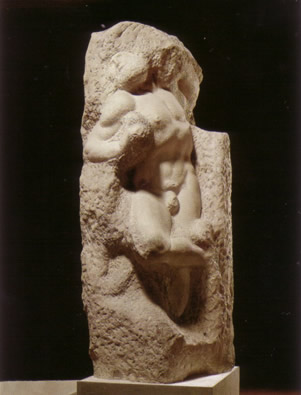
|
| A Prisoner of the Stone |
The first revolution in book authorship has already taken place. Almost all manuscripts arrive on the publisher's desk as products of a home computer. In fact, many publishers refuse to accept manuscripts in any other form. Not only does this eliminate a significant typing cost to the publisher, but it allows him to experiment with type fonts and book design as part of the decision to agree to publish the book. What's more, anyone who remembers the heaps of paper strewn about a typical editor's office knows what an improvement it can be, just to conquer the trash piles. To switch sides to the author's point of view, composing a book on a home computer has greatly facilitated the constant need for small revisions. An experienced author eventually learns to condense and revise the wording in his mind while he is still working on the first draft. However, even a novice author is now able to pause and select a more precise verb, eliminate repetition, tighten the prose. He can go ahead and type in the sloppy prose and then immediately improve it, word by word. The effect of this is to leave less for the copy editor to do, and to increase the likelihood the book will be accepted by the publisher. The author is more readily able to see how the book looks than he would have been with mere typescript.
It must be confessed, however, that a second revolution caused by the computer has already come -- and gone. Not so long ago, I once linked primary documents already on the Internet to the appropriate commentary within my blog. The idea was to let the reader flip back and forth to the primary sources if he liked, and without interrupting the flow of my supposedly elegant commentary. In those early days of enthusiasm, volunteers were eager to post source material into the ether, just asking for someone to read it eagerly. I had linked up Philadelphia Reflections to nearly a thousand citations when an invincible flaw exposed itself. Historians were eager enough to post source documents, but not so eager to maintain them. One link after another was dropped by its author, producing a broken link for everyone else. The Internet tried to locate something which wasn't there, slowing the postings to a pitiful speed. Reluctantly, I went through my web site, removing broken links and removing most links. Maybe linking was a good idea, but it didn't work. There is thus no choice but to look to institutional repositories for historical storage, and funding to pay for maintaining availability for linkage. It is not feasible to free-load, although only recently it had seemed to be.
This pratfall assumed technology would provide more short-cuts than in fact it would. A more difficult obstacle emerges after some thought given to the nature of writing history because it seems remarkably similar to Michelangelo's description of how to carve a statue. Asked how to carve, he said it was simple. "Just chip away the stone you don't want, and throw it away." Michelangelo saw statues as "prisoners of the stone" from which it was carved, while insights and generalizations of history emerge from a huge mass of unsorted primary documents. But there is a different edge to writing history. Uncomfortably often, the process of writing history is one of disregarding documents which fail to support a certain conclusion, often documents which send inconvenient messages to modern politics. Carried too far, de-selecting disagreeable documents amounts to attempting to destroy alternative viewpoints. By this view of it, what the author chooses to disregard, is then as important as what he chooses to include. Unless awkward linkages are consciously maintained in some form, they will soon enough disappear by themselves. It is a great fallacy to assume that ancient history can be isolated from current politics, or even to believe that history teaches the present. Often, it is just the other way around.
Dithering History

Dithering is originally a photographic term, referring to the process of smoothing out rough parts of an excessively enlarged photo. Carried over to the profession of writing history, the term alludes to smoothing over the rough parts of a narrative with a little unacknowledged conjecturing.
In photography, when a picture is enlarged too far, it breaks apart into bits and pieces. Dithering fills in the blank gaps between "pixels" actually recorded by the camera. It amounts to guessing what a blank space should look like, based on what surrounds its edges. In the popular comic strip, Blondie's husband Dagwood works for an explosive boss called Mr. Dithers, who "dithers" between outbursts, when he vents his frustration. But that's to dither in the Fifteenth-century non-technical sense, meaning to hesitate in an aimless trembling way. If the cartoonist who draws Blondie will forgive me, I have just dithered in the sense I am discussing in history. I haven't the faintest idea what the cartoonist intended by giving his character the name of Mr. Dithers, so I invented a plausible theory out of what I do know. That's what I mean by a third new meaning for either, in the sense of "plausible but wholly invented". It's fairly common practice, and it is one of the things which Leopold von Ranke's insistence on historical documentation has greatly reduced.
To digress briefly about photographic dithering, the undithered product is of degraded quality, to begin with. Dithering systematically removes the jagged digital edge, and restores the original analog signal. In that case, dithering the result brings it back toward the original picture. That's not cheating, it's the removal of a flaw.
Dithering of history comes closer to resembling a different photographic process, which samples the good neighboring pixels on all sides of a hole and synthesizes an average of them to cover the hole. It works best with four-color graphics, converting them to 256-color approximations. But the key to all photographic approaches is to apply the same formula to all pixel holes. That's something a computer can do but a historian can't, and historical touch-ups seem less legitimate because the reader can't recognize when it has happened, can't reverse it by adding or removing a filter. Dithering may somewhat improve the readability of the history product occasionally, usually at the expense of inaccuracy, sometimes large inaccuracy. It's conventional among more conscientious writers to signal what has happened by signaling, "As we can readily imagine Aaron Burr saying to Alexander Hamilton just before he shot him." That's less misleading than just saying "Burr shouted at Hamilton, just before he blew his brains out." The latter sends no signal or footnote to the reader, except perhaps to one who knows that Hamilton was shot in the pelvis, not the head. In small doses, dithering may harmlessly smooth out a narrative. But there's a better approach, to write history in short blogs of what is provable, later assembling the blogs like beads in a necklace. Bridges may well need to be added to smooth out the lumps, but that becomes a late editorial step, consciously applied with care. And consequently, author commentary is more likely to recognized as commentary, rather than rejected as fiction.
Dithering the holes is often just padding. It would be better to spend the time doing more research.
Our President Shows His Stuff
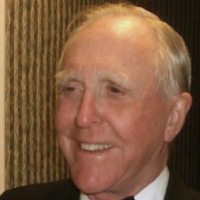
|
| President David Richards |
Three of our members recently flew to Argentina to play Rugby. That was Jack Nixon, John Wetzel, and our President, David Richards. We have all grown a little tired of being told that football is for sissies; Rugby, now that's a real man's sport. Down there, South of the Border, they really know how to play soccer, so Rugby is a natural for the Argentines. Well, eventually they came back, and we discover that our President was awarded a medal. John said it took him twenty years to win a medal, but Richards won it the first time he tried.

|
| Rugby |
Since he was at the microphone, President David had no choice but to tell us how it happened. It seems the new team had uniform pants which were a couple of inches shorter than his underwear, so in desperation, he decided to play without any underwear. At one moment crucial to the game, he was holding the ball, but the Argentine tackled him by grabbing the pants-top from behind. And so our hero was standing there pantless, holding the ball. So he was faced with an awful choice: either he must let down the team, or else run for the goal, dressed (or undressed) as he was.
So, of course, he ran for the goal. The bleachers went wild, cellphones clicked themselves silly, and our hero made the goal. And naturally, the Argentines respected excellence, so they gave him a medal.
The Burdens of the Rich
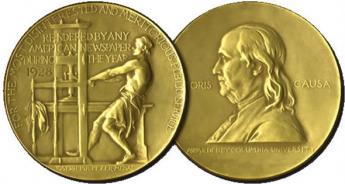
|
| Pulitzer Prize |
The details are hazy, but sometime after graduating as a Registered Nurse my mother-in-law had a spell as a private-duty nurse for the daughter of Mrs. Pulitzer, and, I suppose later, became head nurse in the University of Pennsylvania unit in France, during World War I. Let's talk about Mrs. Moore, first. The Pulitzers had given the Pulitzer Prize, owned a chain of newspapers, and naturally owned several houses. Although I have to imagine there was a Mr. Moore somewhere, everything was referred to as if it belonged to Mrs. Moore, and Mr. Moore never appeared in the stories. They had a child with rheumatic fever, who was the reason they had a private nurse. Mrs. Moore devoted one afternoon a week to pay bills, which were numerous because of all the staff they employed at several houses scattered around the country, in New York, at Bar Harbor, and so on. One day, seated at her desk, she turned to the nurse and asked her if she had any idea what a burden it all was.
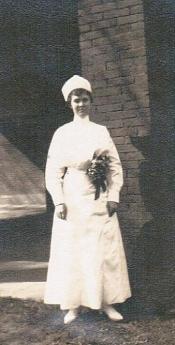
|
| Miss Brothers (Ms. Miriam Blakely) |
My mother-in-law had always been very self-assured, and this time she drew herself up in full nurse dignity. "Mrs. Moore," she said, "I don't feel a bit sorry for you." But as more than a century goes past, I have come to see the rich lady had a point. What purpose is there to be rich, if you are expected to spend large amounts of time being a clerk? There were diamonds and minks to be got out of storage for the banquets and then put away with moth crystals. There were silver spoons to be counted, and portraits of ancestors to be varnished. The gardener seemed to dip into the best wine, the kitchen maid didn't clean up properly, the roof in the Florida house leaked. Instead of being the rich lady with a glamorous life, she was at best acting the part of the mayor of a small town. And instead of being awestruck, she hired nurse was in effect telling her she was a spoiled brat. The story dramatizes, to be the head nurse of a famous hospital, helping the doughboys win the war to end all wars, that was somebody to look up to.
It wasn't the work. Anyone who has watched nurses rebels against typewriters in one generation and sit glued to a monitor with a very similar keyboard in the computerized phase of change can recognize it wasn't the work. Not even if it means picking bloody sponges off the operating room floor, or the final degradation of digging out an impaction with others watching you do it. The hallmark, the final test, was to do it without hesitation and never display the slightest sign of complaint. Because the point of pride was to be useful without the slightest sign of disgust. Dignity, doing something which other girls recoiled at doing. The snotty little brats.
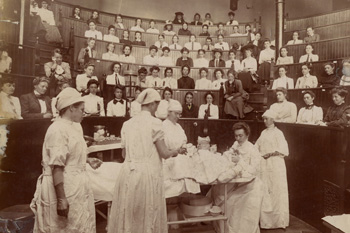
|
| Nursing School |
It took some time for me to recognize that the image of nursing was formed in Nursing School, so strongly that the Nursing School was really the heart of any hospital. They would come back to reunions for generations, regaling their old friends with stories of Miss This or That, the tough old head nurse with a heart of gold. The head nurse was the mother-figure and the role model. Anything you could do, she could do better. When she dismissed you, you deserved to be dismissed. You didn't know starch until you saw her starched uniform. And the cap. You could tell what school had trained her, after a glance at her cap. And when the caps went, the uniforms were replaced with green un-ironed operating room gowns, not the same thing, at all. The schools were replaced by money from the US Government, sought after by the nursing lobby, and eagerly accepted by the administrators of hospitals, who didn't know what they were doing. The girls didn't know any better, either, thinking about what they needed was a diploma. So now we contemplate a nurse with a bachelor's degree, or even a doctorate, without the faintest idea what to do, placed in charge of practical nurses in their forties who know everything about nursing worth knowing. So they retreat into the nurse's lounge, writing volumes of notes which no one ever reads. The girls who enter the few schools left are much the same. Show me a well-run hospital and I'll show you a hospital that still has a school. Show me a hospital that recruits its nurses from a nearby university, and I'll show you a hospital which is run by administrators.
69 Blogs
The Virginian: A Philadelphian Goes West
 Owen Wister, that unchallenged example of the Philadelphia Gentleman, established his literary reputation as creator of the American Cowboy in his first novel.
Owen Wister, that unchallenged example of the Philadelphia Gentleman, established his literary reputation as creator of the American Cowboy in his first novel.
How to Live Off an Investment Portfolio
It's a hard rule, but don't ignore it.
Rosencrantz and Gildenstern (4)
 After an idea "grows legs and runs around", it no longer belongs to its originator
After an idea "grows legs and runs around", it no longer belongs to its originator
Robert Barclay Justifies Quaker Meetings
 Robert Barclay, one of the handfuls of English philosophers of enduring note, came close to establishing the doctrines of the Quaker Church, a religion with no formal doctrine.
Robert Barclay, one of the handfuls of English philosophers of enduring note, came close to establishing the doctrines of the Quaker Church, a religion with no formal doctrine.
Rise and Fall of Books
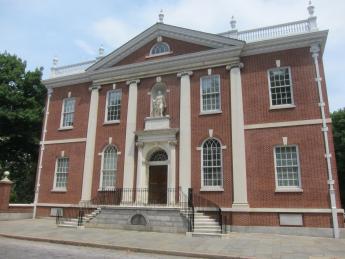 The The Director of America's first library sees books as mainly a 19th Century phenomenon.
The The Director of America's first library sees books as mainly a 19th Century phenomenon.
Revolt of the Admirals: The Fight for Naval Aviation, 1945-1950
The National Security Act of 1947, intended to unify the separate armed forces services under a single Defense Secretary, failed to settle the deeper issue that divided them: the debate over roles and missions.
Restoring the Gold Standard by Levering Judges' Salaries
 Advocates of a gold standard may just have found an effective "gotcha".
Advocates of a gold standard may just have found an effective "gotcha".
Reservoir on Reservoir Drive

Report Identity Theft to the Secret Service
 Identity theft is now under the jurisdiction of the U.S. Secret Service.
Identity theft is now under the jurisdiction of the U.S. Secret Service.
Rejecting Preventive Health Care for Good Reason
 No one seems to be considering the opinion of older citizens about preventive health care.
No one seems to be considering the opinion of older citizens about preventive health care.
Recalling the Names of Acquaintances
 As we get older, the speed of recall seems to slow down for most people, leading to a problem remembering names. A number of senior citizens have figured out ways to cope.
As we get older, the speed of recall seems to slow down for most people, leading to a problem remembering names. A number of senior citizens have figured out ways to cope.
Rare Causes of High Blood Pressure
 The treatment of hypertension is one of the great medical triumphs of the 20th Century. But we still don't know what causes it.
The treatment of hypertension is one of the great medical triumphs of the 20th Century. But we still don't know what causes it.
Quakerism and the Industrial Revolution
 The Industrial Revolution extended over two centuries and was more important than all the wars, governments, and agitations of its time. Quakerism began at the same time, in the same place. Was that only coincidence?.
The Industrial Revolution extended over two centuries and was more important than all the wars, governments, and agitations of its time. Quakerism began at the same time, in the same place. Was that only coincidence?.
Quaker Efficiency Expert: Frederick Winslow Taylor 1856-1915
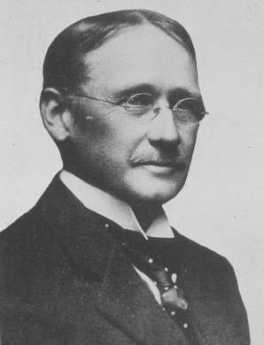 A rich Germantown Quaker boy became the world's symbol of the efficiency expert with a stop-watch, hated by Labor Unions but admired by Lenin and Stalin. He enriched the Midvale Steel Company with his invention of high-speed steel but was fired by Bethlehem Steel for eliminating too many employs. 000..0ees. Peter Drucker placed him in the class of innovators beside Darwin and Freud.
A rich Germantown Quaker boy became the world's symbol of the efficiency expert with a stop-watch, hated by Labor Unions but admired by Lenin and Stalin. He enriched the Midvale Steel Company with his invention of high-speed steel but was fired by Bethlehem Steel for eliminating too many employs. 000..0ees. Peter Drucker placed him in the class of innovators beside Darwin and Freud.
Powel House, Huzzah!
 On 3rd Street in Philadelphia's Society Hill, stands the finest surviving Georgian House of what Washington and Madison called the Republican Court. A great many traditions of American high society were formed in the second-floor dining room of this house.
On 3rd Street in Philadelphia's Society Hill, stands the finest surviving Georgian House of what Washington and Madison called the Republican Court. A great many traditions of American high society were formed in the second-floor dining room of this house.
The Best Density for an Idea
 There's a right size for expressing any argument. Bigger than an abbreviation, smaller than an epic poem.
There's a right size for expressing any argument. Bigger than an abbreviation, smaller than an epic poem.
Plain Speech
 A visit to a neighboring city.
A visit to a neighboring city.
Methods of Thought: Scientific, Logical, Future
 Ideas migrate slowly like an army of ants, but methods of thinking jump like grasshoppers, every few centuries.
Ideas migrate slowly like an army of ants, but methods of thinking jump like grasshoppers, every few centuries.
Philosophy Means Science in Philadelphia
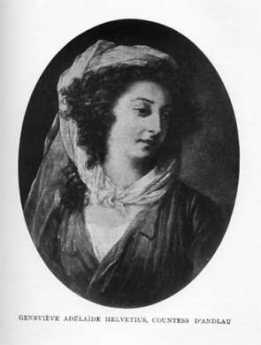 At least until he met Madame Helvetius, Benjamin Franklin displayed little interest in moral philosophy. His interest was in science, which was called natural philosophy in the Eighteenth Century. The American Philosophical Society is America's oldest and most prestigious society of scientific scholars. If investing is a science, the APS is good at that, too.
At least until he met Madame Helvetius, Benjamin Franklin displayed little interest in moral philosophy. His interest was in science, which was called natural philosophy in the Eighteenth Century. The American Philosophical Society is America's oldest and most prestigious society of scientific scholars. If investing is a science, the APS is good at that, too.
Philadelphia Mafia: The First Fifty Years
 For forty years after 1880, The Philadelphia Mafia was a small vigilante group secretly protecting Sicilian immigrants from marauding gangs of local Italians, which were definitely not the same thing. Prohibition transformed the whole nature of the underworld.
For forty years after 1880, The Philadelphia Mafia was a small vigilante group secretly protecting Sicilian immigrants from marauding gangs of local Italians, which were definitely not the same thing. Prohibition transformed the whole nature of the underworld.
Philadelphia Chromosome
 Just about everybody has 46 chromosomes in every cell in the body. Some people have more than that: they have the Philadelphia Chromosome.
Just about everybody has 46 chromosomes in every cell in the body. Some people have more than that: they have the Philadelphia Chromosome.
Pennsylvania Likes Private Property Private
 The King used to own the whole country. William Penn got us used to the idea that my property is mine, not the King's.
The King used to own the whole country. William Penn got us used to the idea that my property is mine, not the King's.
William Penn Conducts a Witchcraft Trial
 A public official has to obey the law, and conform to the traditions of his office, even if it is obvious that he thinks the whole thing is silly and unfair.
A public official has to obey the law, and conform to the traditions of his office, even if it is obvious that he thinks the whole thing is silly and unfair.
Parliamentary Procedure (1)
 Presiding over the Senate at Sixth and Chestnut, Vice President Thomas Jefferson observed pretty earthy behavior. So he wrote a book praising the rules of the British Parliament. Things must have been pretty bad if he, of all people, chose that model.
Presiding over the Senate at Sixth and Chestnut, Vice President Thomas Jefferson observed pretty earthy behavior. So he wrote a book praising the rules of the British Parliament. Things must have been pretty bad if he, of all people, chose that model.
Owen Roberts: A Switch in Time
 His old law firm devotes a reception room in his name, but not everyone is pleased with his writing the documents establishing the Barnes Foundation, or his capitulation to Franklin Roosevelt's threat to pack the US Supreme Court.
His old law firm devotes a reception room in his name, but not everyone is pleased with his writing the documents establishing the Barnes Foundation, or his capitulation to Franklin Roosevelt's threat to pack the US Supreme Court.
Old Blockley (P.G.H.)
 Every Victorian American city had a big medical almshouse, but Philadelphia had the best. The 1965 Amendments to the Social Security Act (Medicare and Medicaid) destroyed P.G. H. at the behest of local hospitals. They now regret it.
Every Victorian American city had a big medical almshouse, but Philadelphia had the best. The 1965 Amendments to the Social Security Act (Medicare and Medicaid) destroyed P.G. H. at the behest of local hospitals. They now regret it.
Nobel Prize: Michael Brown, MD
 A locally trained Philadelphia physician has won the Nobel Prize in Medicine for saving millions of lives with the "statin" drugs.
A locally trained Philadelphia physician has won the Nobel Prize in Medicine for saving millions of lives with the "statin" drugs.
Mutual Fund Governance
 Their main income depends on selling their mutual funds to corporation-controlled pension funds, that's why.
Their main income depends on selling their mutual funds to corporation-controlled pension funds, that's why.
Mrs. Meade's House
 The grateful city fathers wanted to give General Meade a mansion out of gratitude for winning at Gettysburg. The General refused, but he hadn't asked his wife.
The grateful city fathers wanted to give General Meade a mansion out of gratitude for winning at Gettysburg. The General refused, but he hadn't asked his wife.
Money Bags
 When Medicare started it was chaos, worse confounded.
When Medicare started it was chaos, worse confounded.
Mister Roberts
 Franklin Roosevelt threatened to keep adding Supreme Court justices until he got a majority to agree with him. And then one vote switched; a Switch in Time, which saved nine. Owen Roberts of Philadelphia did the switching.
Franklin Roosevelt threatened to keep adding Supreme Court justices until he got a majority to agree with him. And then one vote switched; a Switch in Time, which saved nine. Owen Roberts of Philadelphia did the switching.
Meschianza

Mennonites: The Pennsylvania Swiss
 Mennonite Pennsylvania Dutchmen actually came here from Switzerland. The book of their religious martyrs is more than a foot thick since they practice non-resistance, a belief significantly more pacifist than non-violence. Nevertheless, they prosper abundantly in Montgomery County.
Mennonite Pennsylvania Dutchmen actually came here from Switzerland. The book of their religious martyrs is more than a foot thick since they practice non-resistance, a belief significantly more pacifist than non-violence. Nevertheless, they prosper abundantly in Montgomery County.
Marcellus Shale Gas: Good Thing or Bad?
 There's a gold rush, in gas not gold, in Pennsylvania. What are the unintended consequences?
There's a gold rush, in gas not gold, in Pennsylvania. What are the unintended consequences?
Madame Butterfly (2)
 It is Puccini's genius to take this story of two nasty Americans destroying an honorable Japanese girl, and using the same story with the same words, make it into a romantic woman destroyed by a hopeless, helpless love affair. /br>
It is Puccini's genius to take this story of two nasty Americans destroying an honorable Japanese girl, and using the same story with the same words, make it into a romantic woman destroyed by a hopeless, helpless love affair. /br>
Lowering the Taxes on Corporations
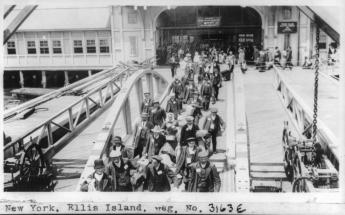 When Ireland lowered corporate taxes, inviting corporate immigration, and then precipitating an international financial crisis, it drew attention from others. Instead of warning them, it encouraged them to imitate Ireland.
When Ireland lowered corporate taxes, inviting corporate immigration, and then precipitating an international financial crisis, it drew attention from others. Instead of warning them, it encouraged them to imitate Ireland.
Look Out For That Ship!
 Tales of the Sea abound, even a hundred miles from the ocean.
Tales of the Sea abound, even a hundred miles from the ocean.
Loaves and Fishes
 Philabundance comes close to automating the feeding of homeless people, drawing on the techniques of the supermarket chains.
Philabundance comes close to automating the feeding of homeless people, drawing on the techniques of the supermarket chains.
Lewis Harlow van Dusen, Jr. (1910-2004)
 rode together on the Metroliner down to Washington, stayed at a club there, and after the hearing took the train back to Philadelphia.
rode together on the Metroliner down to Washington, stayed at a club there, and after the hearing took the train back to Philadelphia.
Lawn Tennis at the Cricket Club
 Lawn tennis is slightly older than tennis on clay courts, but it's harder to maintain grass than other surfaces, so it's less common.
Lawn tennis is slightly older than tennis on clay courts, but it's harder to maintain grass than other surfaces, so it's less common.
Laundered Money
 A real-life story of counterfeiting and the Secret Service -- and a little old lady doing her laundry.
A real-life story of counterfeiting and the Secret Service -- and a little old lady doing her laundry.
La Cosa Nostra Has an Apalachin Outing
 For many years it was widely denied by many, including J. Edgar Hoover, that there was such a thing as organized crime. And then, on November 14, 1957, the State Police stumbled on their national convention in Apalachin, NY.
For many years it was widely denied by many, including J. Edgar Hoover, that there was such a thing as organized crime. And then, on November 14, 1957, the State Police stumbled on their national convention in Apalachin, NY.
Killer Instinct
A former Marine and carrier pilot reflects  on the non-boastful risk-takers who drive themselves toward success, but not for riches, promotions, or power. Many other nations seem to exclude these people, and while many women go wild over them, feminists want to civilize them, at our peril.
on the non-boastful risk-takers who drive themselves toward success, but not for riches, promotions, or power. Many other nations seem to exclude these people, and while many women go wild over them, feminists want to civilize them, at our peril.
July 4, 1776: Patients in the Pennsylvania Hospital on Independence Day
Patients in Pennsylvania Hospital on Independence Day, 1776.
John Head, His Book of Account, 1718-1753
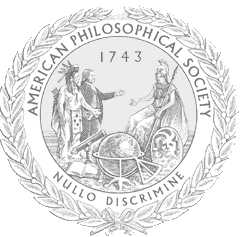 The equivalent of the rosetta stone for colonial commerce had been sitting on George Vaux's shelf for six generations.
The equivalent of the rosetta stone for colonial commerce had been sitting on George Vaux's shelf for six generations.
James A. Michener (1907-1997)
 < James A. Michener was a birthright Quaker from Doylestown, Pennsylvania, where he made his home when he wasn't traveling. He wrote 40 books, most notably "South Pacific", but lived a fairly simple smalltown life, meanwhile giving over $100 million to charity.
< James A. Michener was a birthright Quaker from Doylestown, Pennsylvania, where he made his home when he wasn't traveling. He wrote 40 books, most notably "South Pacific", but lived a fairly simple smalltown life, meanwhile giving over $100 million to charity.
Inazo Nitobe, Quaker Samurai
 One of the most revered leaders of modern Japan was a converted Samurai, married to a Philadelphia Quaker. His father was an advisor to the Emperor, a family of famous warriors.
One of the most revered leaders of modern Japan was a converted Samurai, married to a Philadelphia Quaker. His father was an advisor to the Emperor, a family of famous warriors.
House that Love Built: Ronald McDonald of Philadelphia
 The idea of a temporary residence for patients and their families near a children's hospital came from Dr. Audrey Evans of Philadelphia. Initial fundraising was driven by Fred Hill of the Philadelphia Eagles. In 25 years, over three hundred others in 26 nations have independently taken up the idea.
The idea of a temporary residence for patients and their families near a children's hospital came from Dr. Audrey Evans of Philadelphia. Initial fundraising was driven by Fred Hill of the Philadelphia Eagles. In 25 years, over three hundred others in 26 nations have independently taken up the idea.
Highway Beautification
When American tourists notice this, they are very smug.
Henry Cadbury Dresses Up for the King
 What should a plain-speech Quaker wear to the ceremony, if the King of Sweden is giving him the Nobel Prize?
What should a plain-speech Quaker wear to the ceremony, if the King of Sweden is giving him the Nobel Prize?
Health Savings Accounts
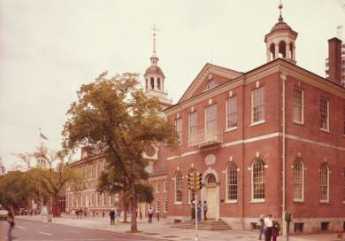 In late 2003, Congress passed and the President signed, legislation enabling tax exemptions for contributions to Medical Savings Accounts. This monumental reform was included in a law which created a number of Medicare prescription drugs benefits which received more attention in the press. Such accounts were renamed Health Savings Accounts, which was the original terminology in 1980 when John McClaughry of Vermont and George Ross Fisher of Pennsylvania, shortly joined by Michael Smith of Louisiana, first introduced the concept.
In late 2003, Congress passed and the President signed, legislation enabling tax exemptions for contributions to Medical Savings Accounts. This monumental reform was included in a law which created a number of Medicare prescription drugs benefits which received more attention in the press. Such accounts were renamed Health Savings Accounts, which was the original terminology in 1980 when John McClaughry of Vermont and George Ross Fisher of Pennsylvania, shortly joined by Michael Smith of Louisiana, first introduced the concept.
Gross National Happiness In Bhutan
 In Bhutan, Buddhists rule, and the government responds to modernization with GNH or Gross Domestic Happiness. Pause a moment, ye strivers and cravers, and think about this. Just because these guys wear funny clothes, doesn't mean they are from Hicksville.
In Bhutan, Buddhists rule, and the government responds to modernization with GNH or Gross Domestic Happiness. Pause a moment, ye strivers and cravers, and think about this. Just because these guys wear funny clothes, doesn't mean they are from Hicksville.
Goat Head Merchant
 A real-life story of bootleggers in a hospital.
A real-life story of bootleggers in a hospital.
Getaway
 The Delaware Hospital in Wilmington once had a real shoot-out.
The Delaware Hospital in Wilmington once had a real shoot-out.
George Washington's View of the British Army
 Washington's escape from Braddock's defeat may help us understand his future low opinion of the British Army, and possibly suggests a reason for his hating them.
Washington's escape from Braddock's defeat may help us understand his future low opinion of the British Army, and possibly suggests a reason for his hating them.
Frida Kahlo
 The crippled, suffering wife of Diego Rivera was herself a painter, often of surrealistic portraits of herself. She didn't want to be liked, she wanted to be noticed.
The crippled, suffering wife of Diego Rivera was herself a painter, often of surrealistic portraits of herself. She didn't want to be liked, she wanted to be noticed.
Funny Toes: A Physician Viewpoint
 Most people either ignore funny toes, or hide them in their shoes. Here are one doctor's idle thoughts about them.
Most people either ignore funny toes, or hide them in their shoes. Here are one doctor's idle thoughts about them.
Frederick Mason Jones,Jr. 1919-2009
 The French horn of the Philadelphia Orchestra, played by the acknowledged premier artist in the history of brass instruments, falls silent.
The French horn of the Philadelphia Orchestra, played by the acknowledged premier artist in the history of brass instruments, falls silent.
The Supreme Court Arrives, A Little Late
 The third branch of government took a generation to establish its place, and John Marshall made it happen. If you love the Supreme Court, you probably hate Thomas Jefferson.
The third branch of government took a generation to establish its place, and John Marshall made it happen. If you love the Supreme Court, you probably hate Thomas Jefferson.
Morris Upended by a Nobody
 Adjusting to winning the Revolutionary War was almost as painful as losing it would have been. Especially for Robert Morris.
Adjusting to winning the Revolutionary War was almost as painful as losing it would have been. Especially for Robert Morris.
State in Schuylkill Fishing Club
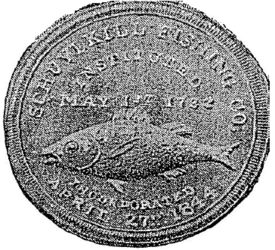 Unless you listen to some quibbles from White's in London, the Schuylkill Fishing Club of the State in Schuylkill is the oldest organized men's club in the world. And even if that exception is admitted, it's the oldest men's club in America. It's no secret, but it's very private.
Unless you listen to some quibbles from White's in London, the Schuylkill Fishing Club of the State in Schuylkill is the oldest organized men's club in the world. And even if that exception is admitted, it's the oldest men's club in America. It's no secret, but it's very private.
Political Parties, Absent and Unmentionable
 Our Constitution is much praised for exquisitely balancing power between the three branches of government. It would even be an achievement to require two centuries to find a way to unbalance them.
Our Constitution is much praised for exquisitely balancing power between the three branches of government. It would even be an achievement to require two centuries to find a way to unbalance them.
Void for Vagueness
 Ignorance of the law is no excuse, but what about a law that is deliberately vague?
Ignorance of the law is no excuse, but what about a law that is deliberately vague?
Rearranging Mickles, Makes Muckles
 Many a mickle, makes a muckle. Re-arranging the mickles makes better buckles.
Many a mickle, makes a muckle. Re-arranging the mickles makes better buckles.
More, or Fewer, Raisins in the Pudding
 The primary sources of history are supposed to be factual. Tertiary history is mostly an interpretation of many primary bits.
The primary sources of history are supposed to be factual. Tertiary history is mostly an interpretation of many primary bits.
Prisoners in the Stone
 History emerges from a welter of facts, with the irrelevant and inconvenient material selectively removed.
History emerges from a welter of facts, with the irrelevant and inconvenient material selectively removed.
Dithering History
 It's better to start writing history with what you know for certain. And it's usually better to stop there, too.
It's better to start writing history with what you know for certain. And it's usually better to stop there, too.
Our President Shows His Stuff
 David Richards goes all out.
David Richards goes all out.